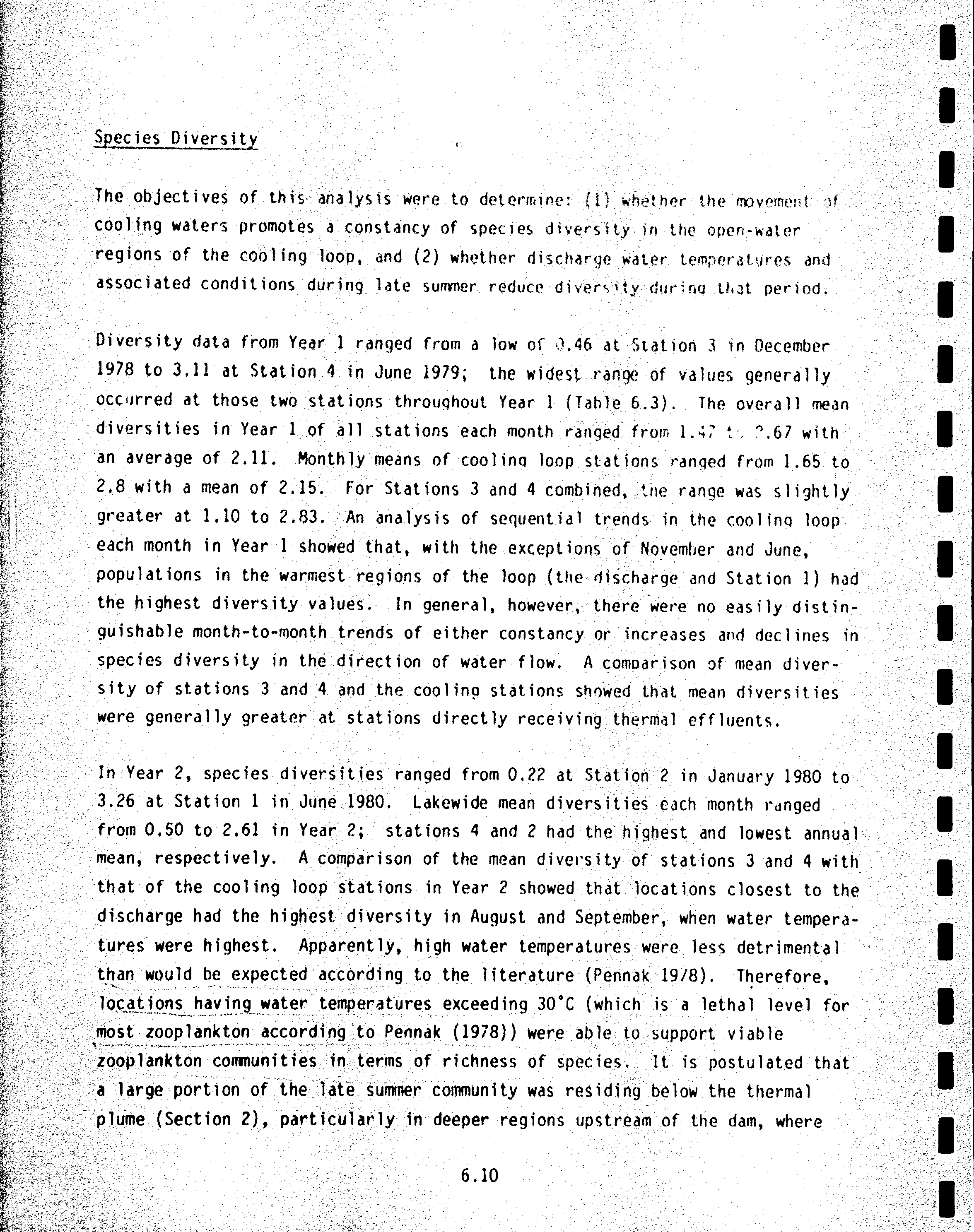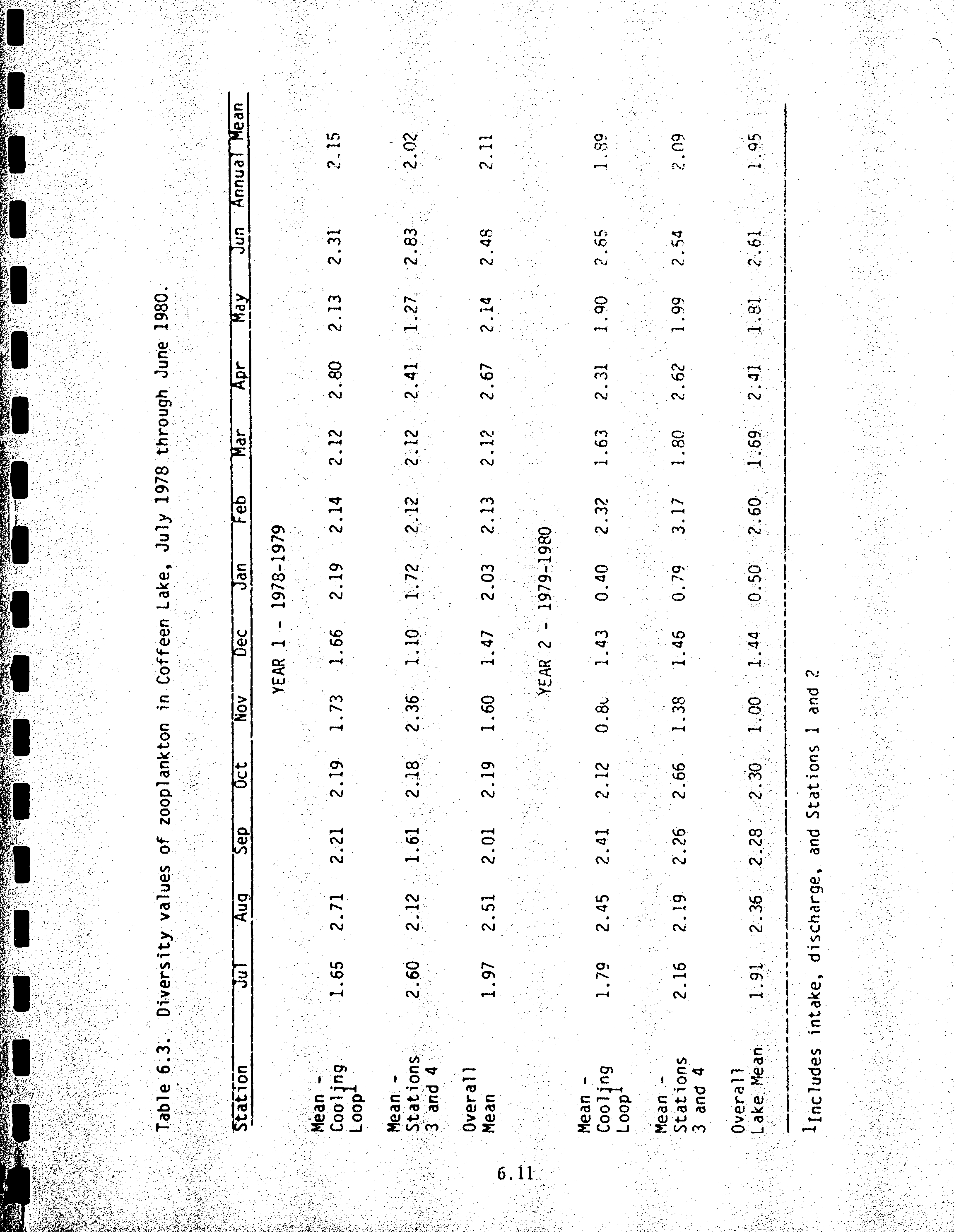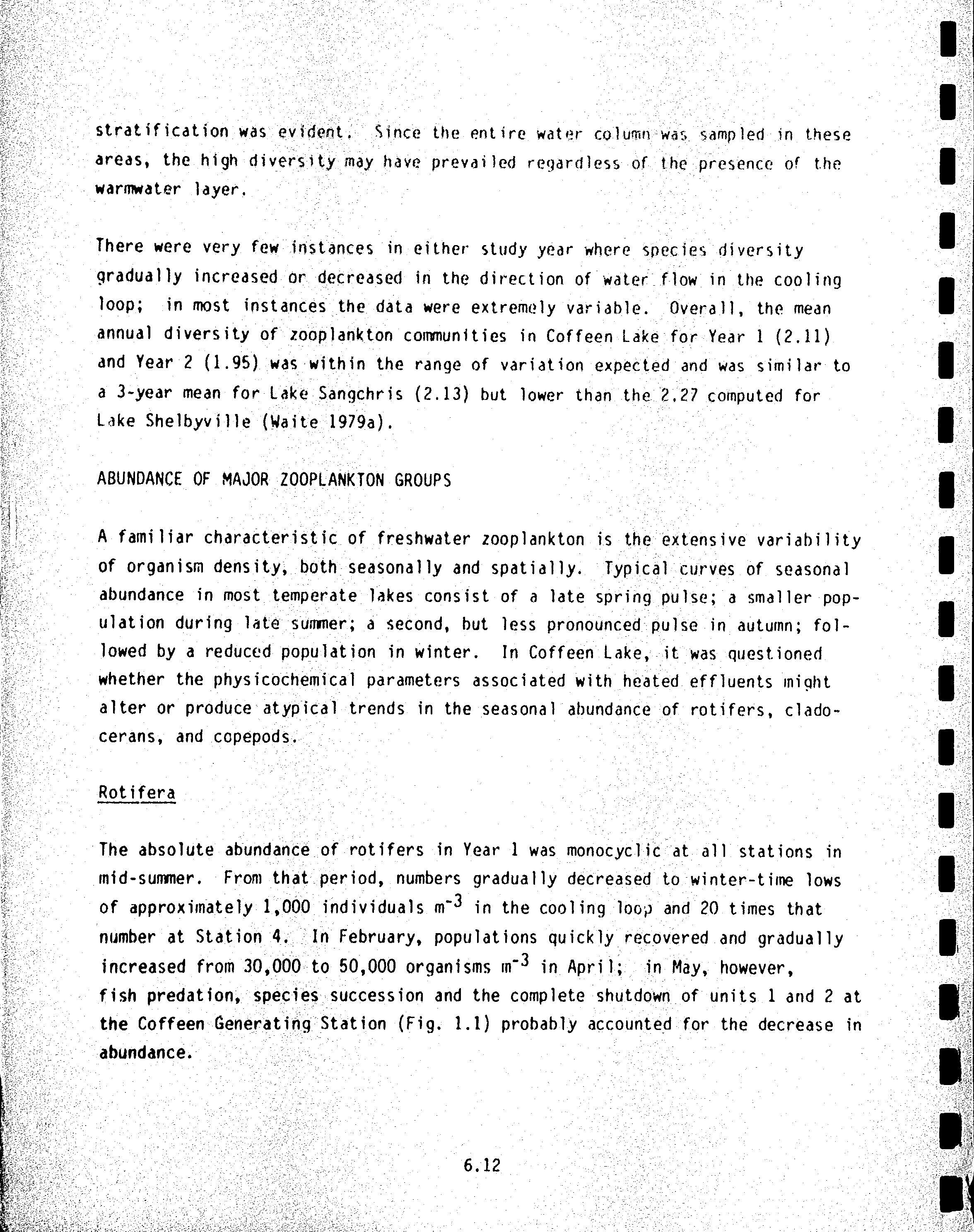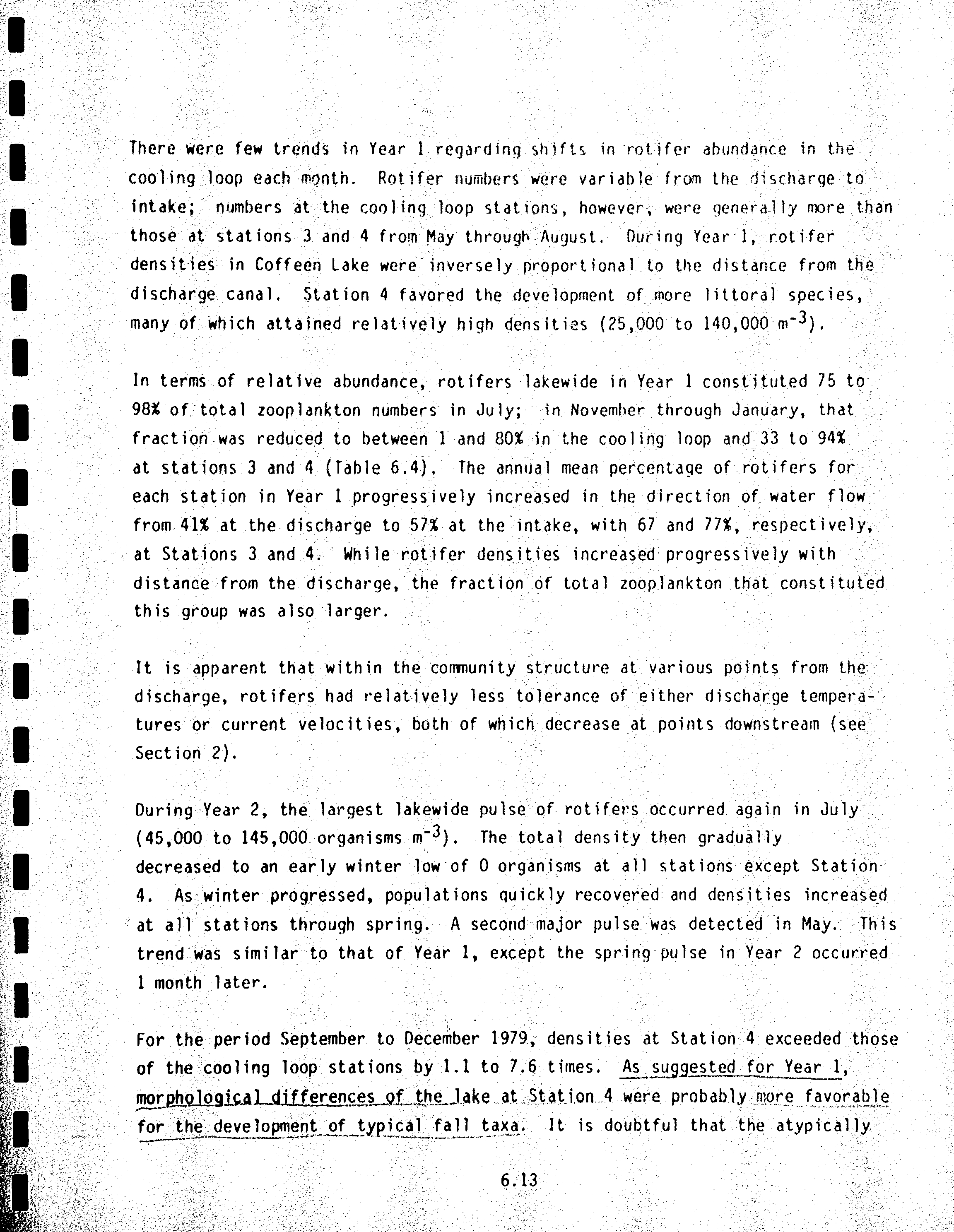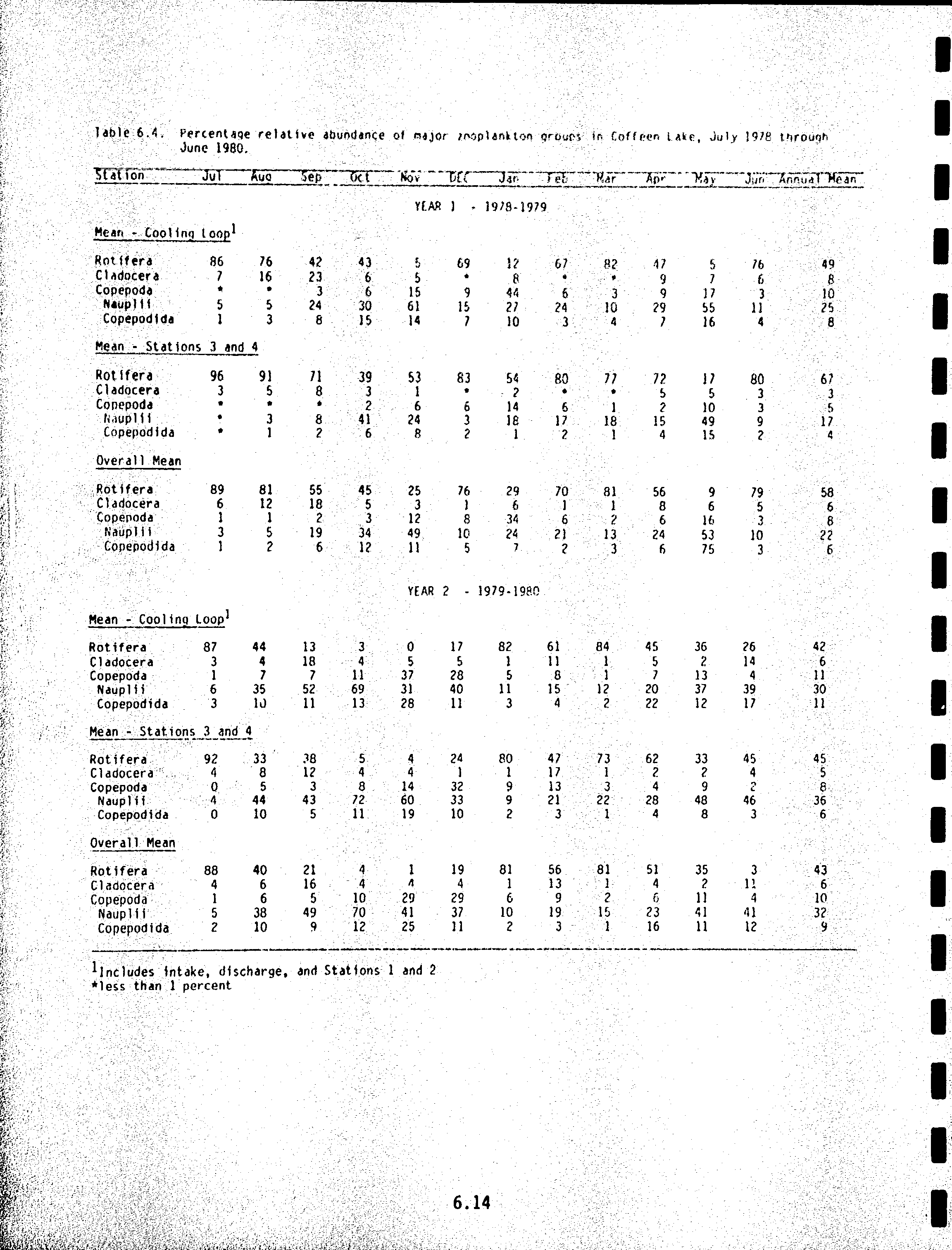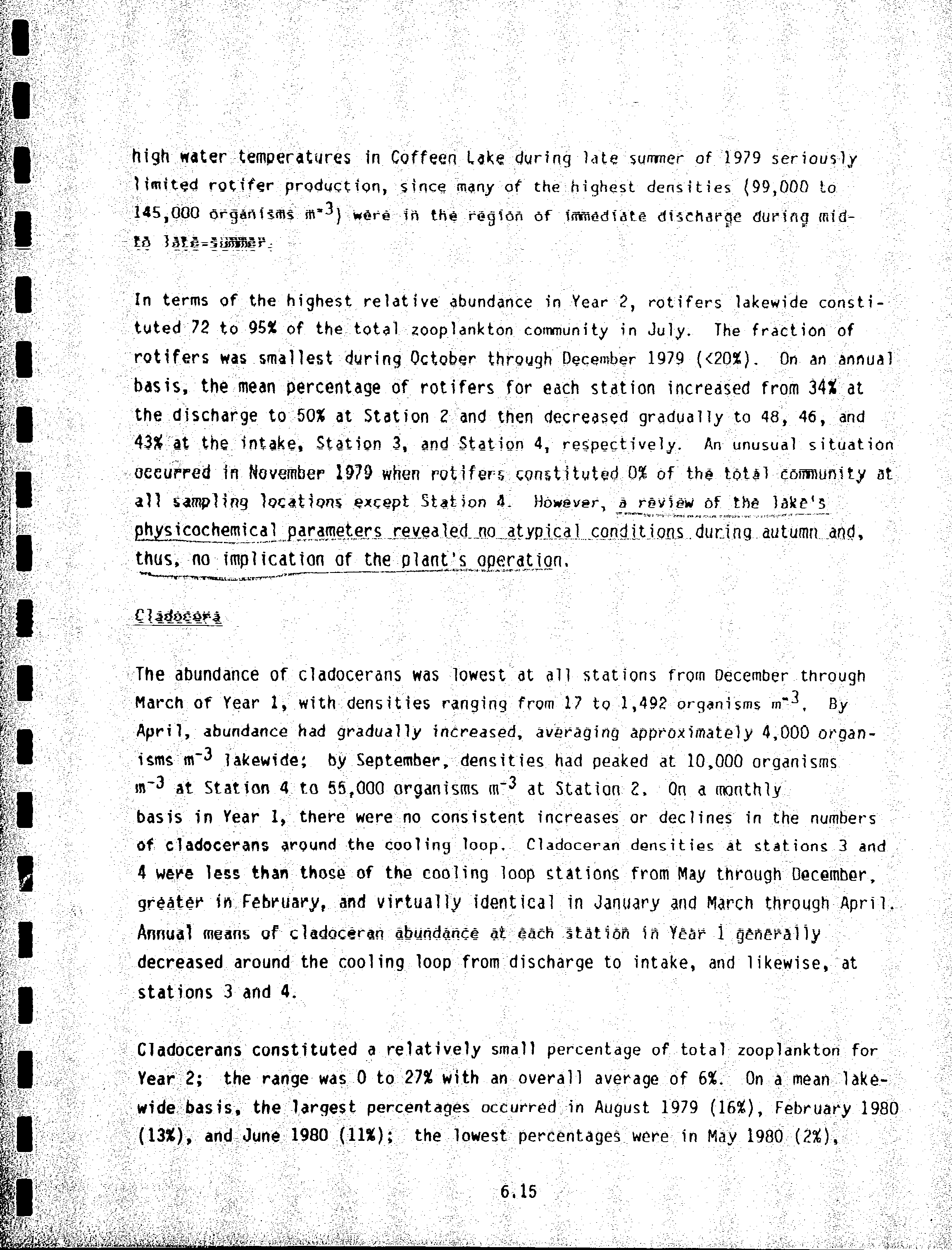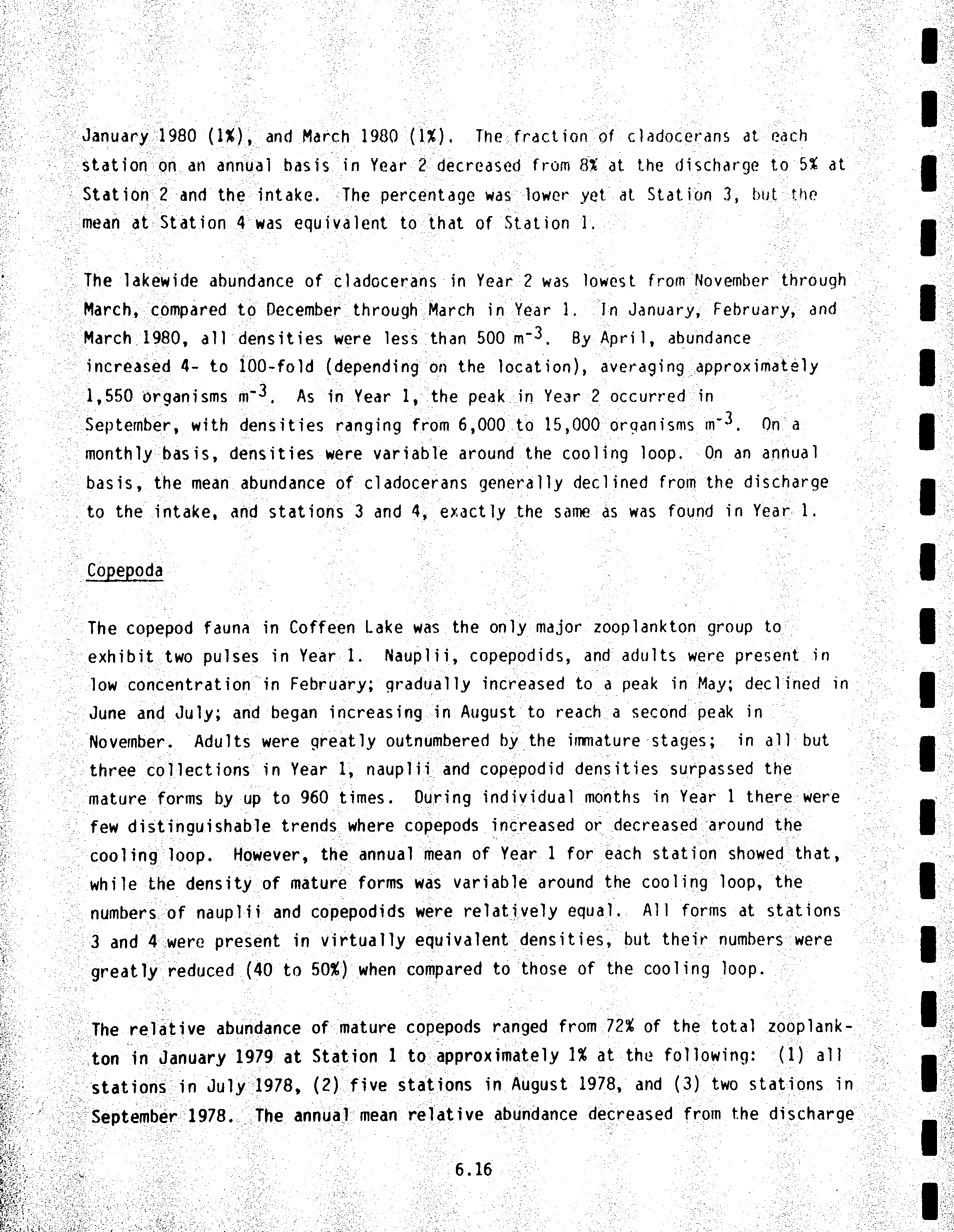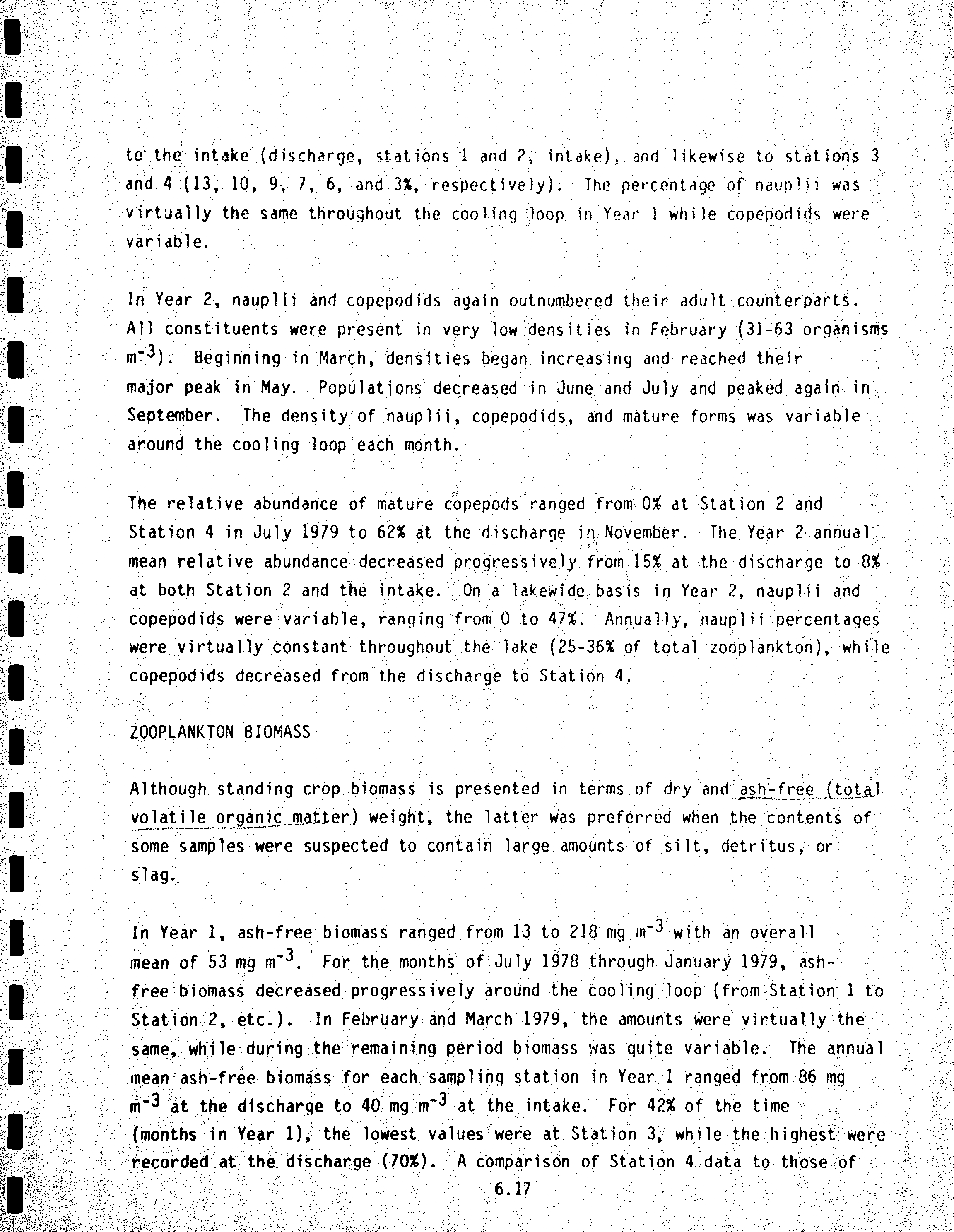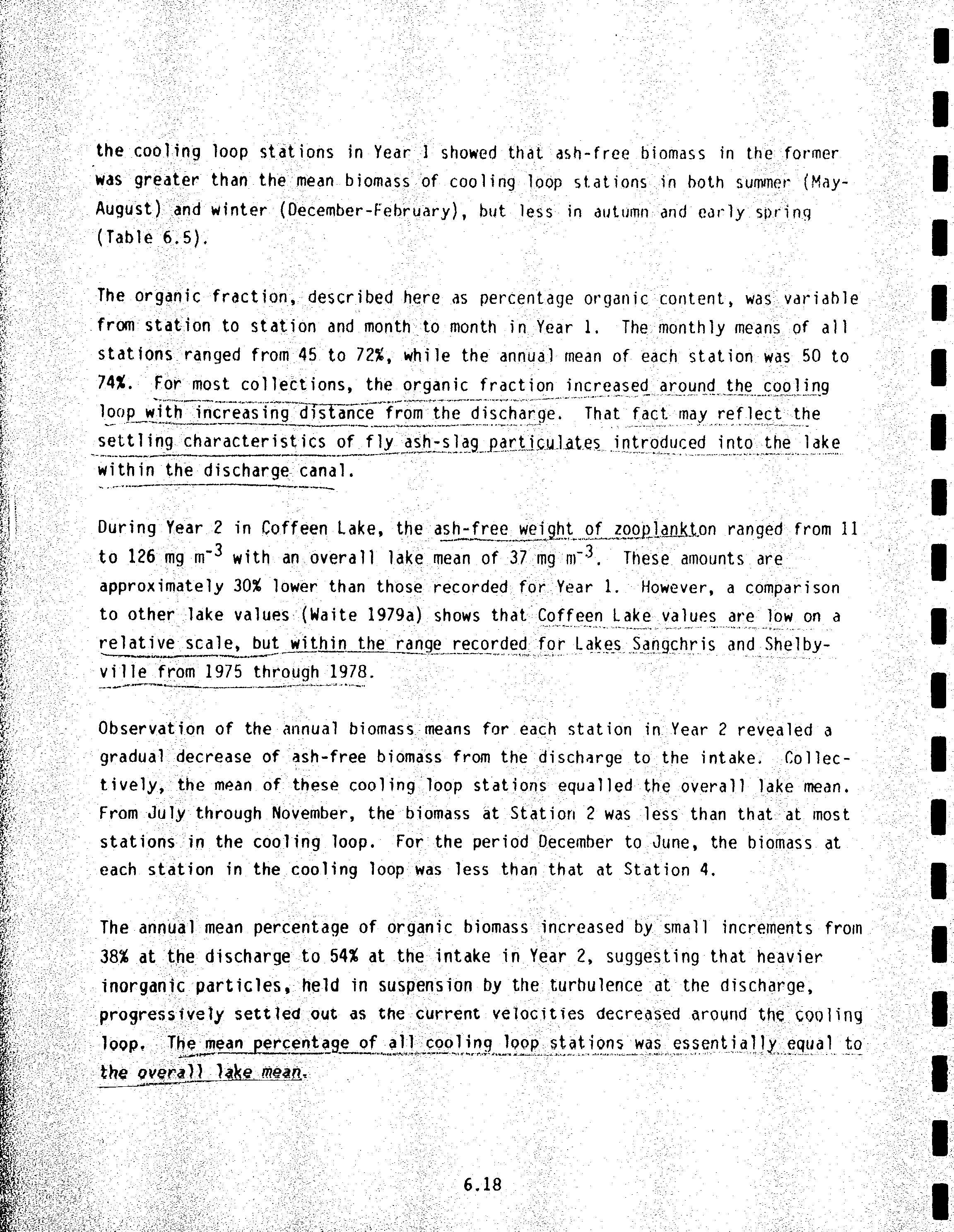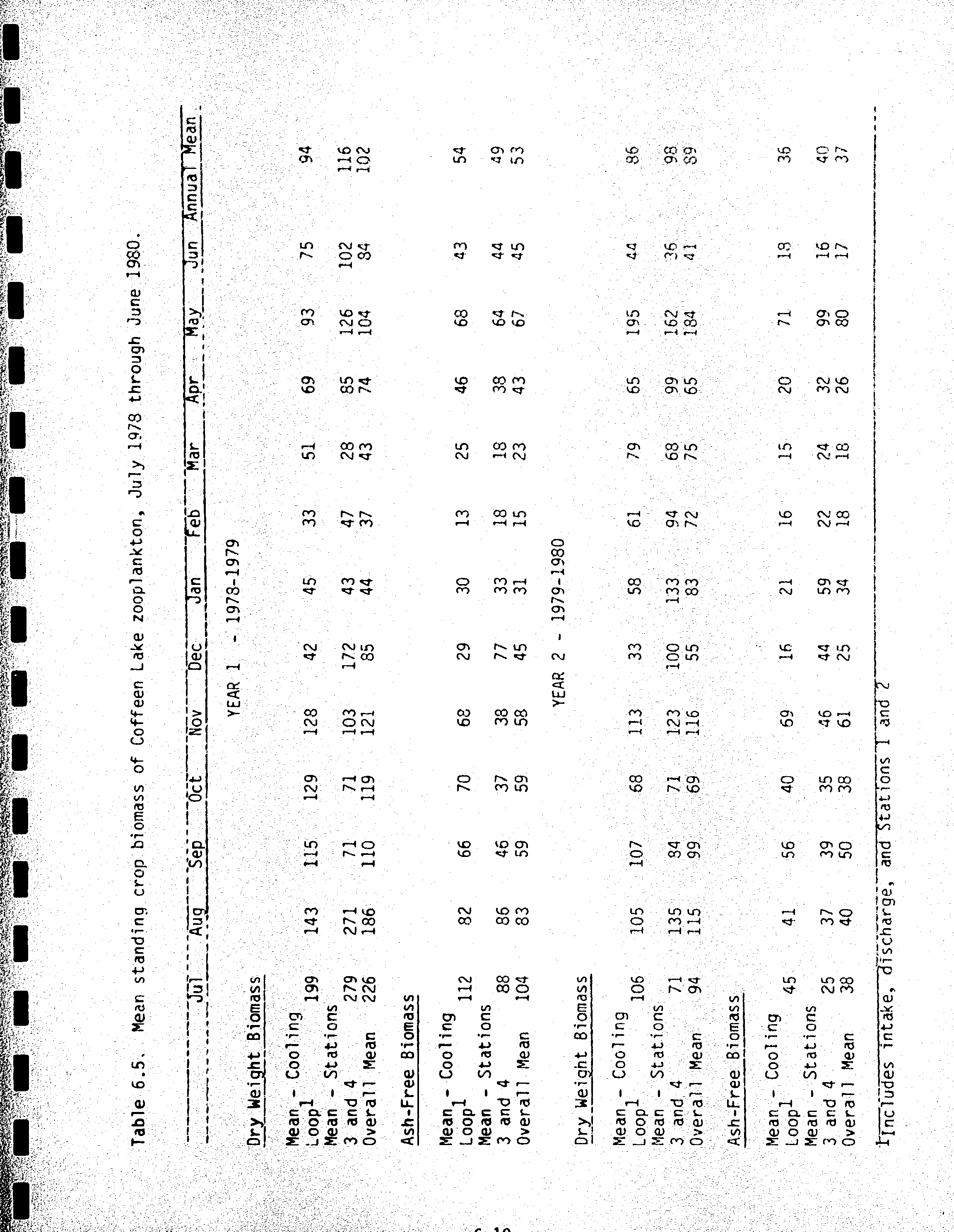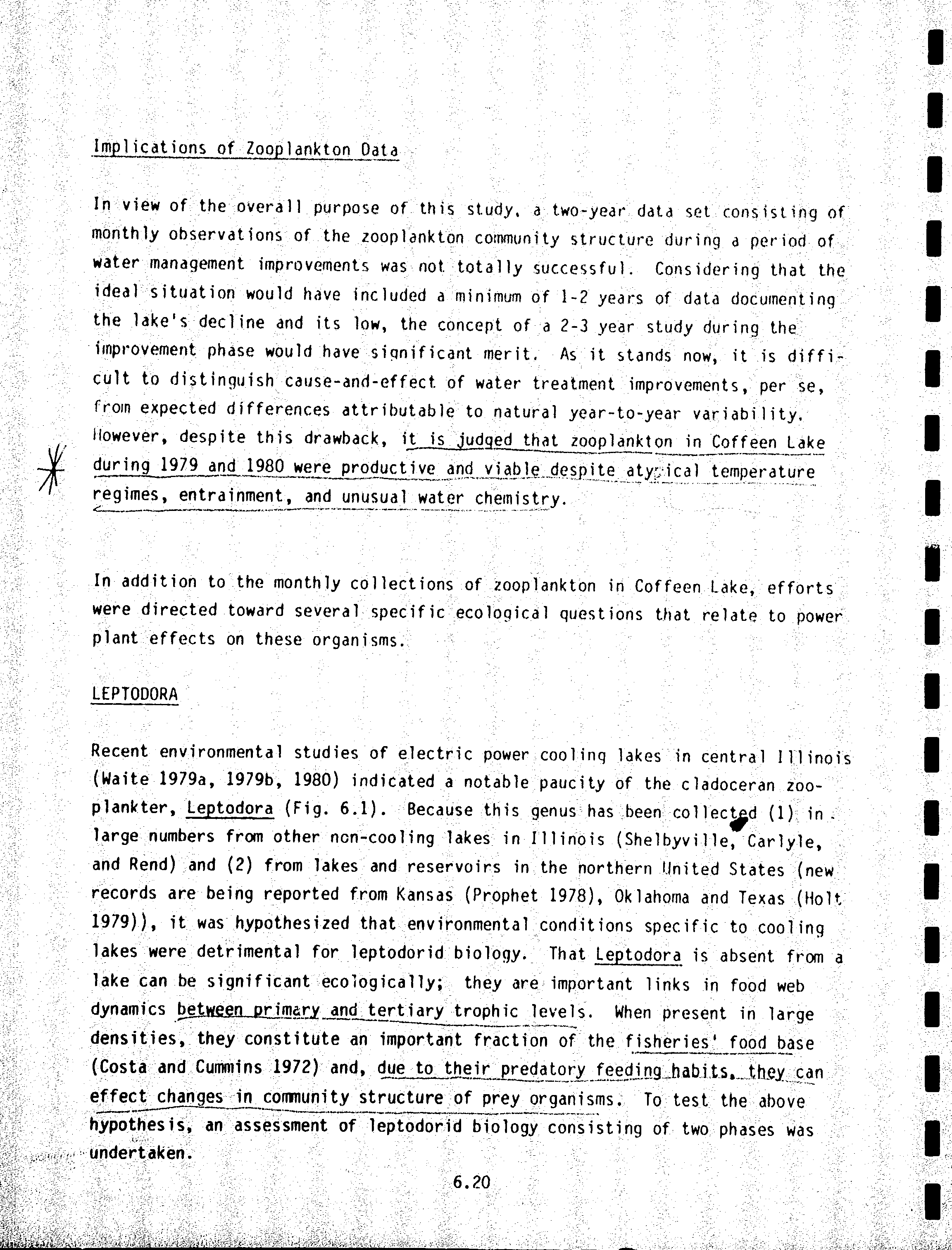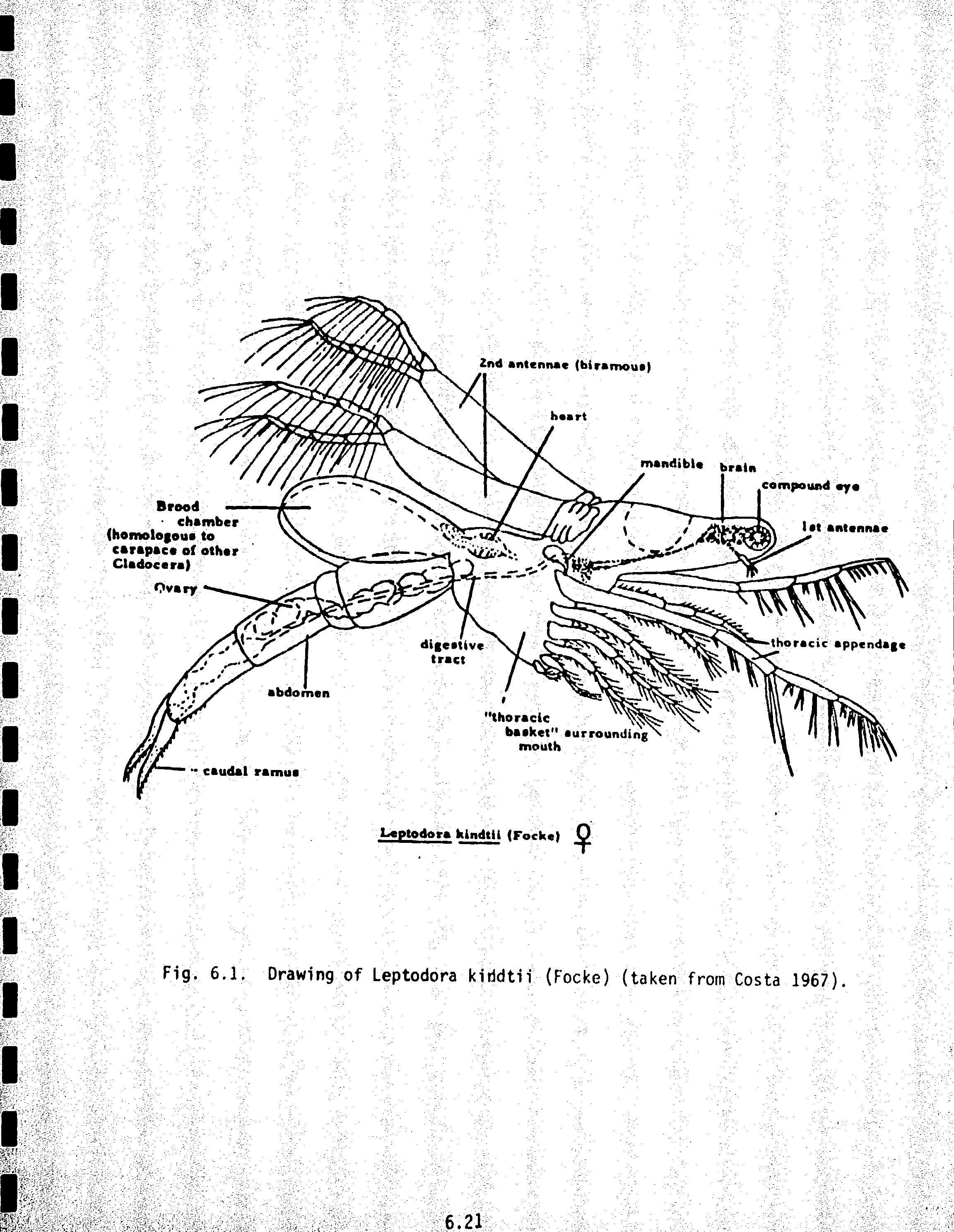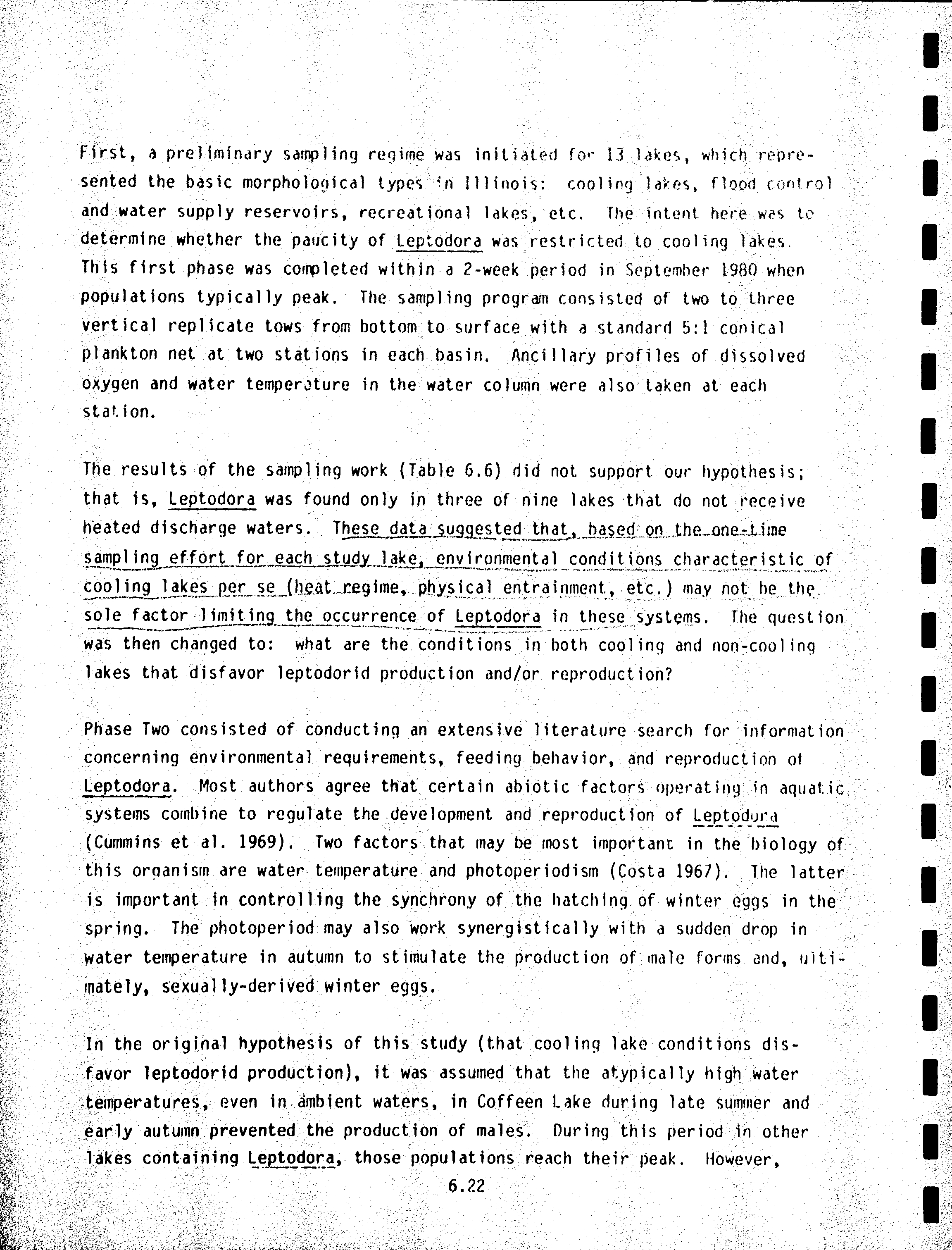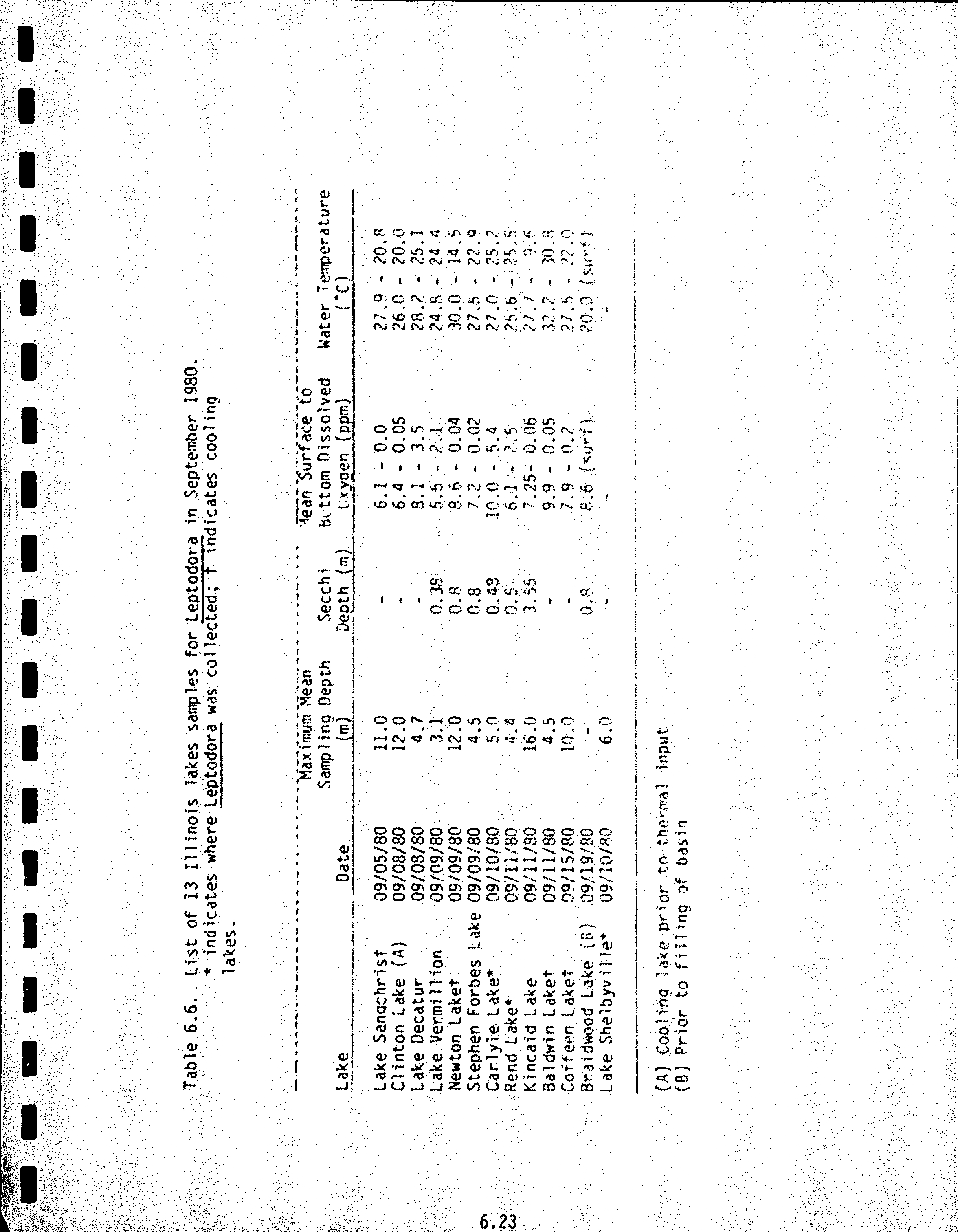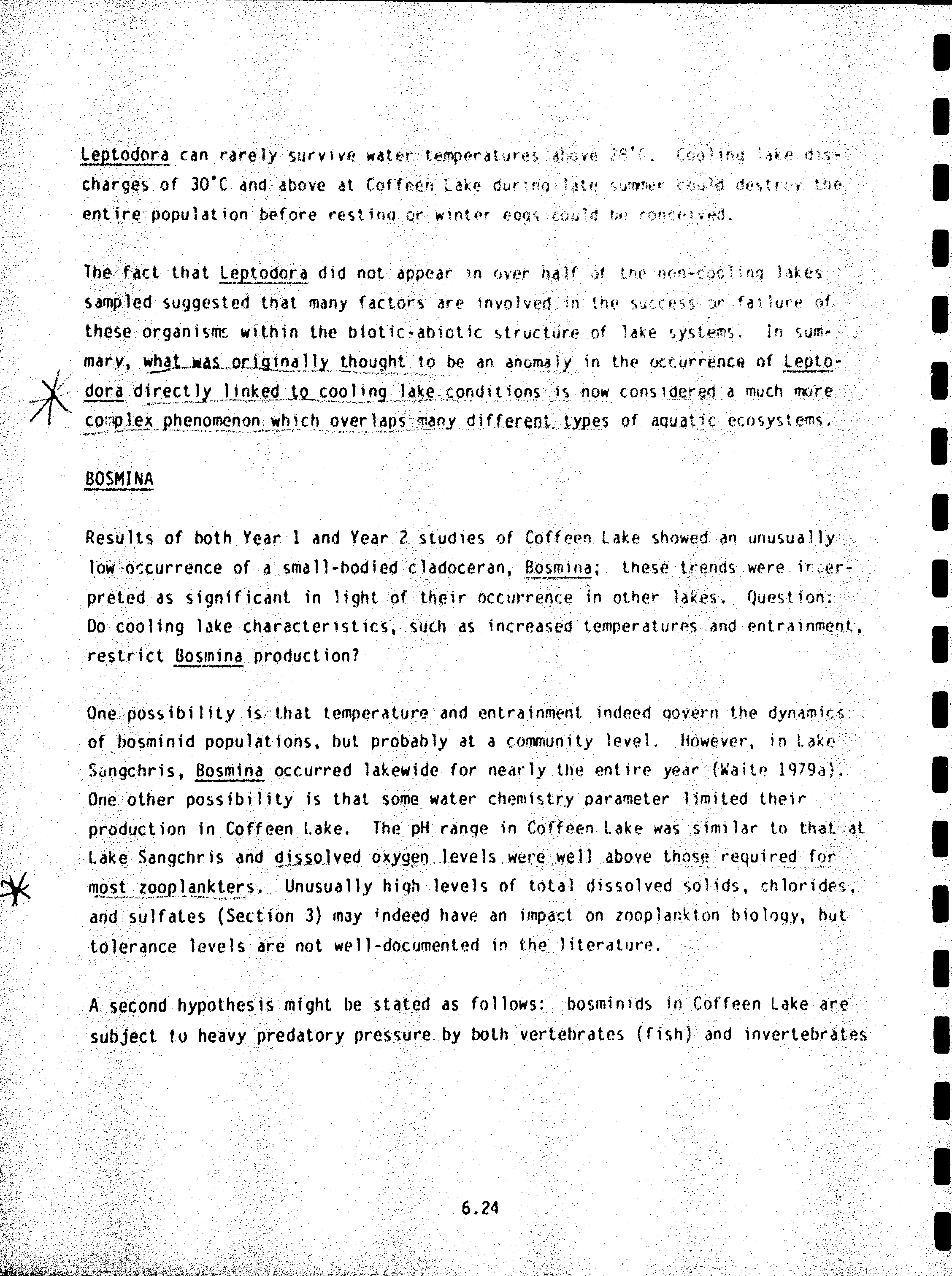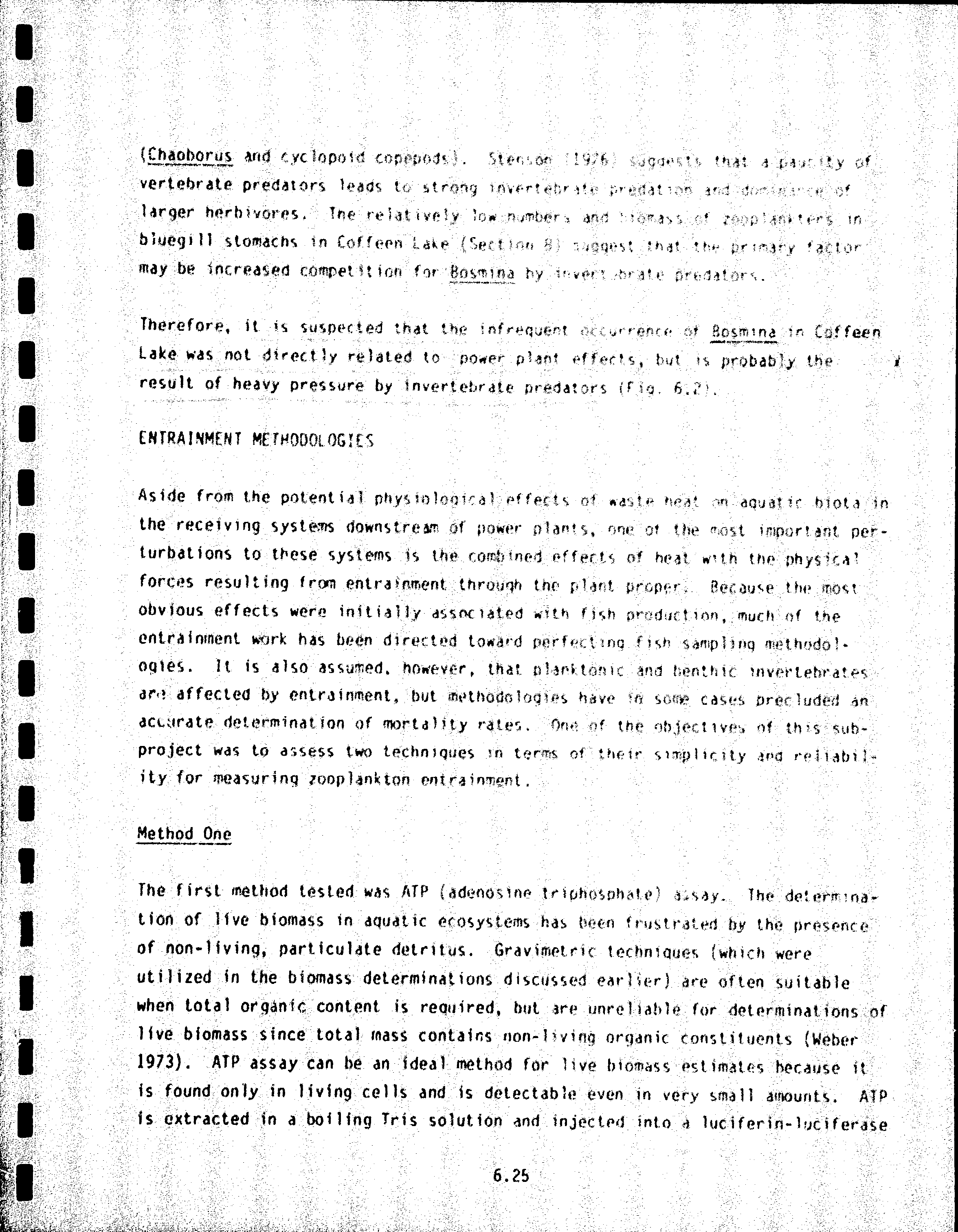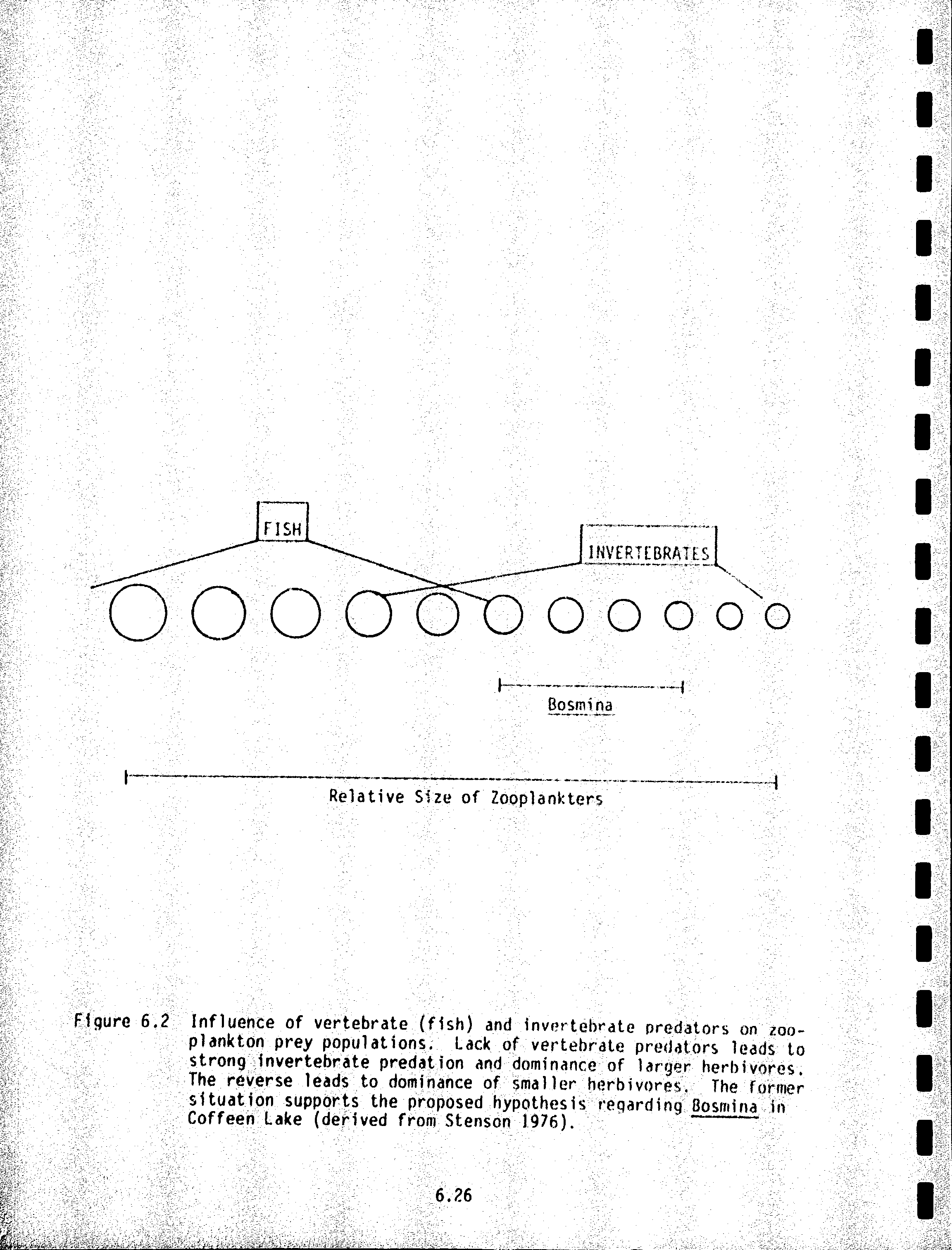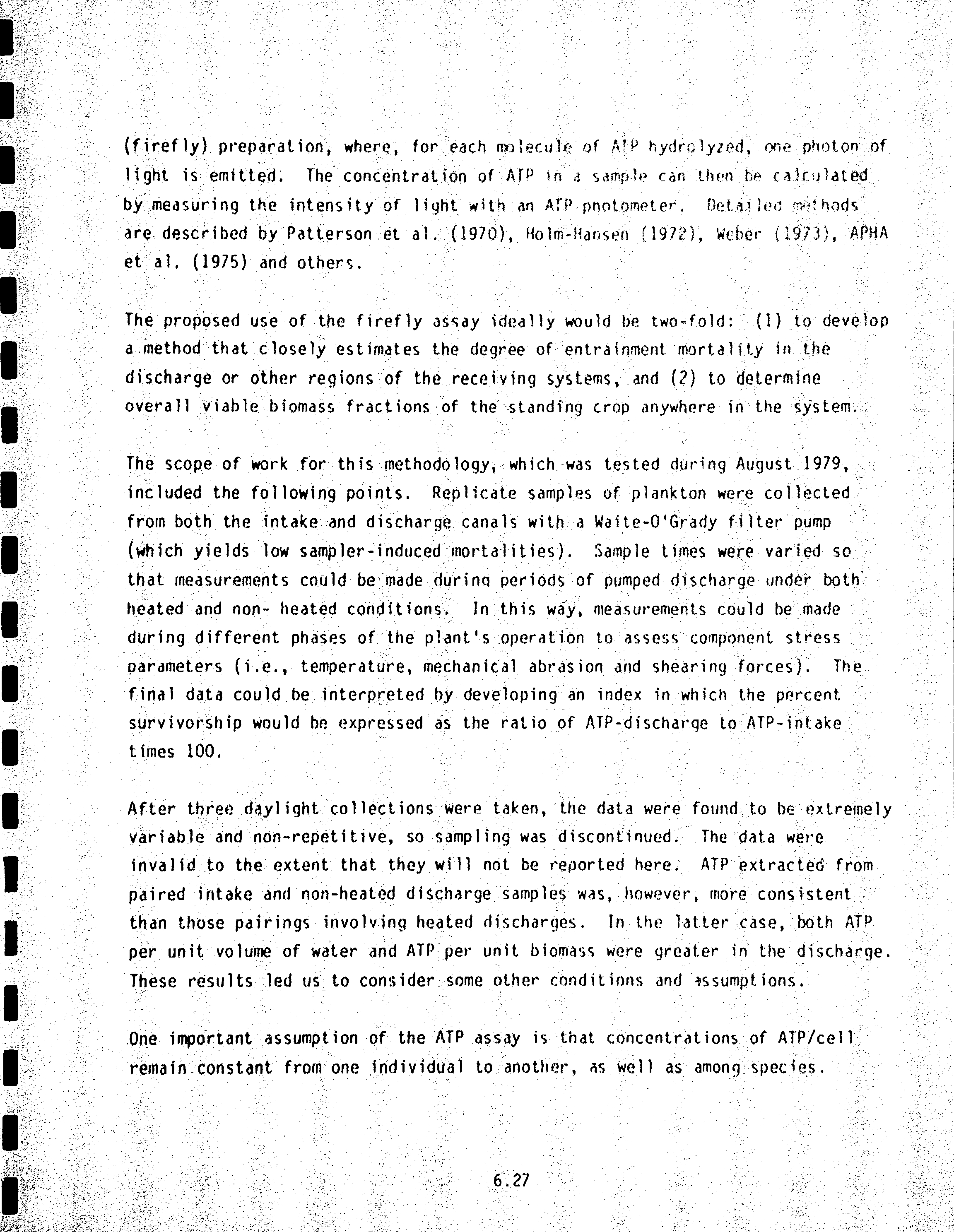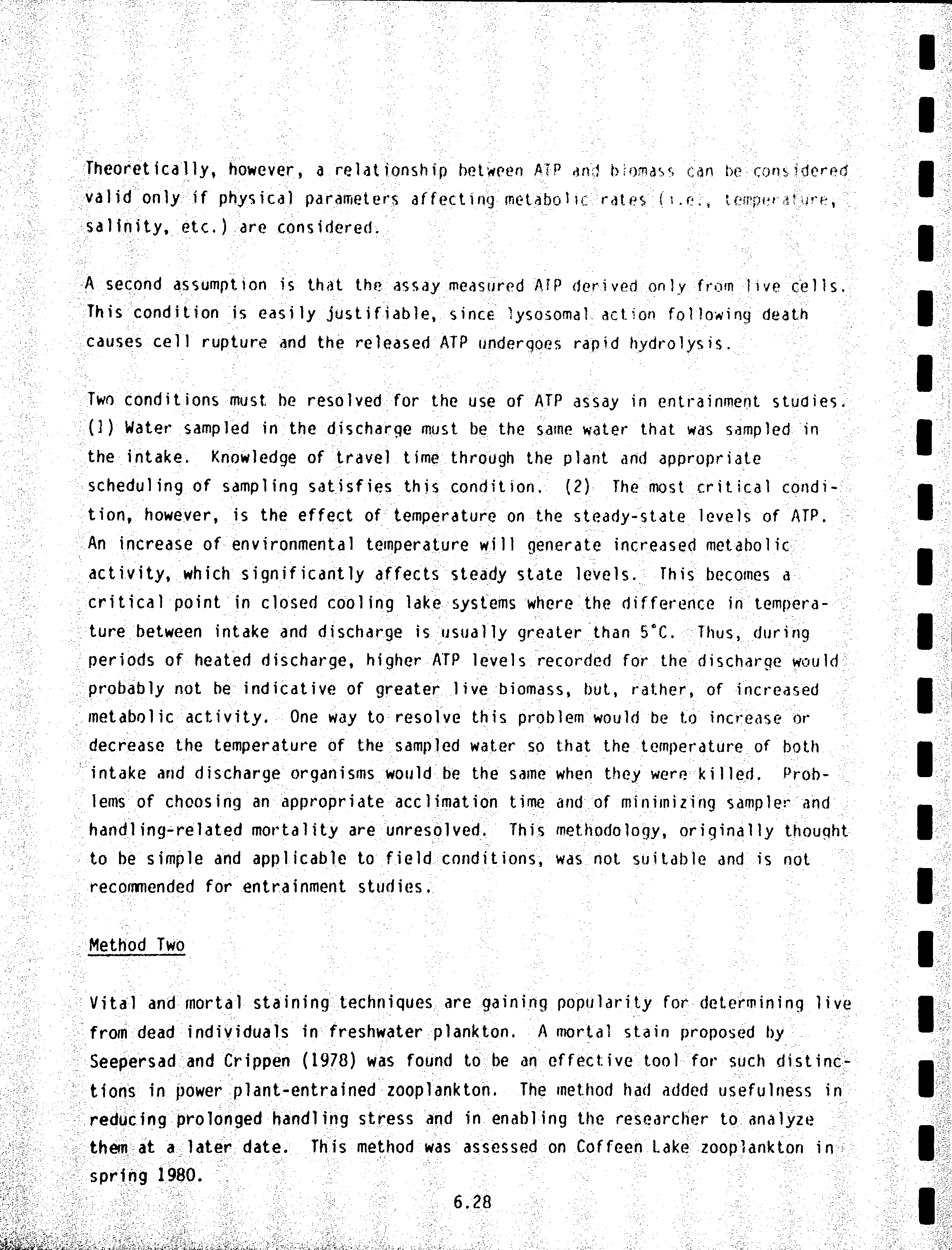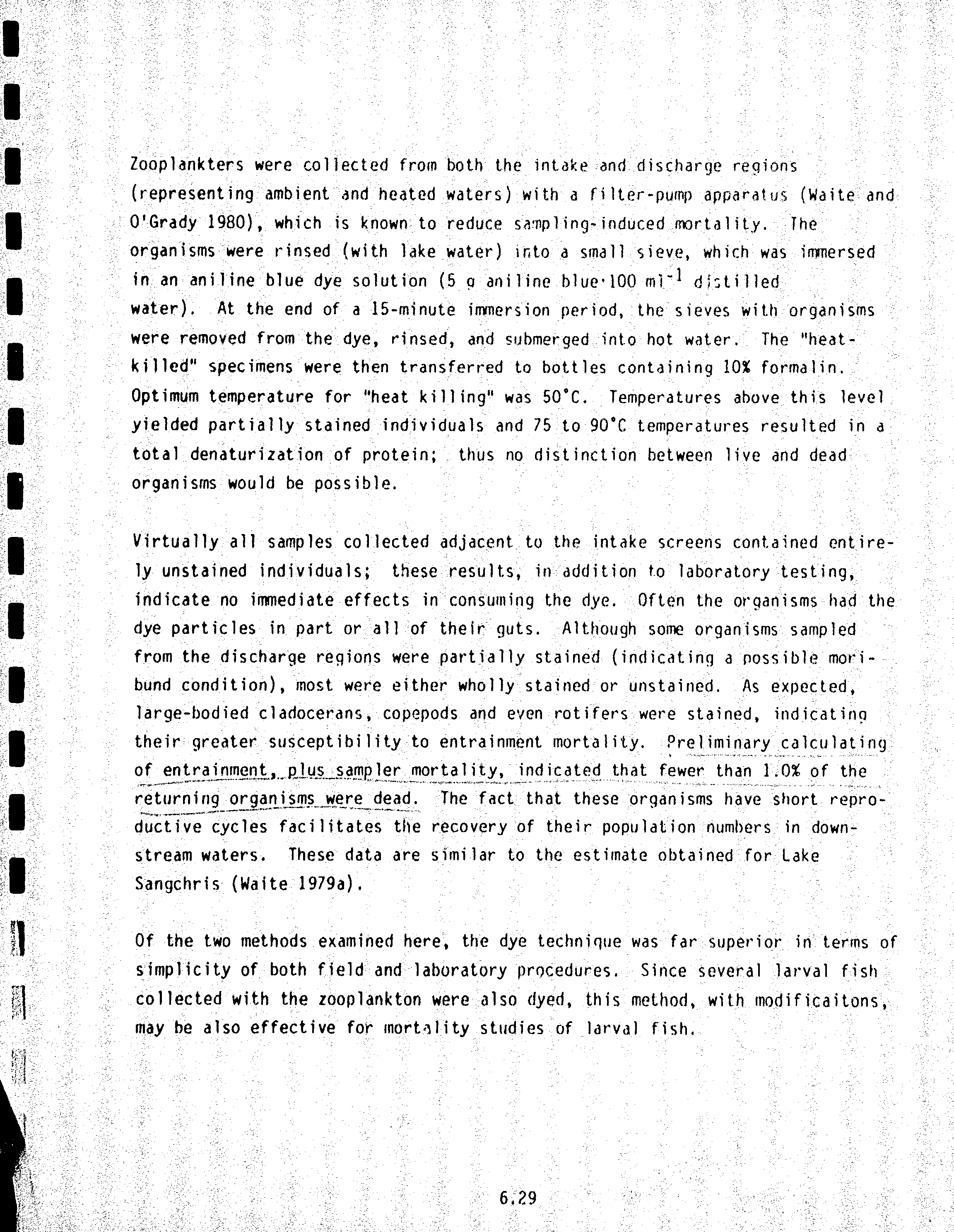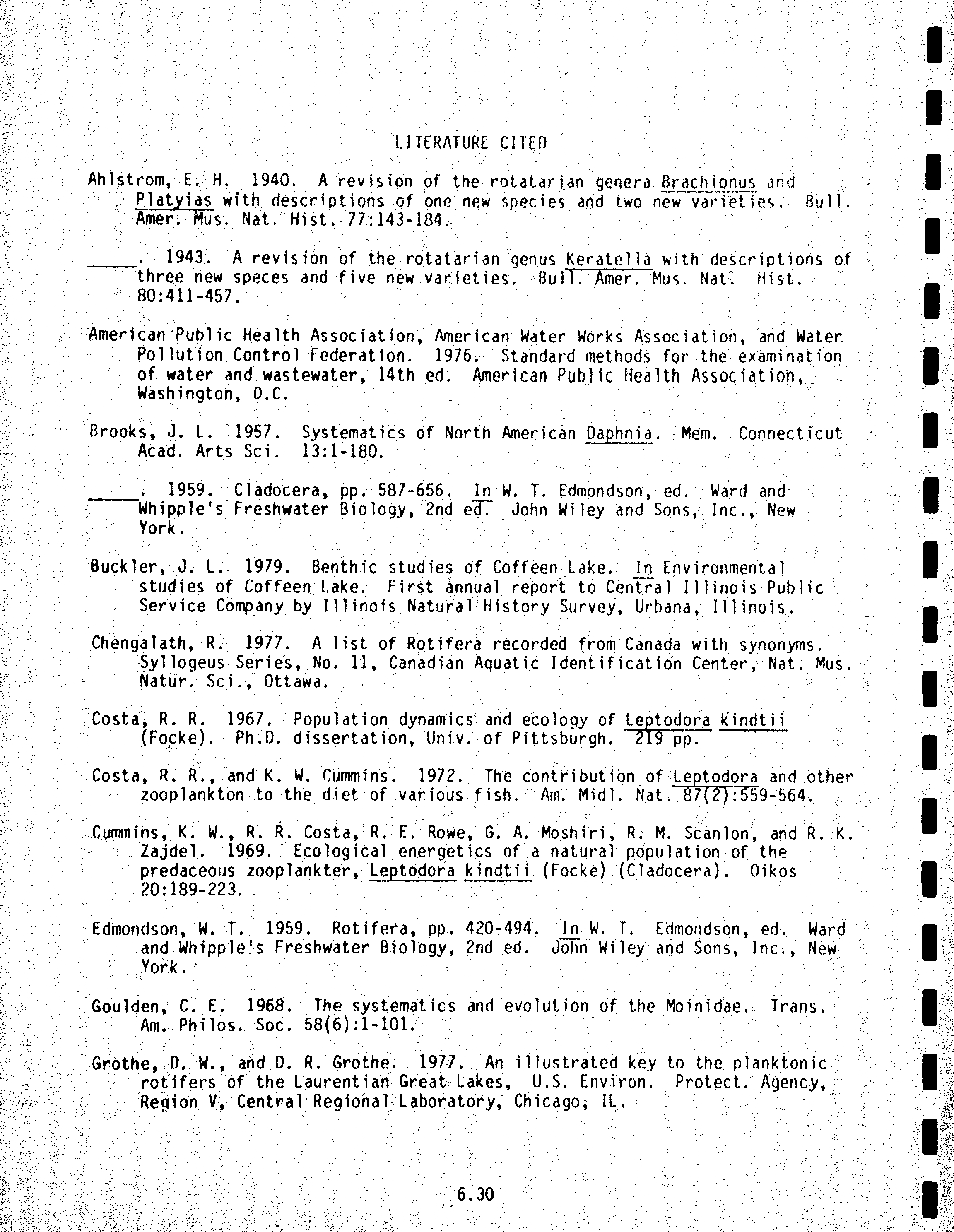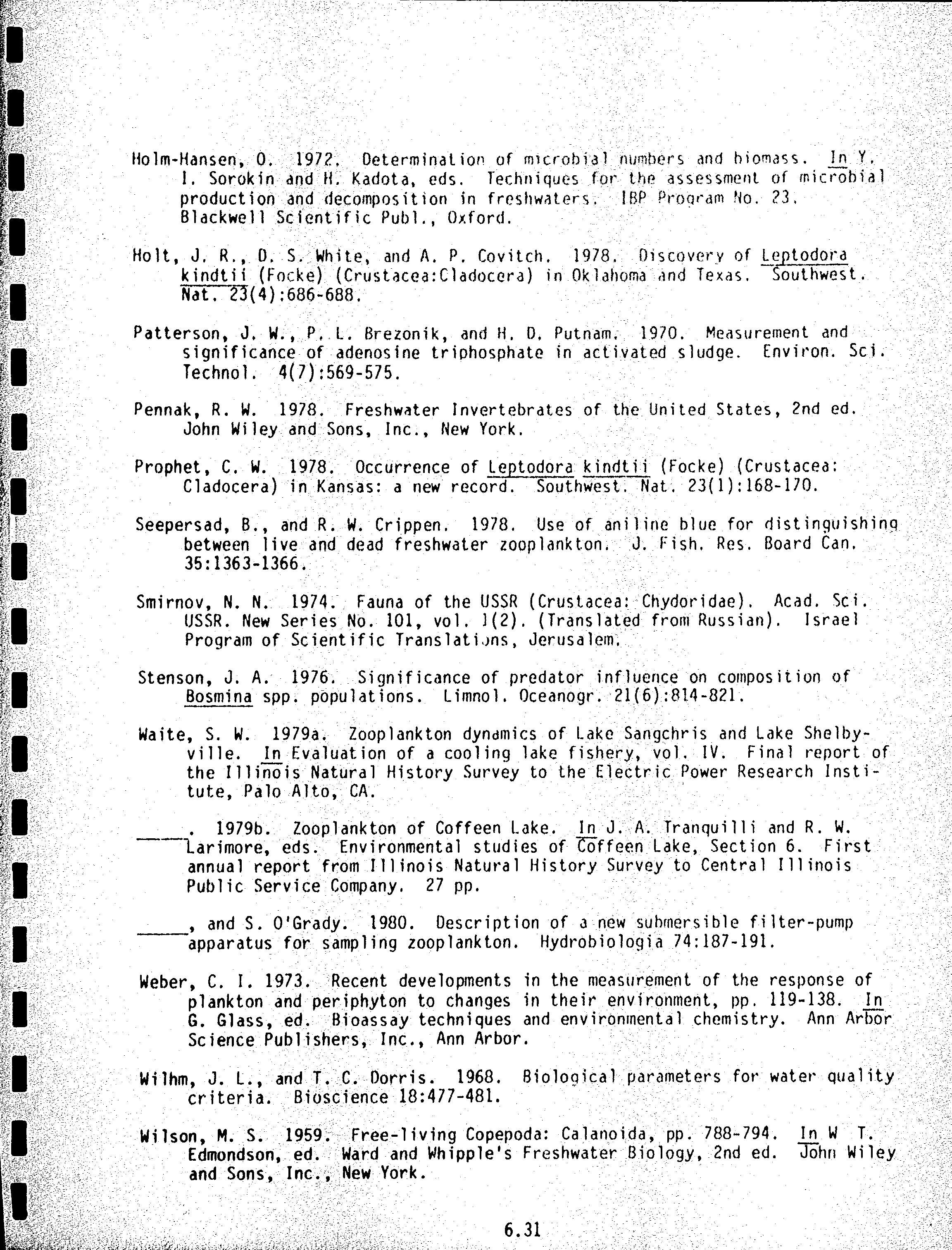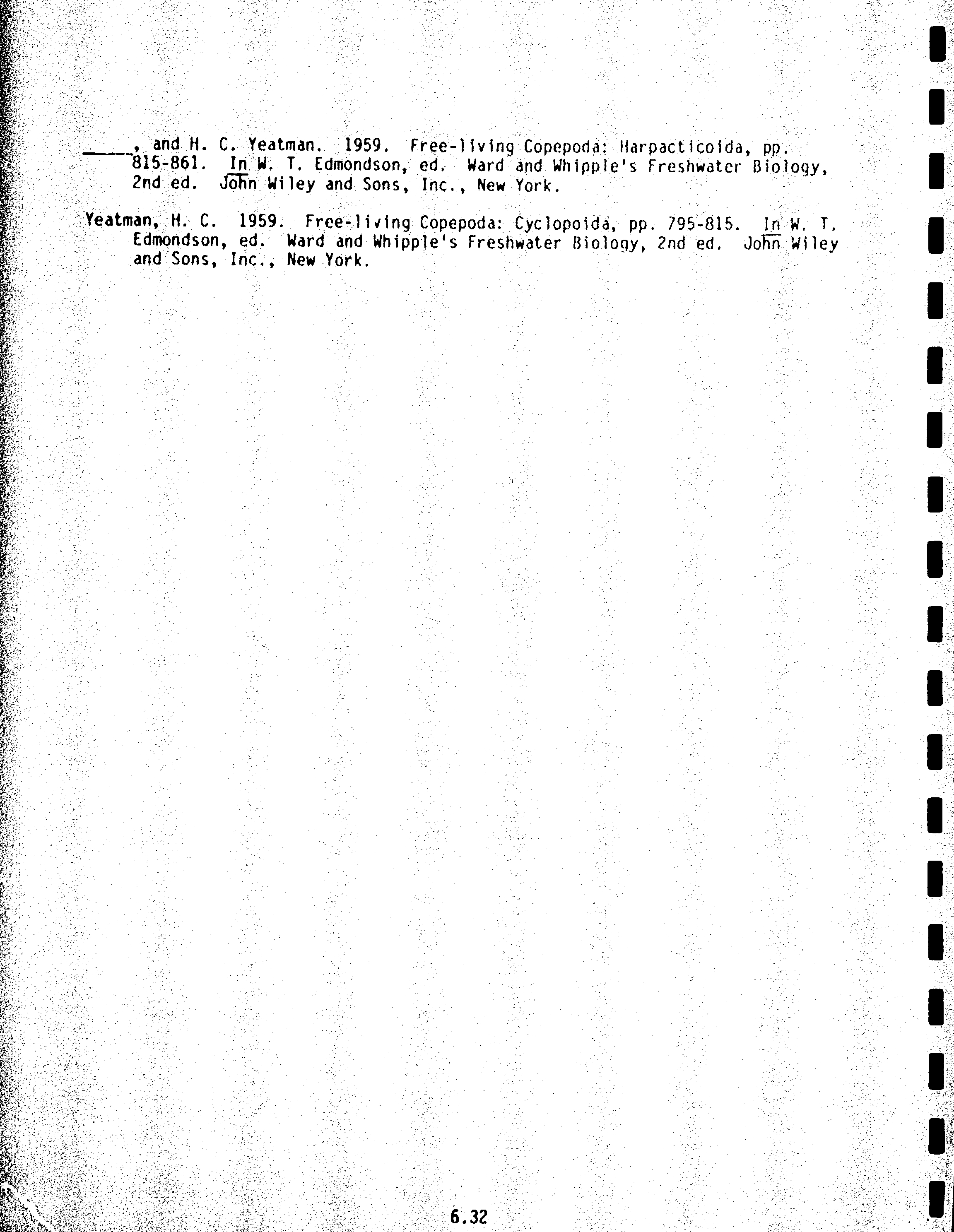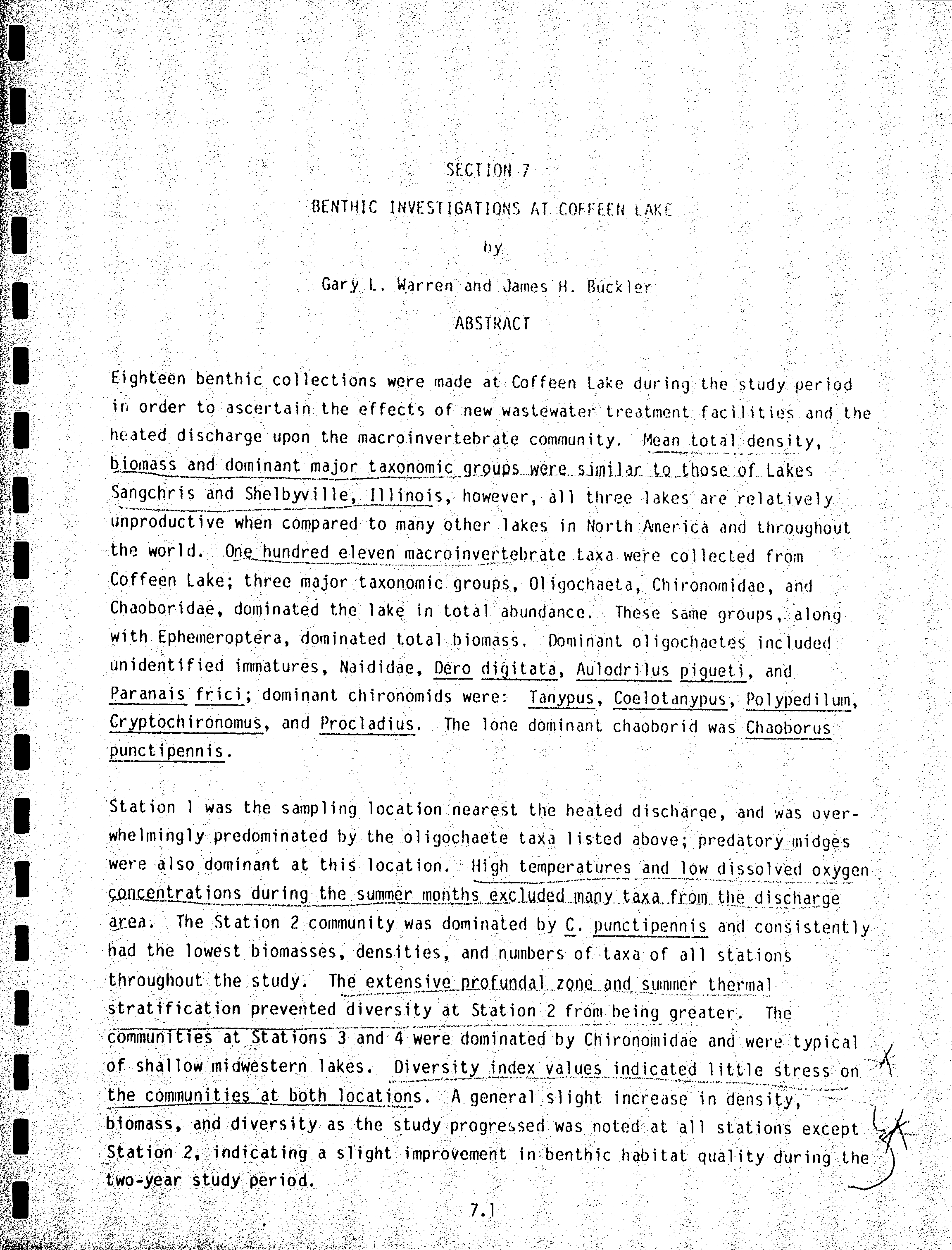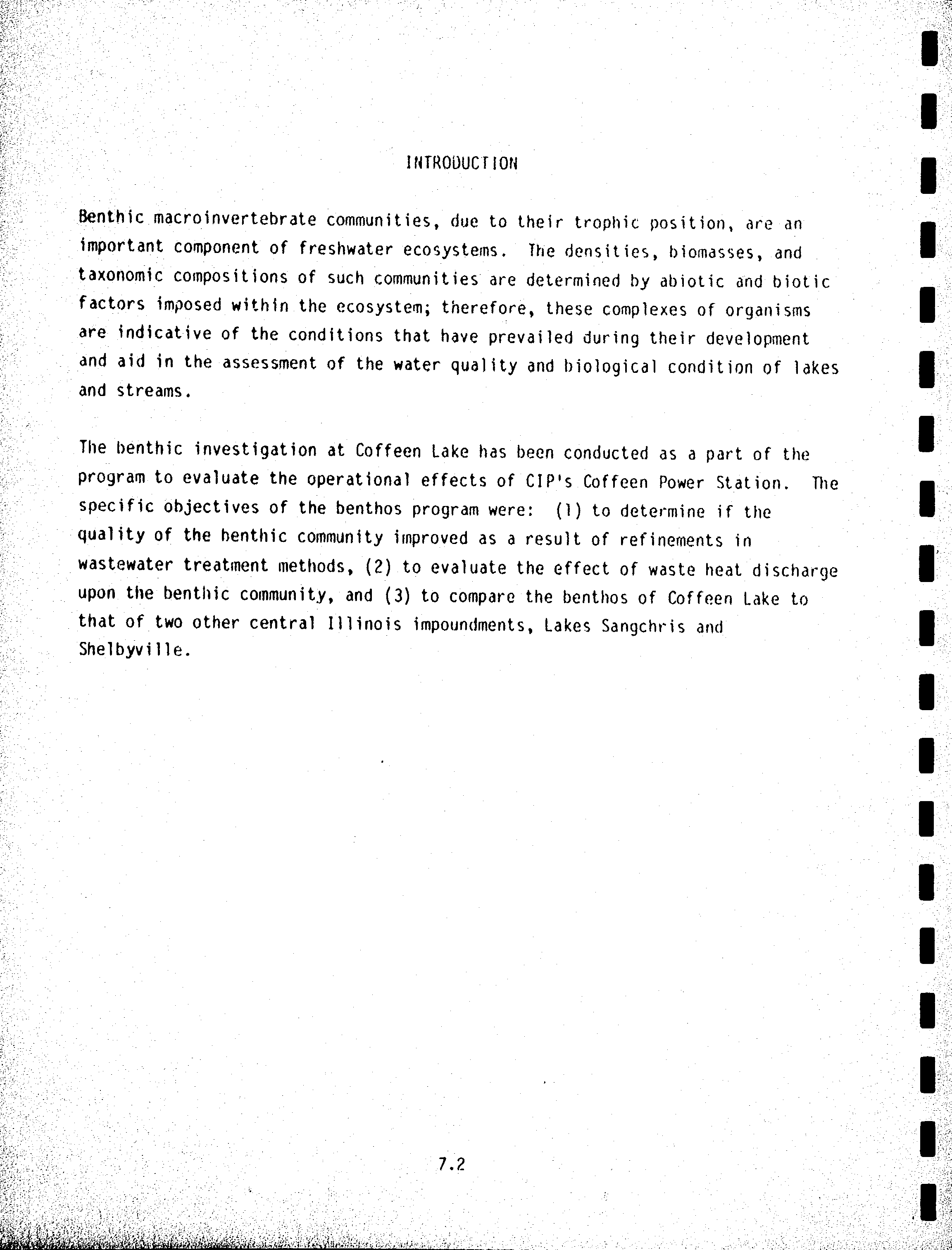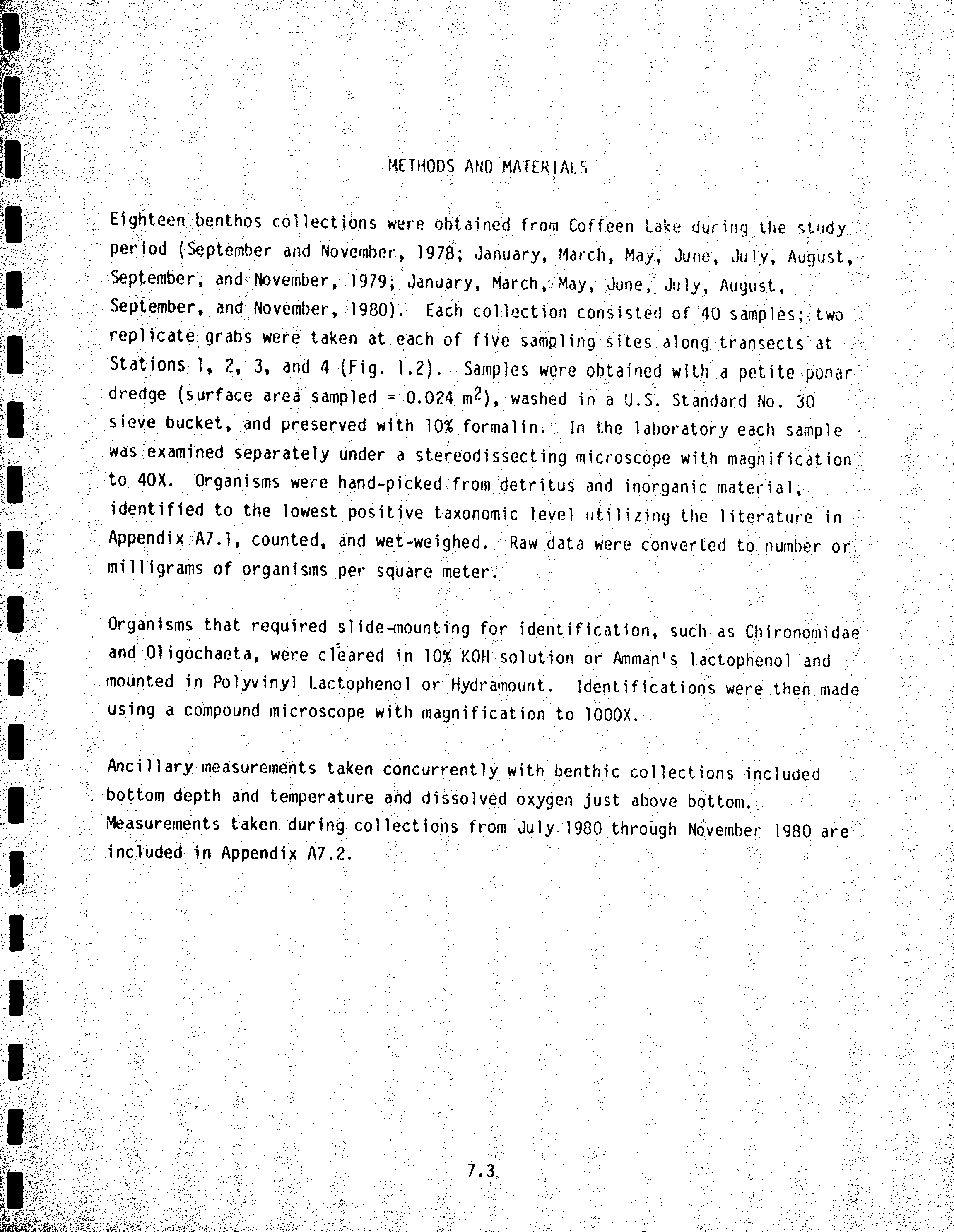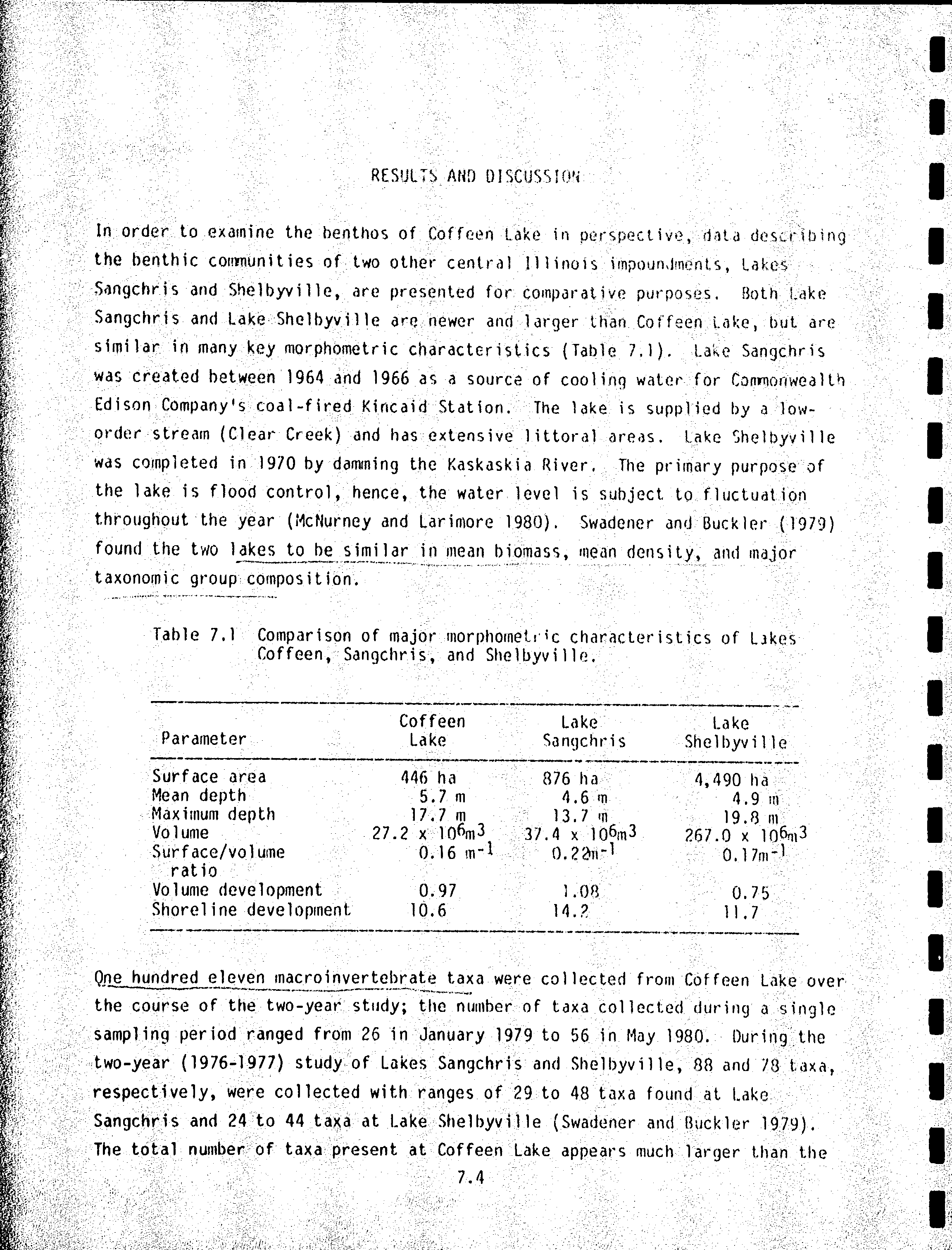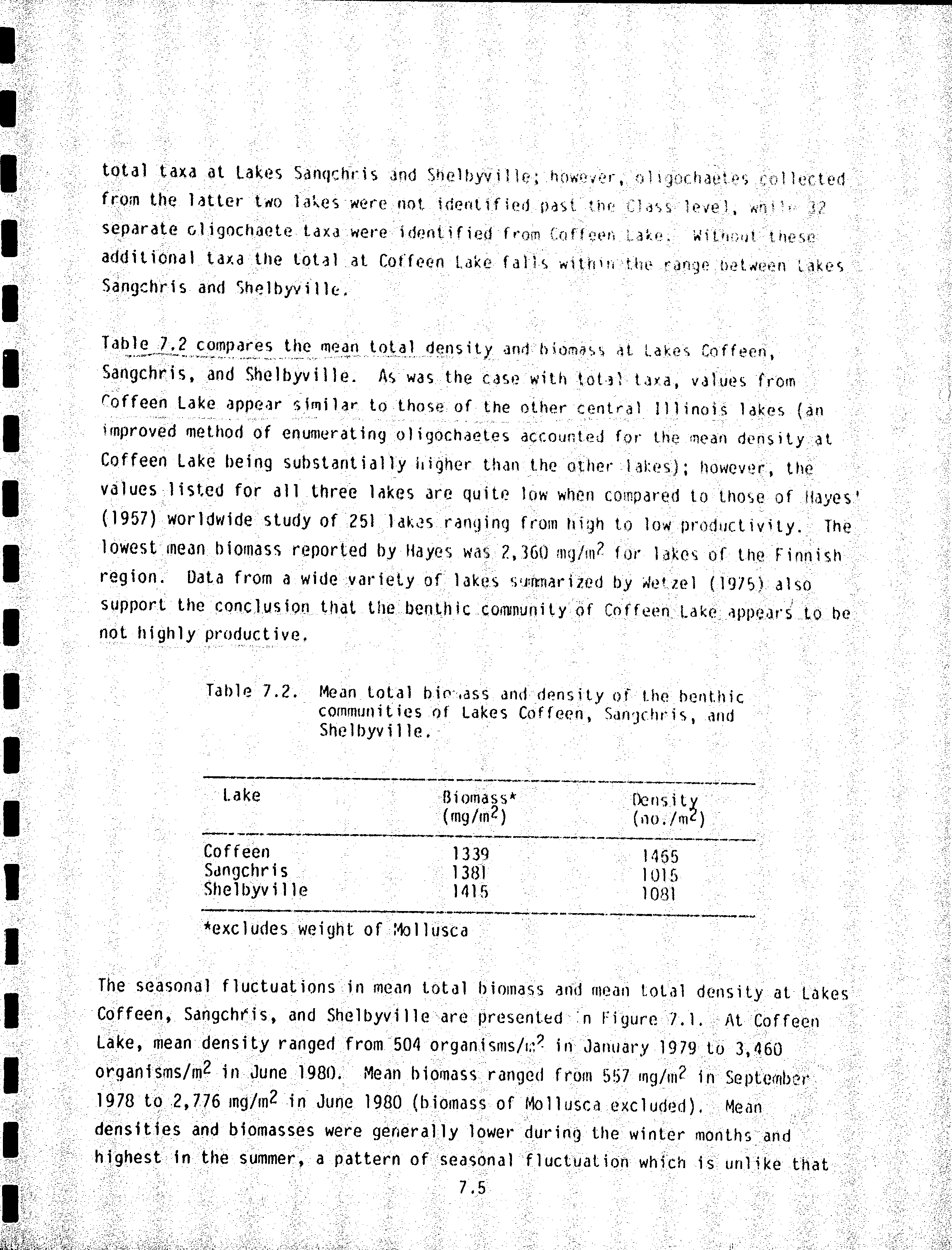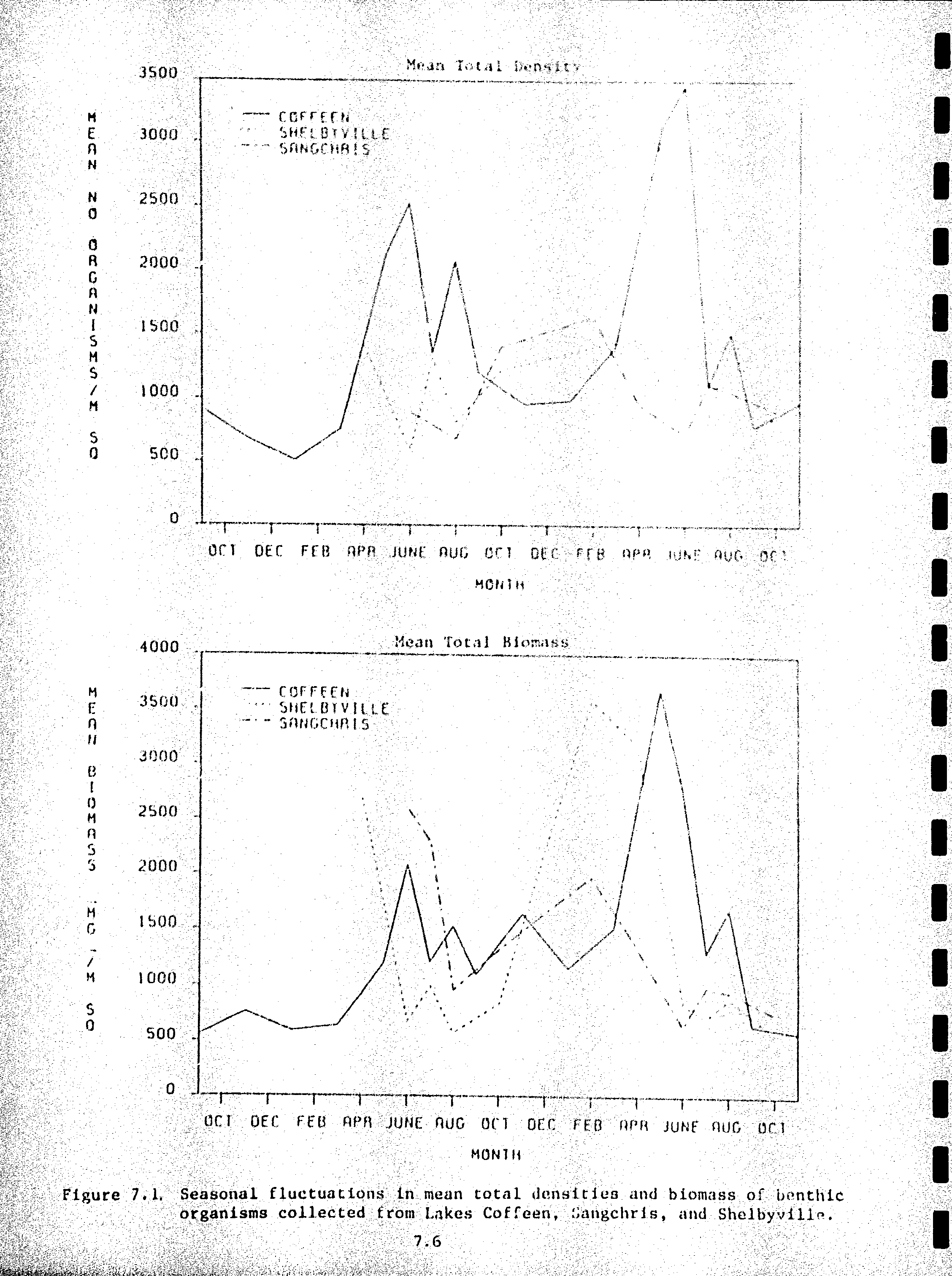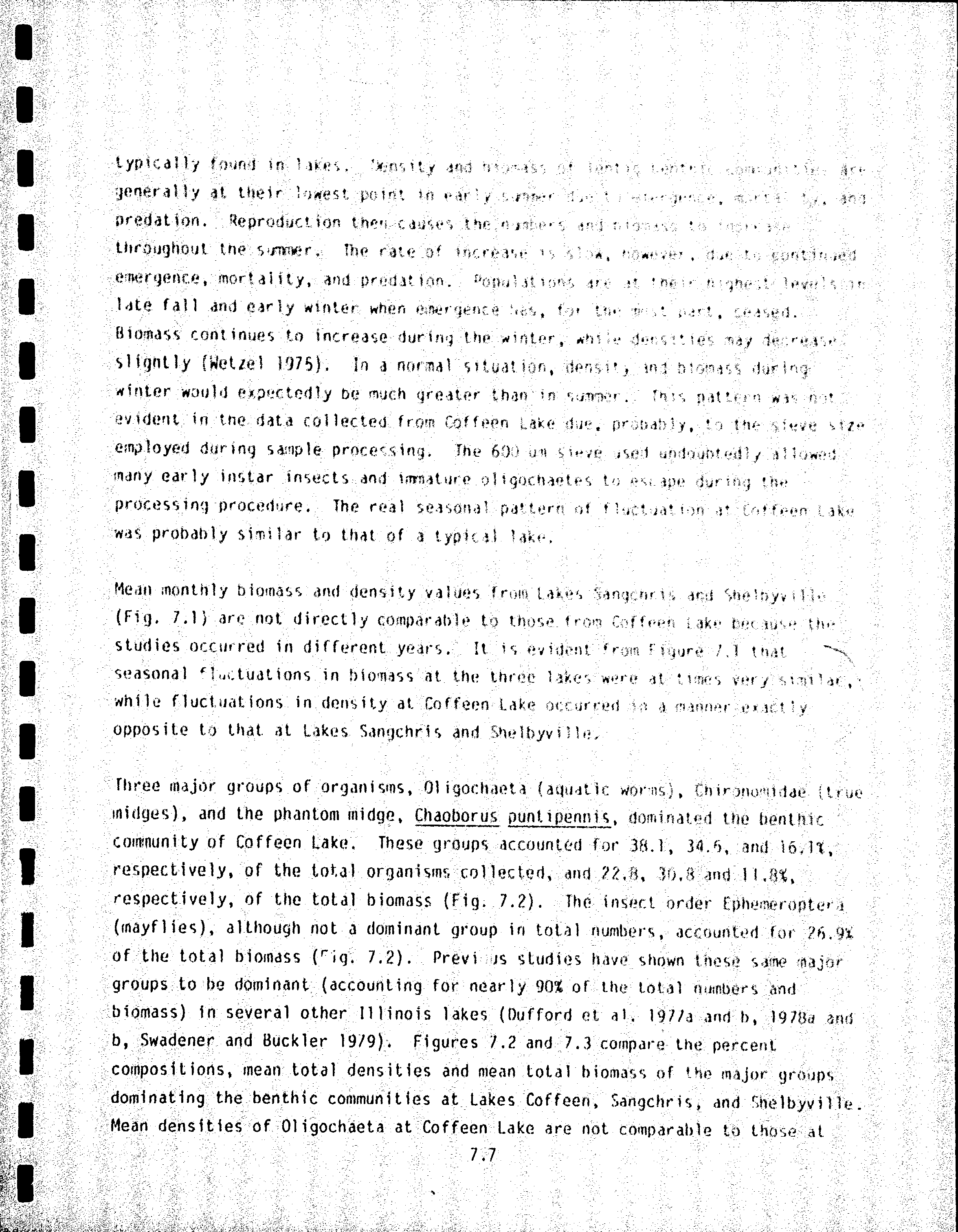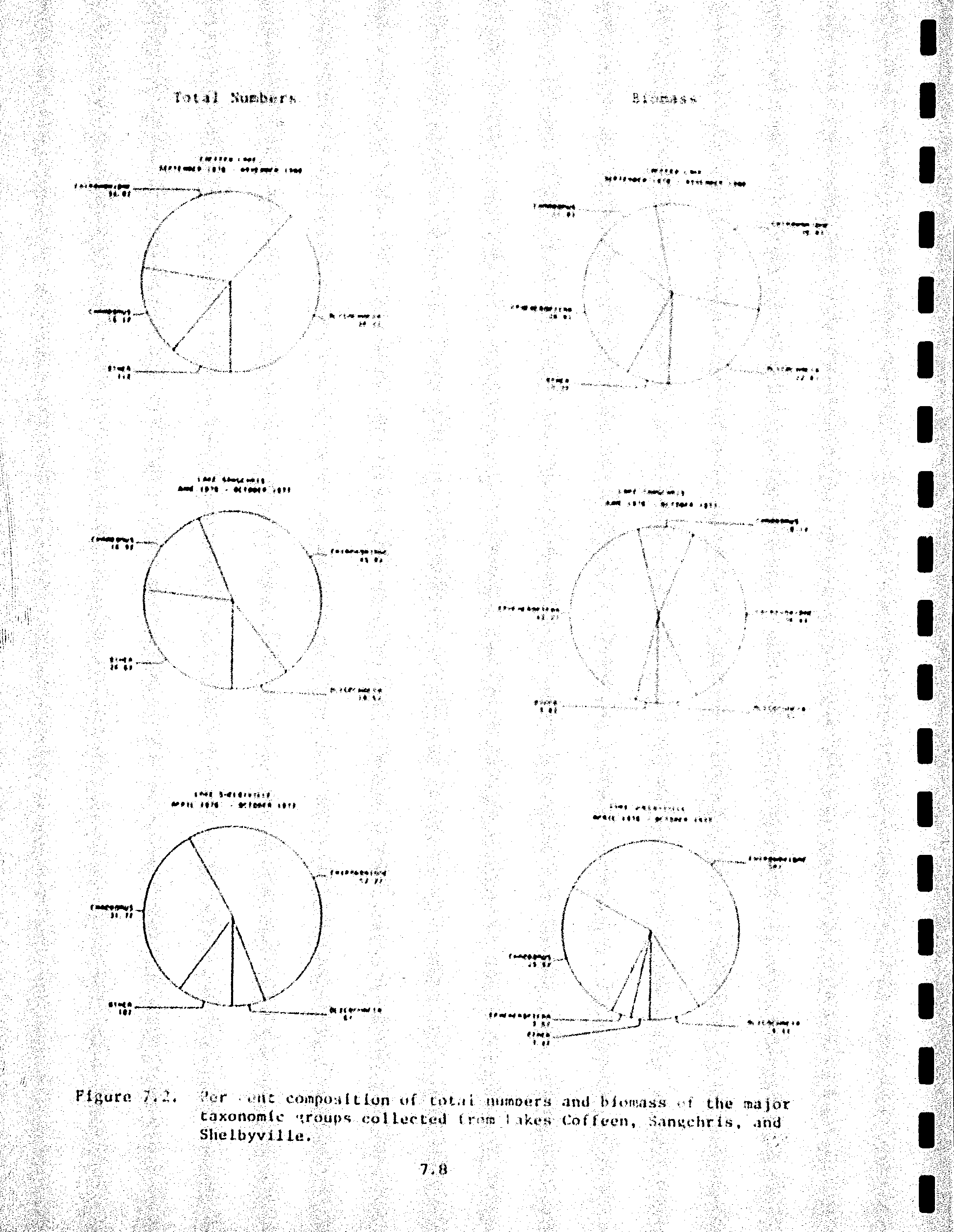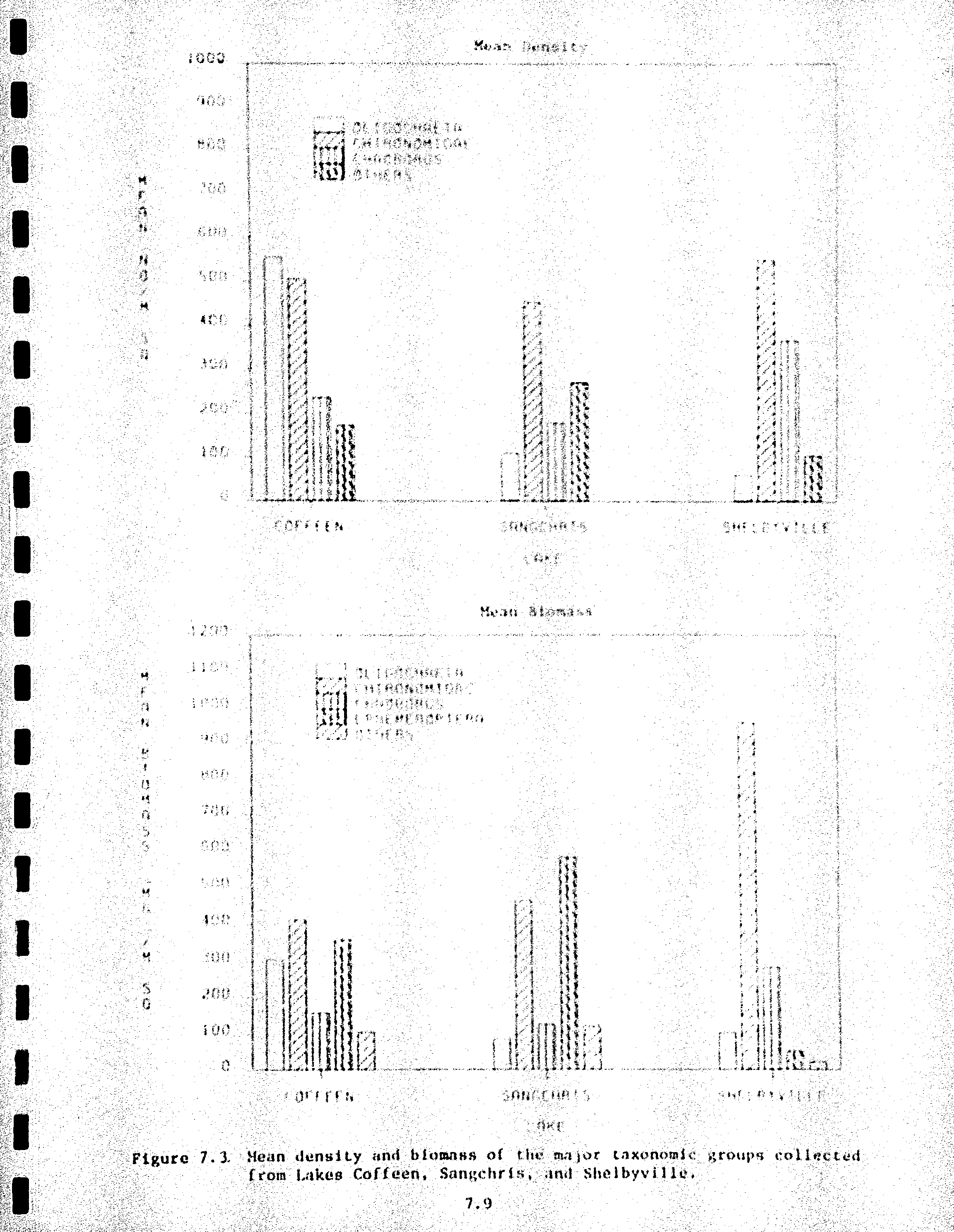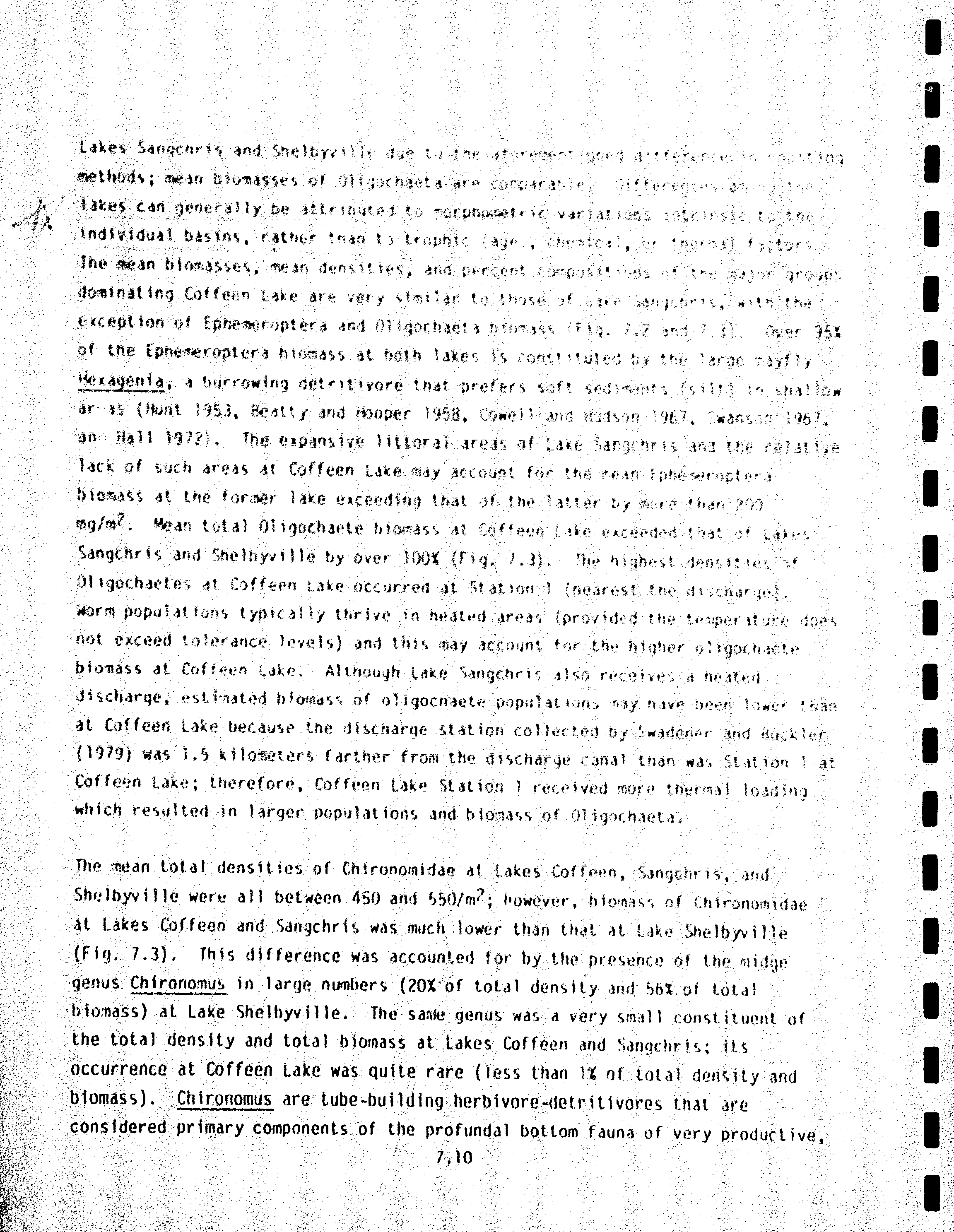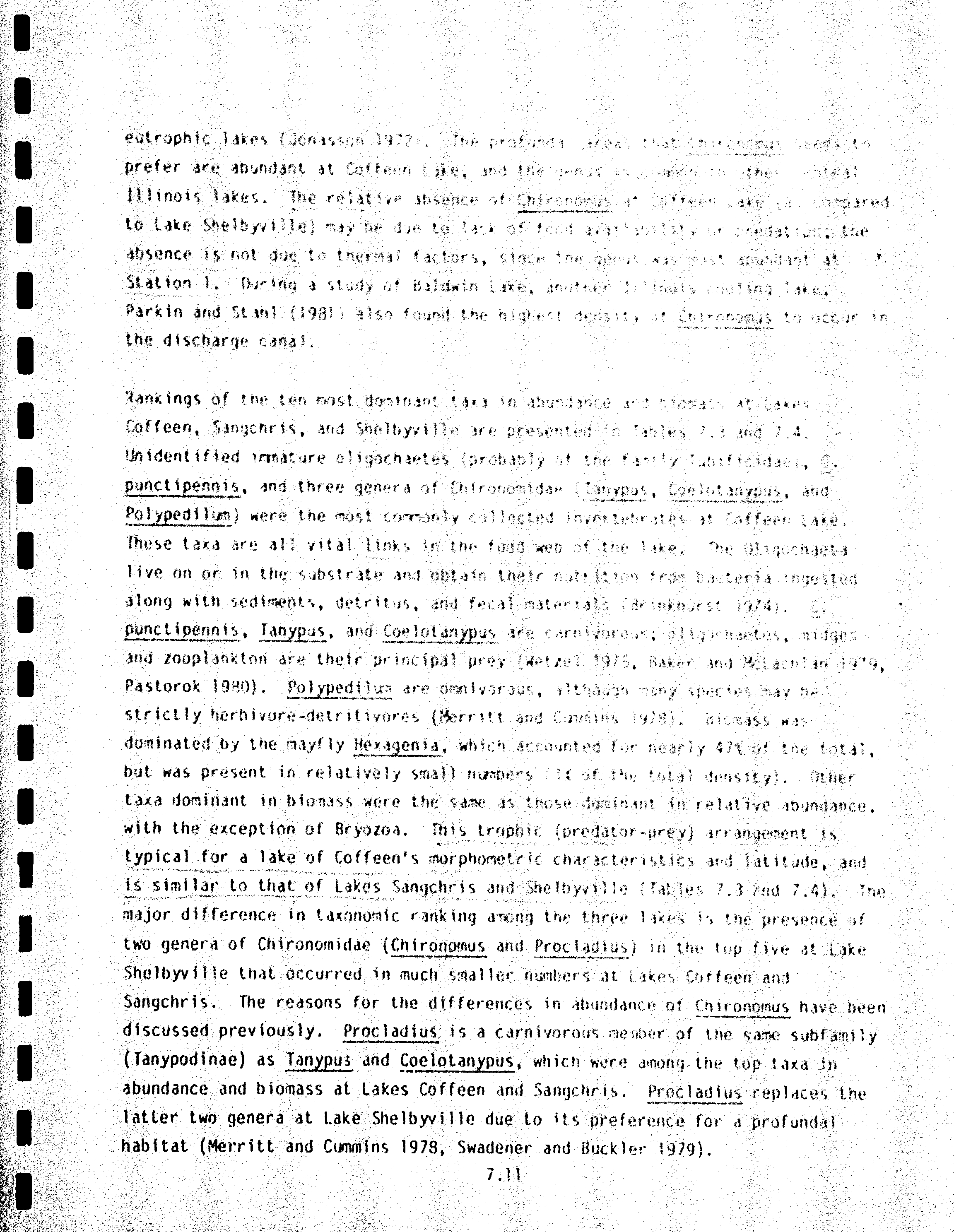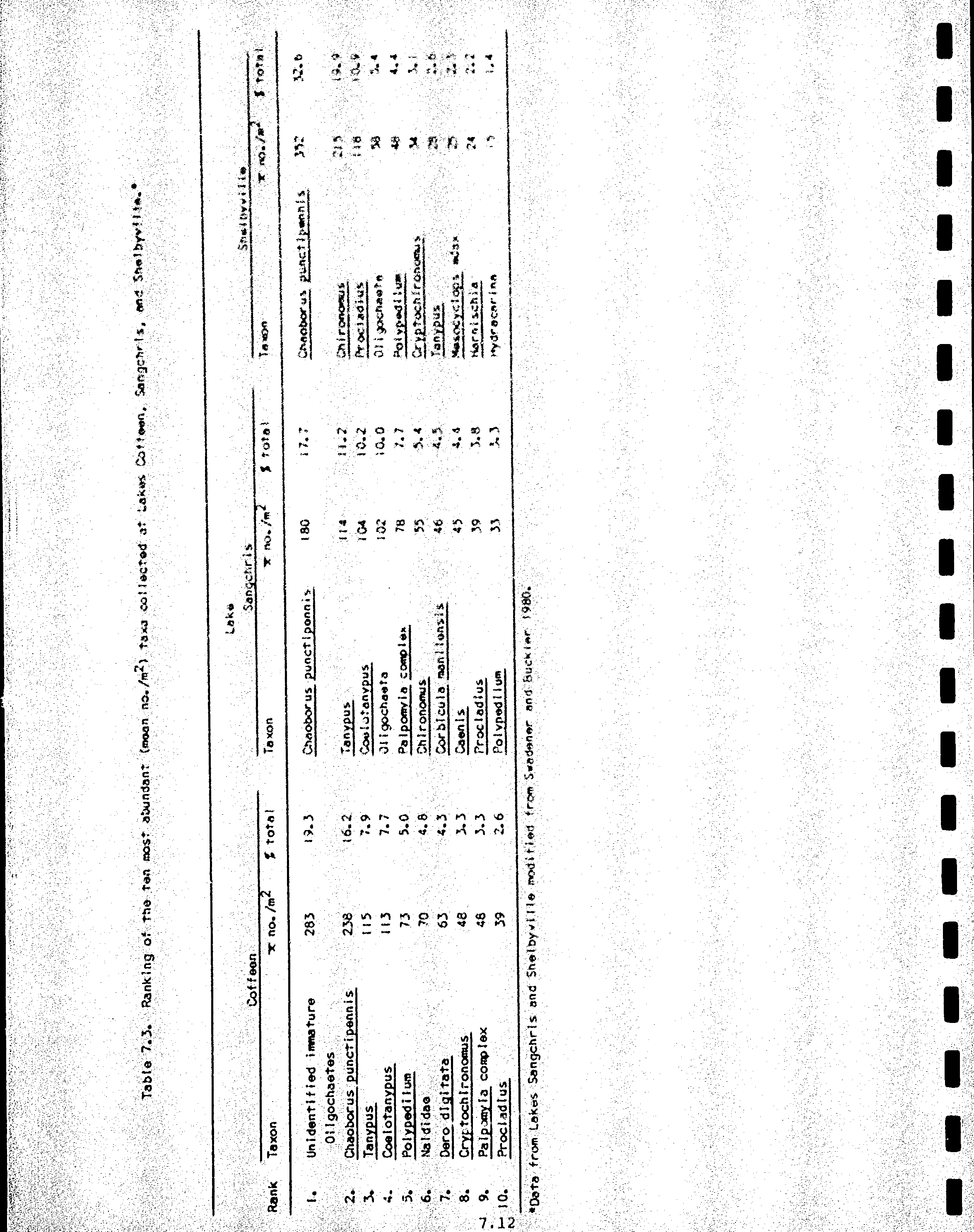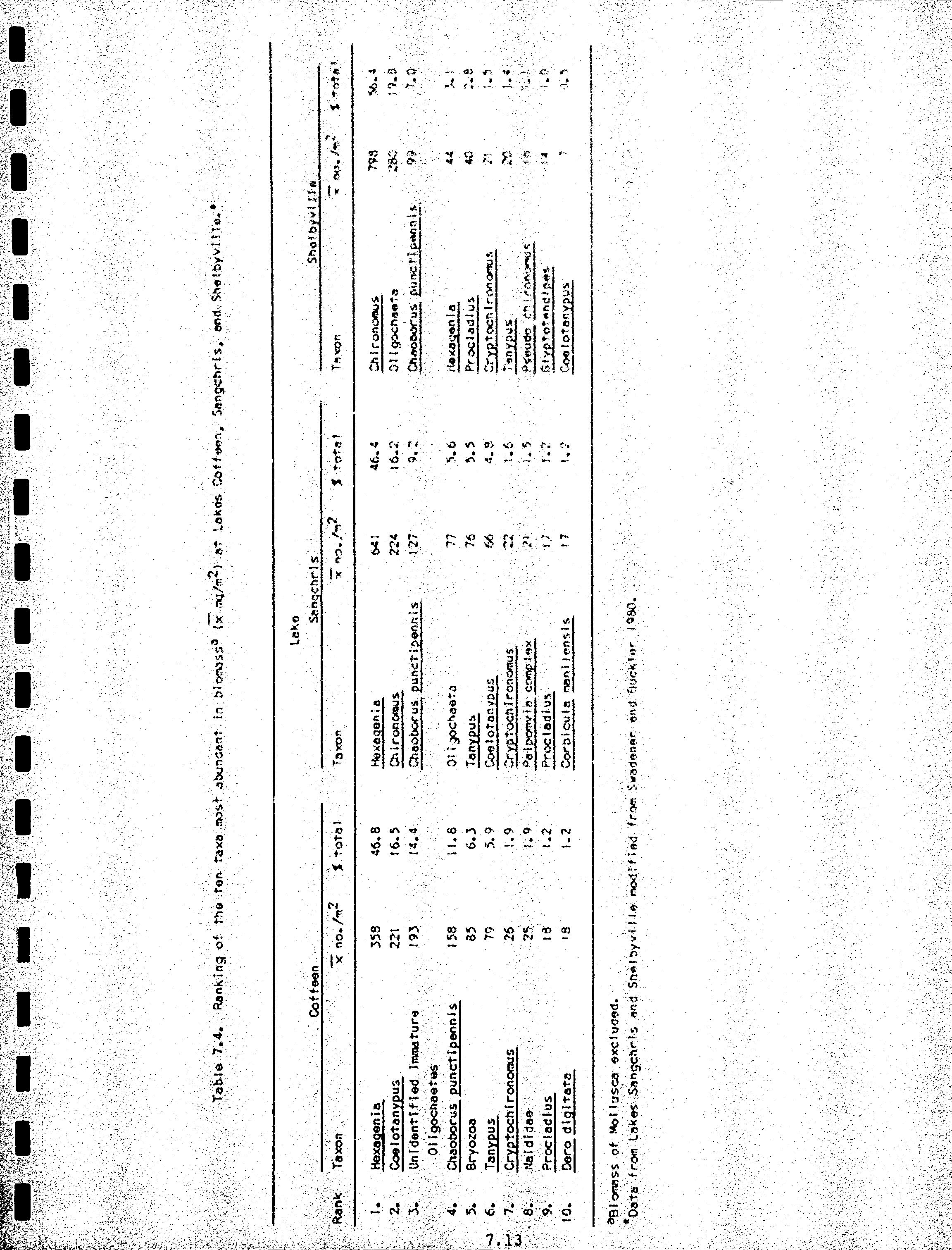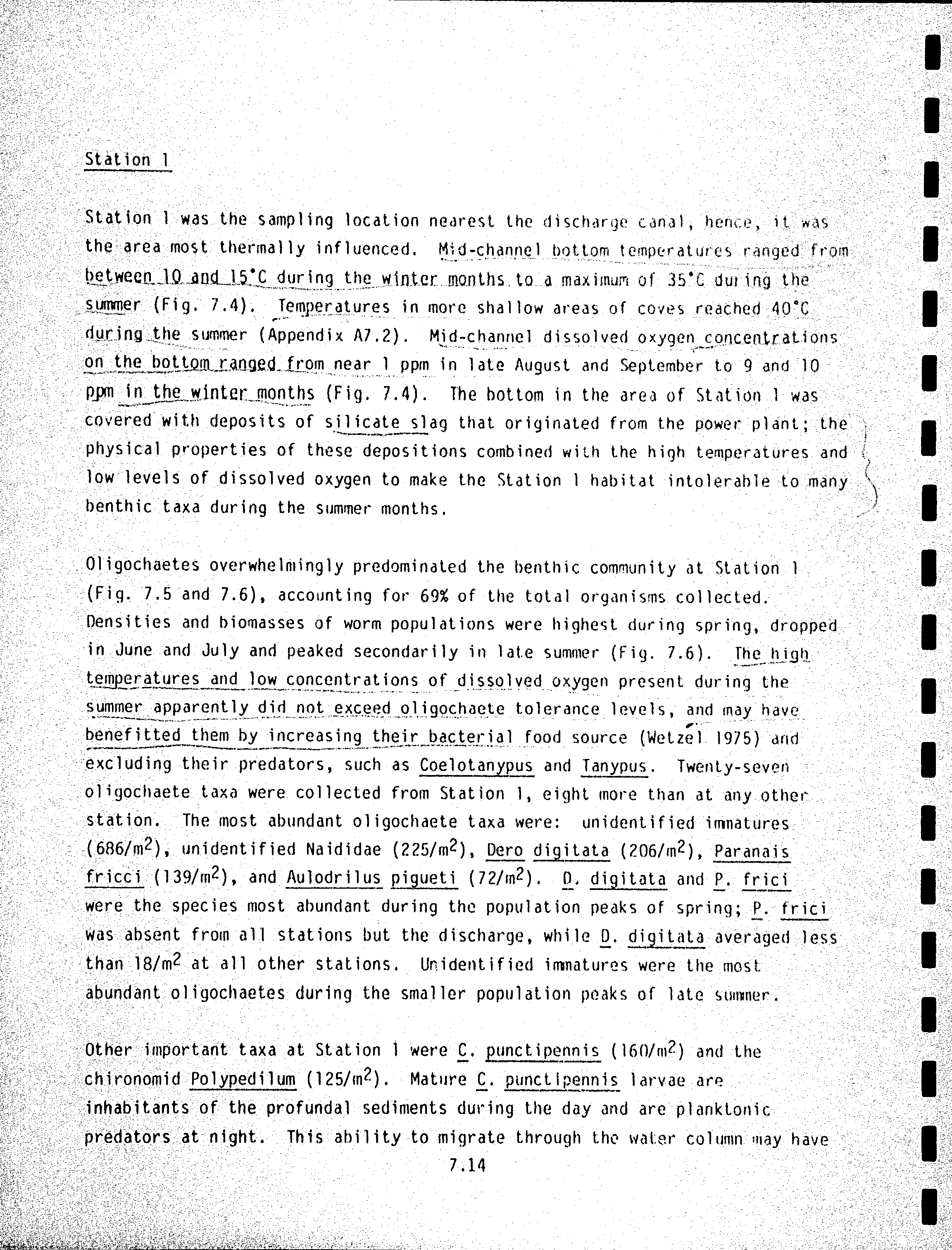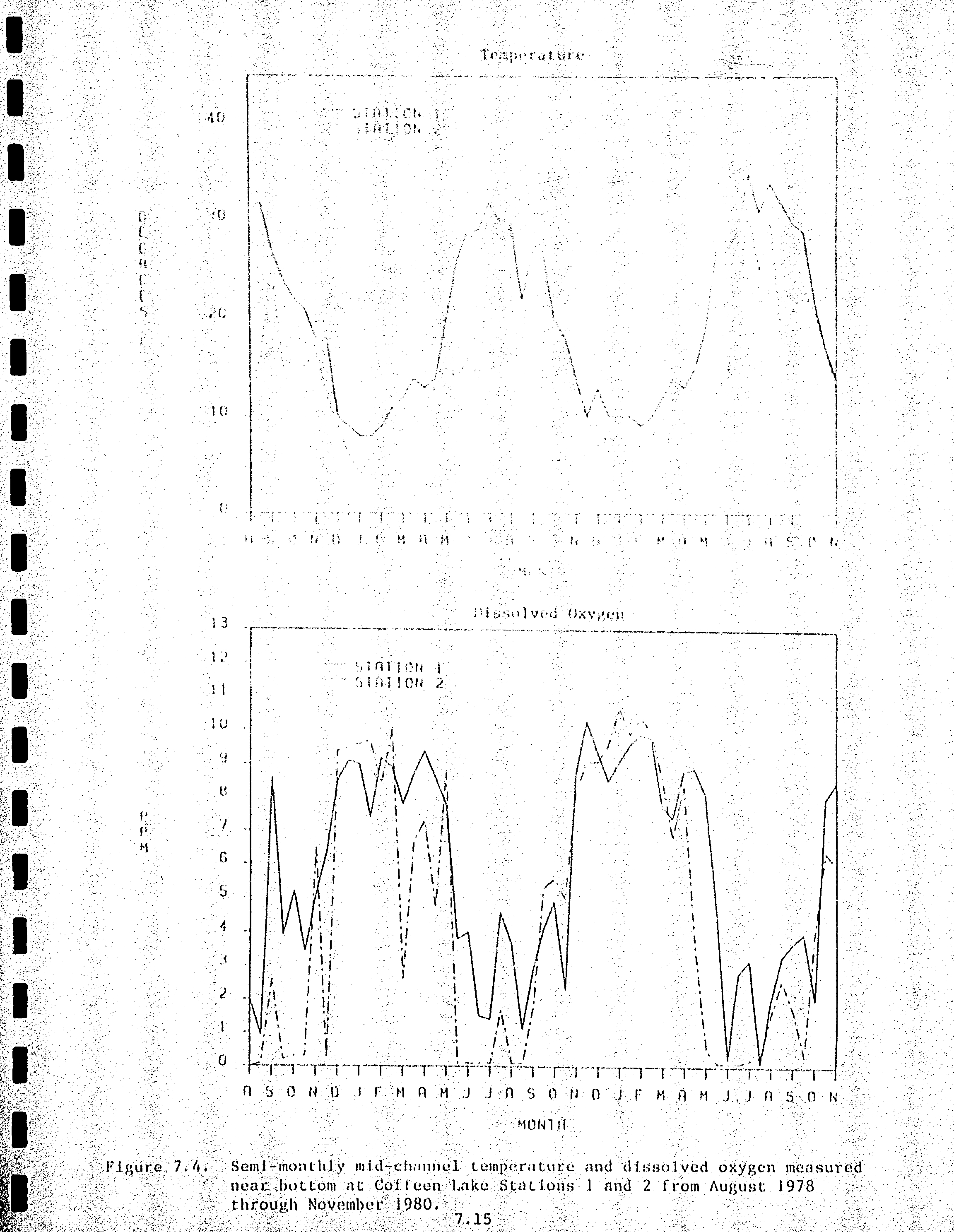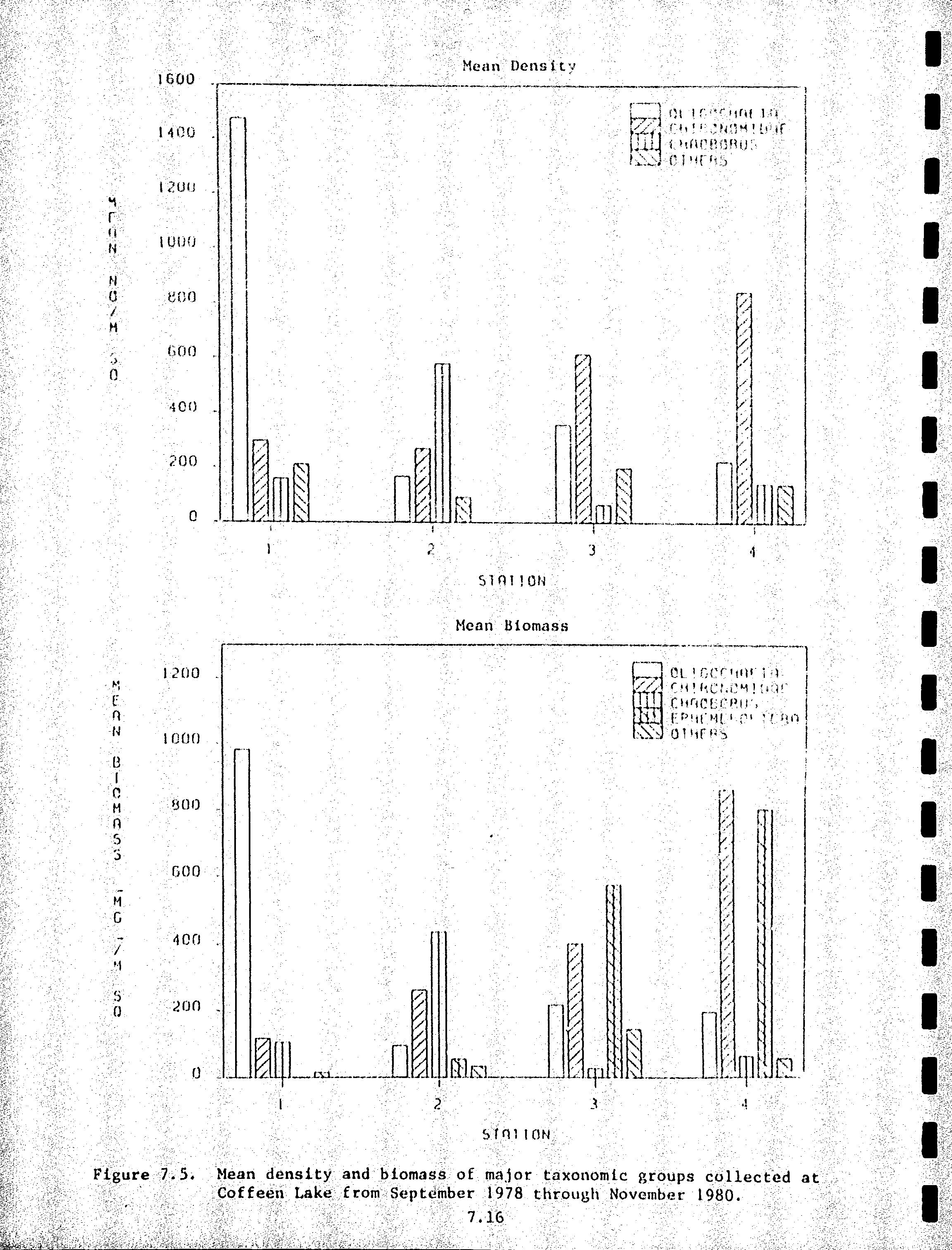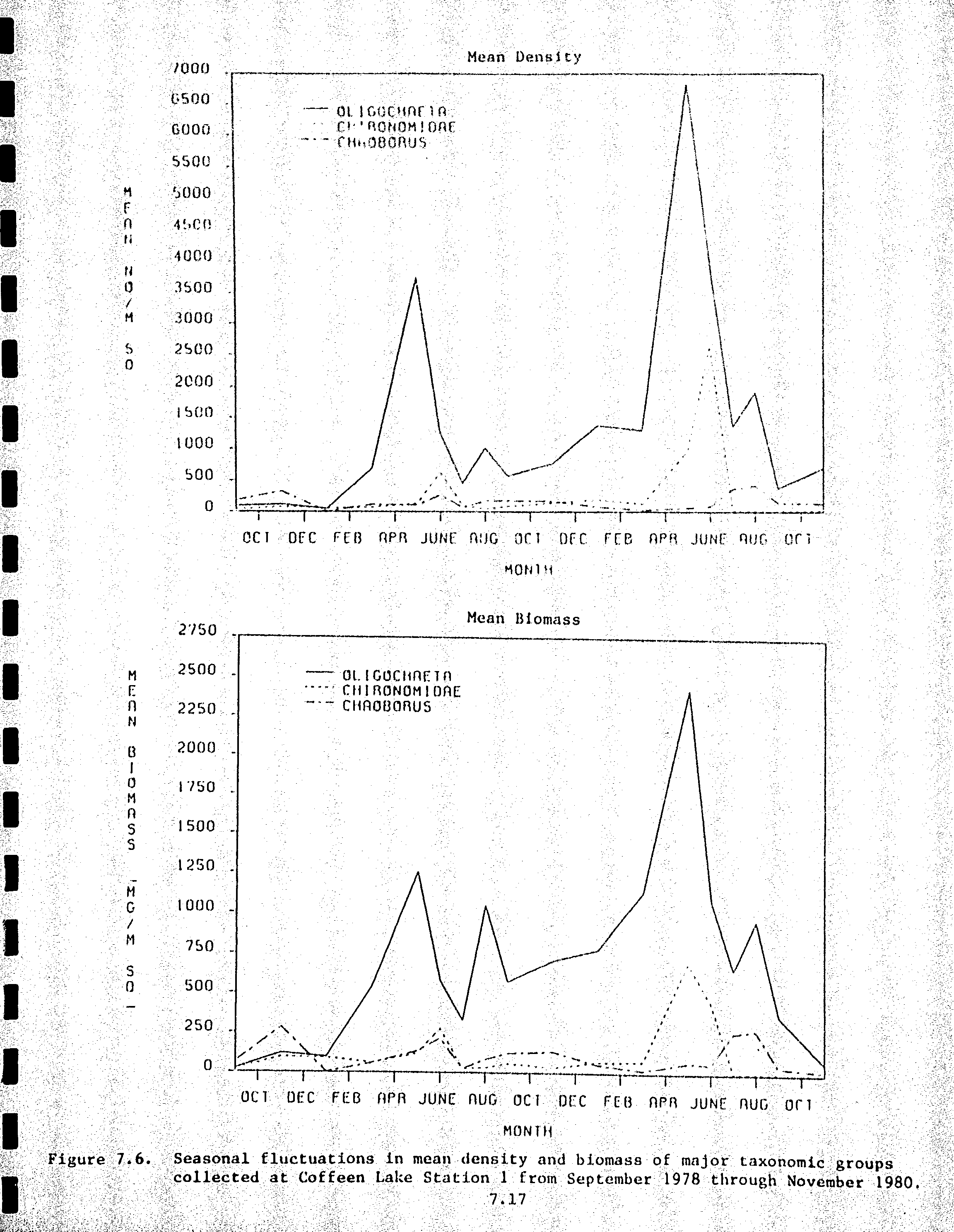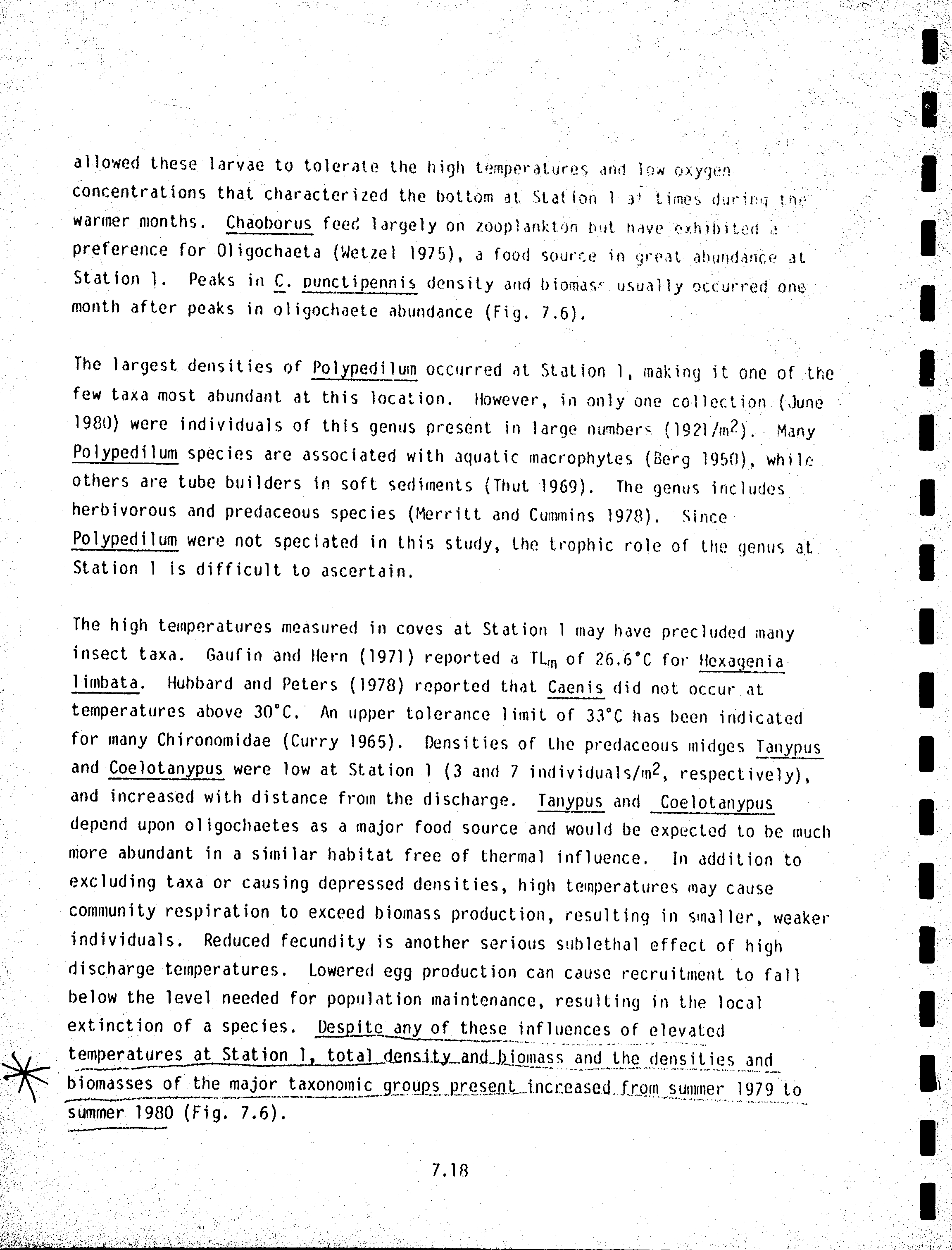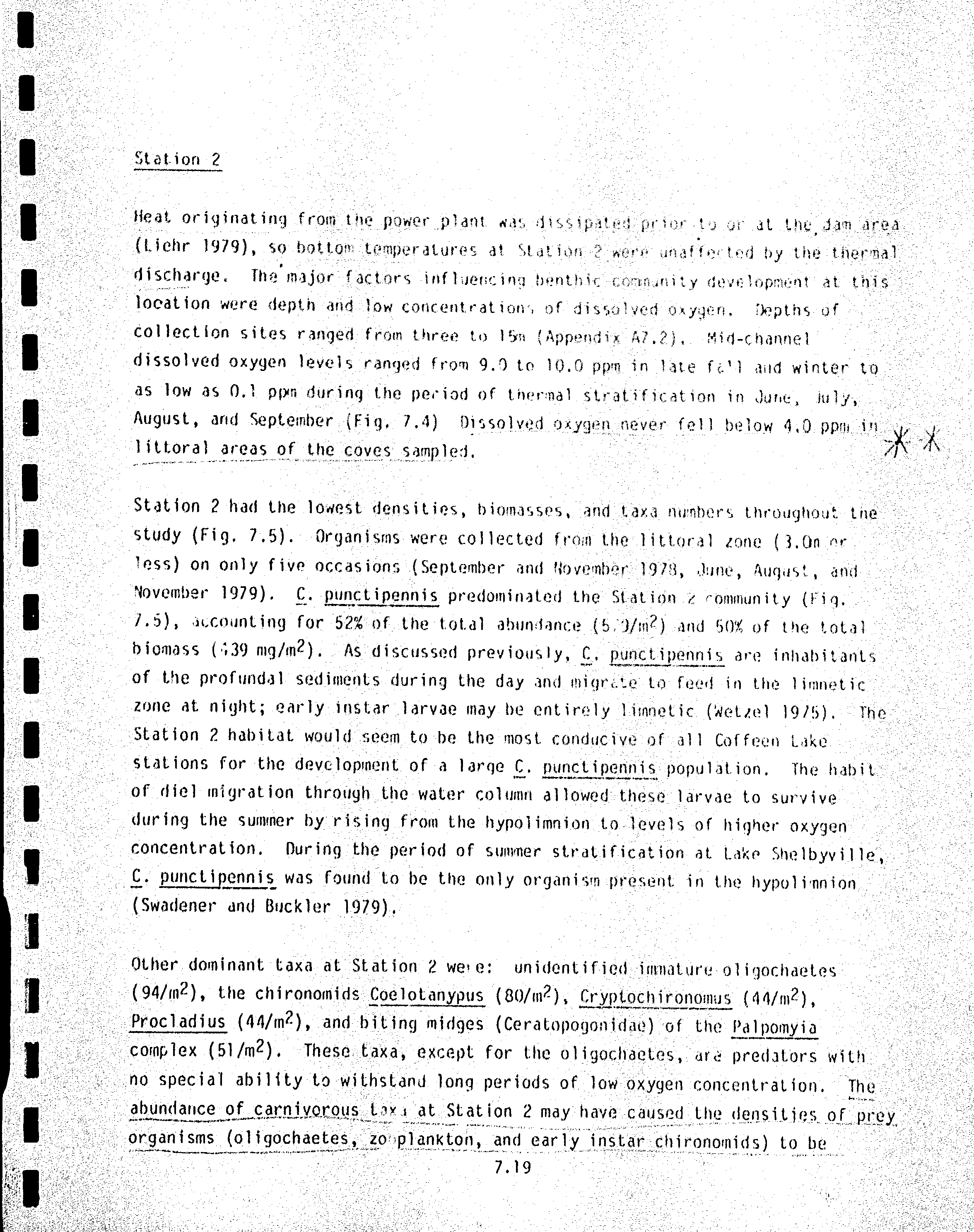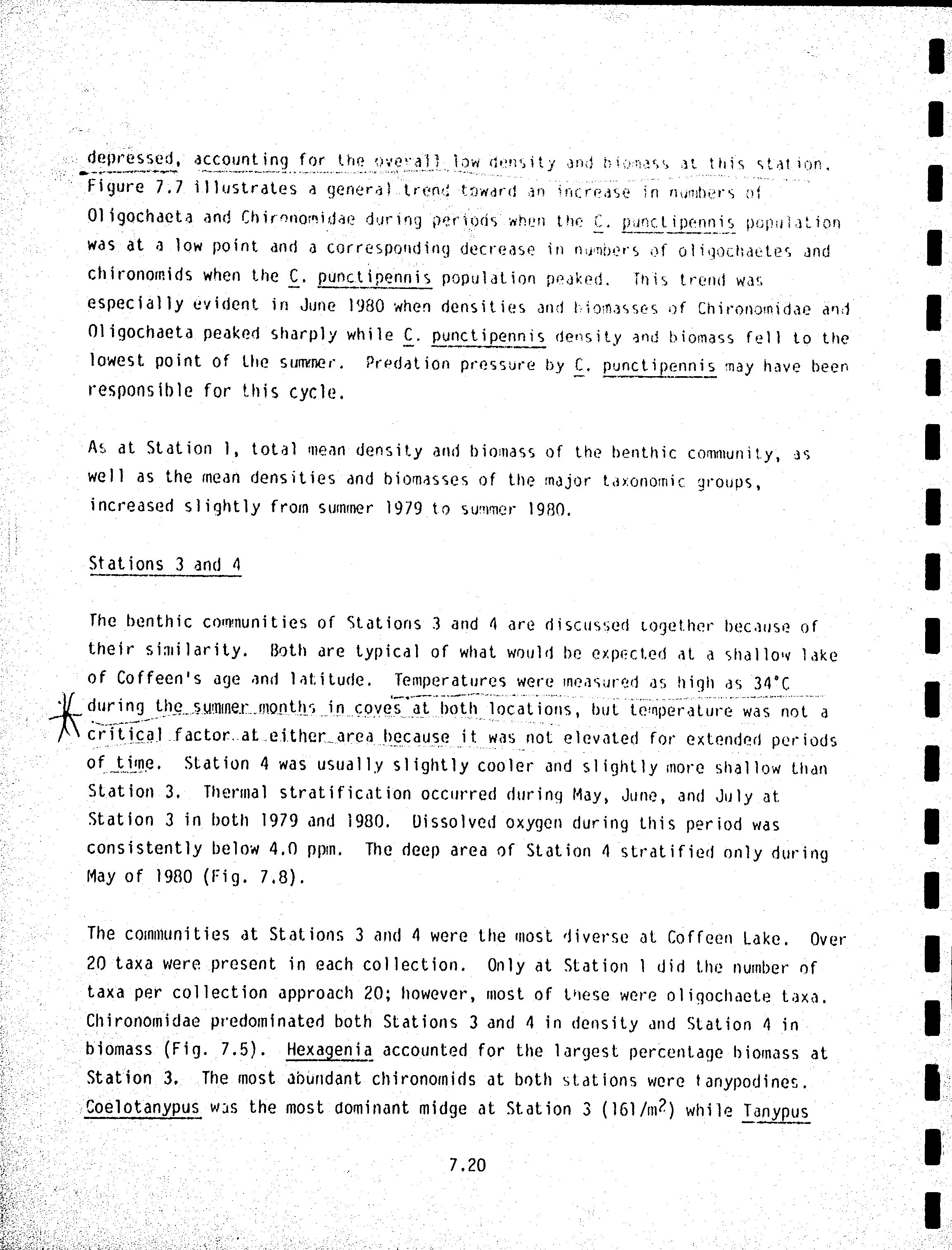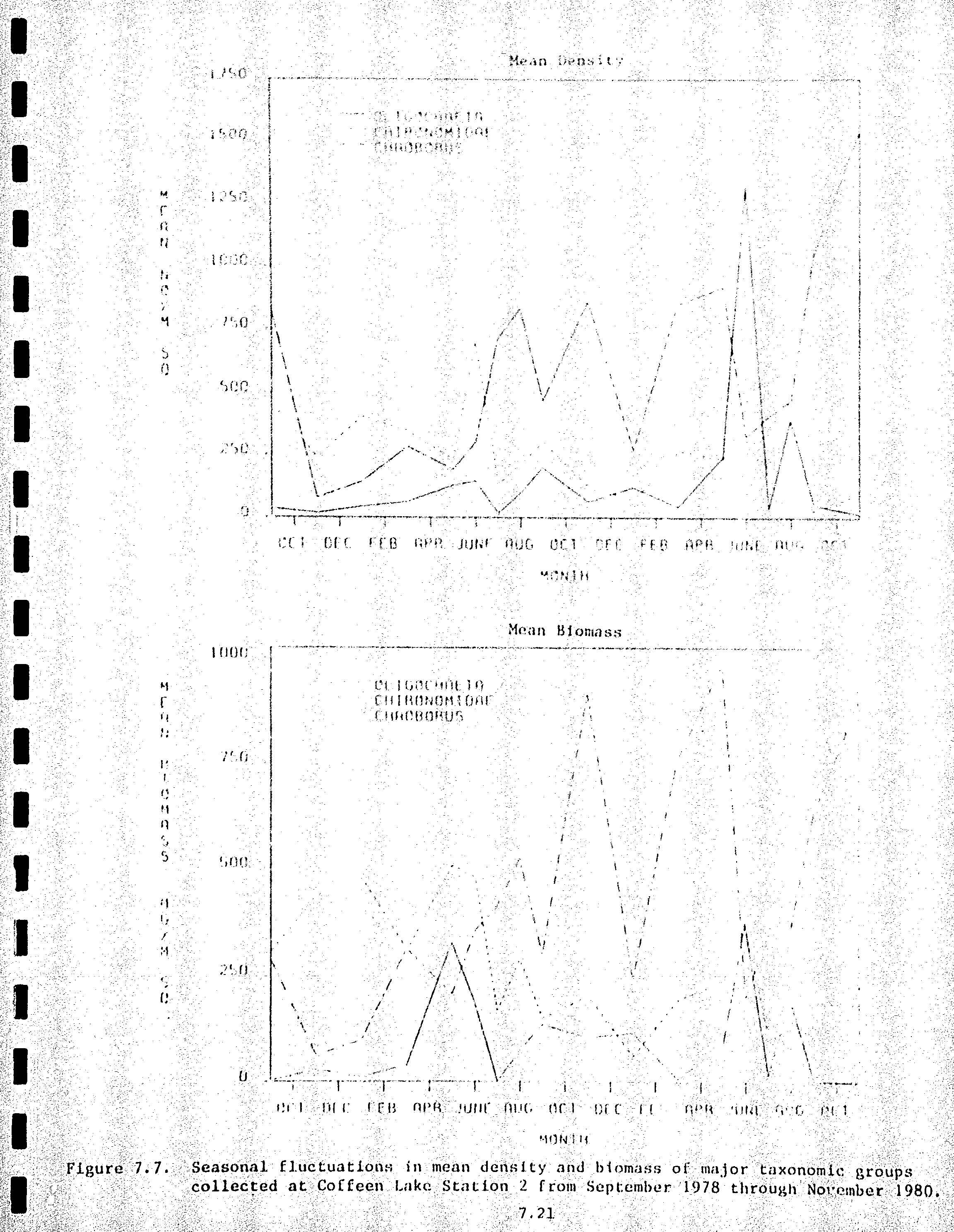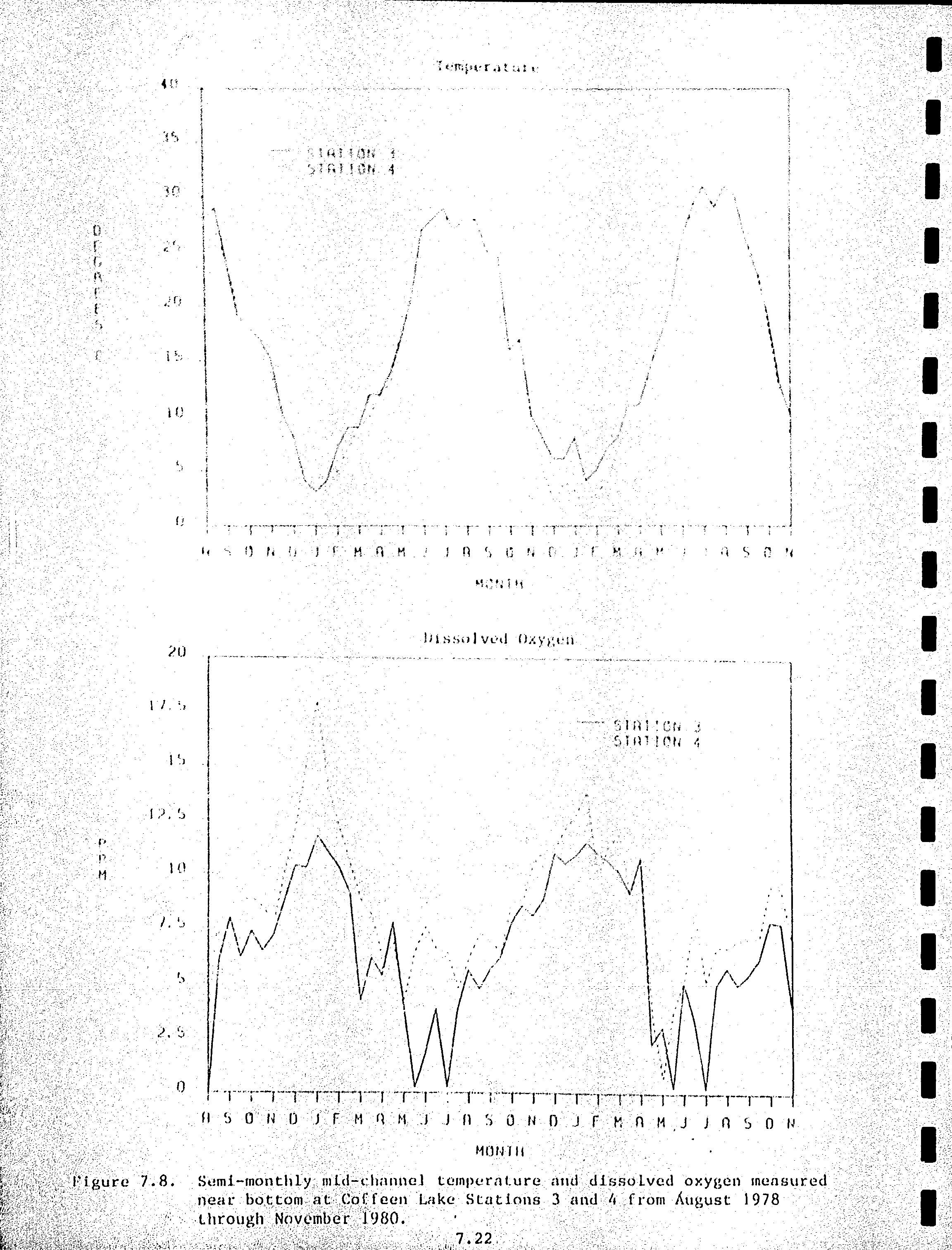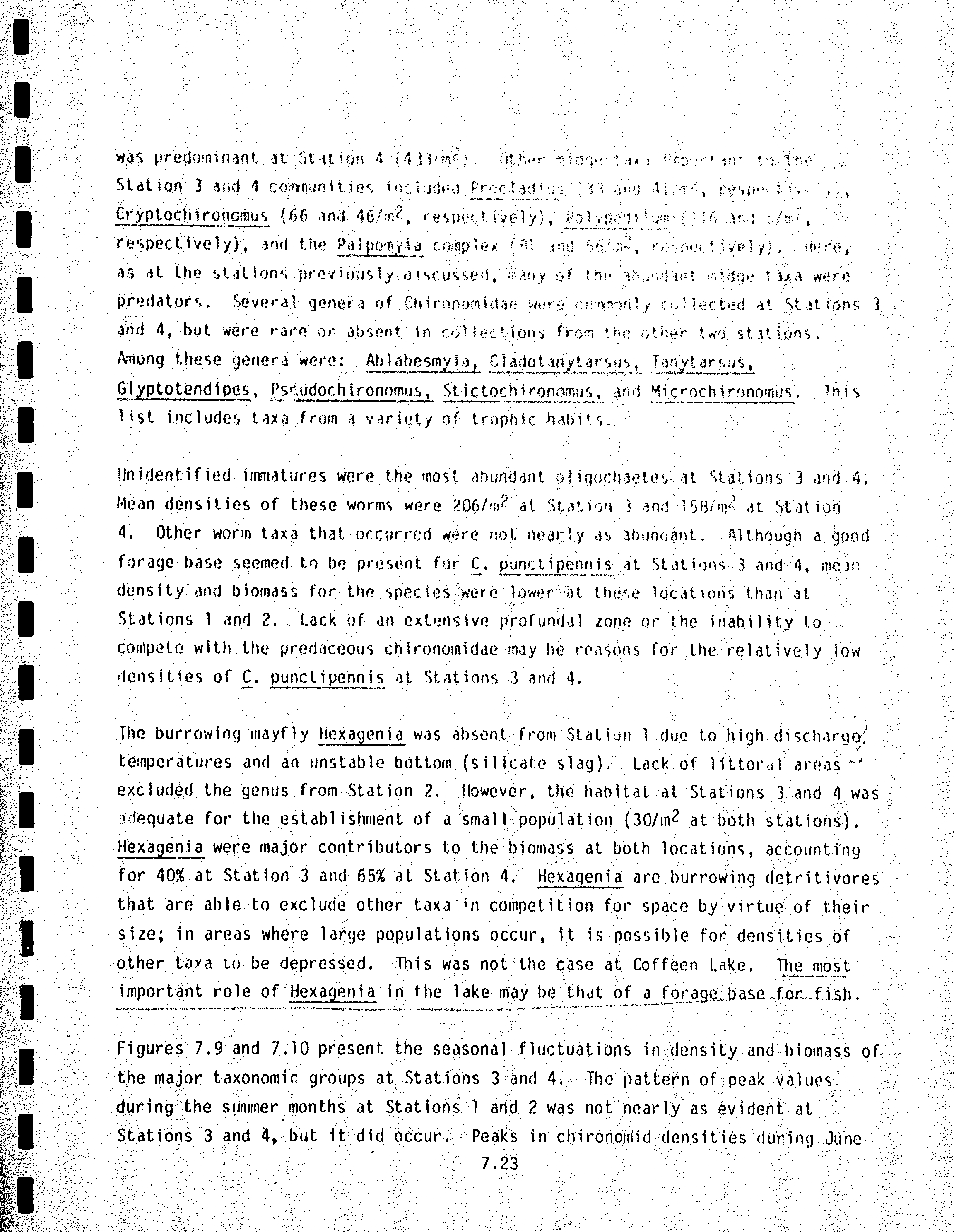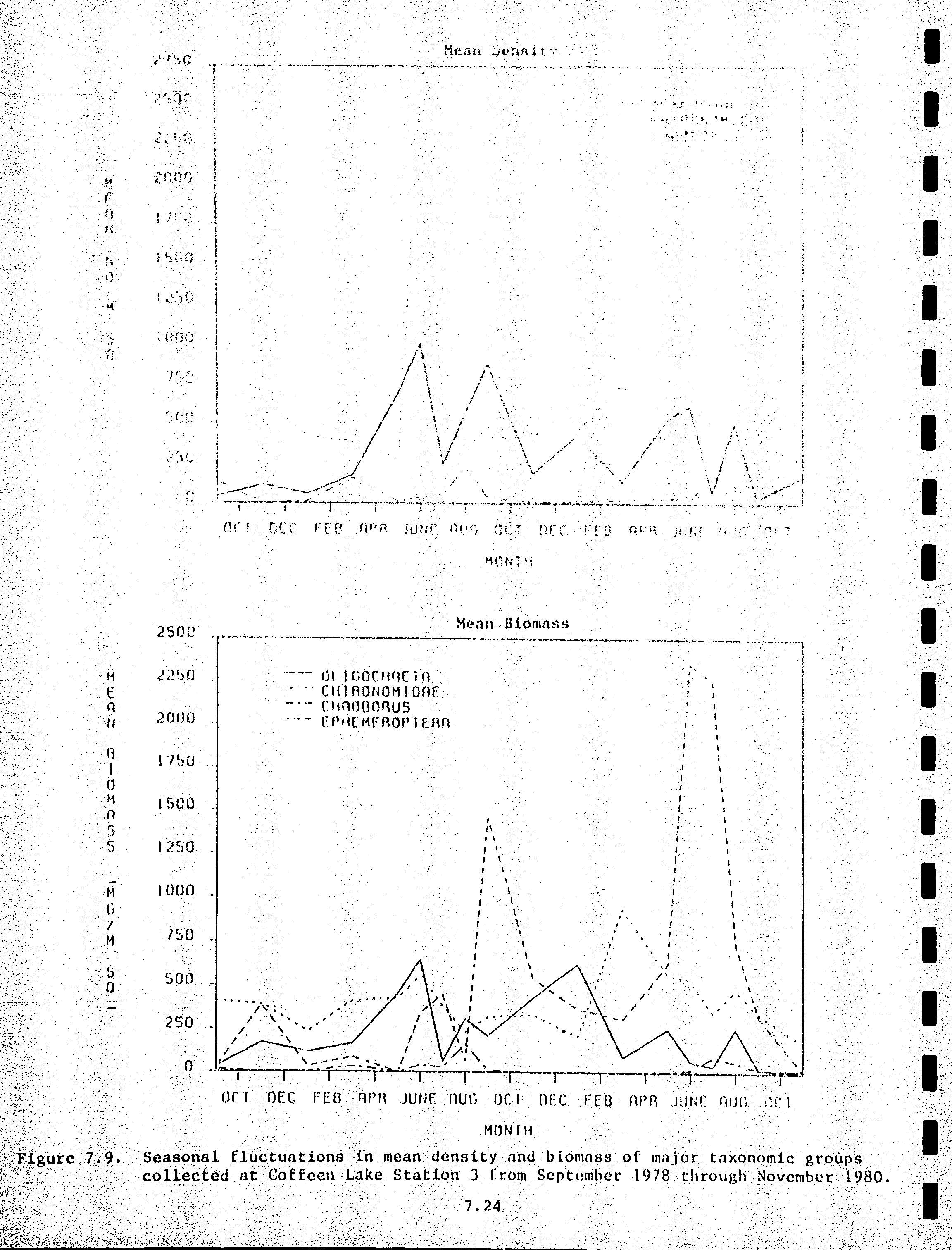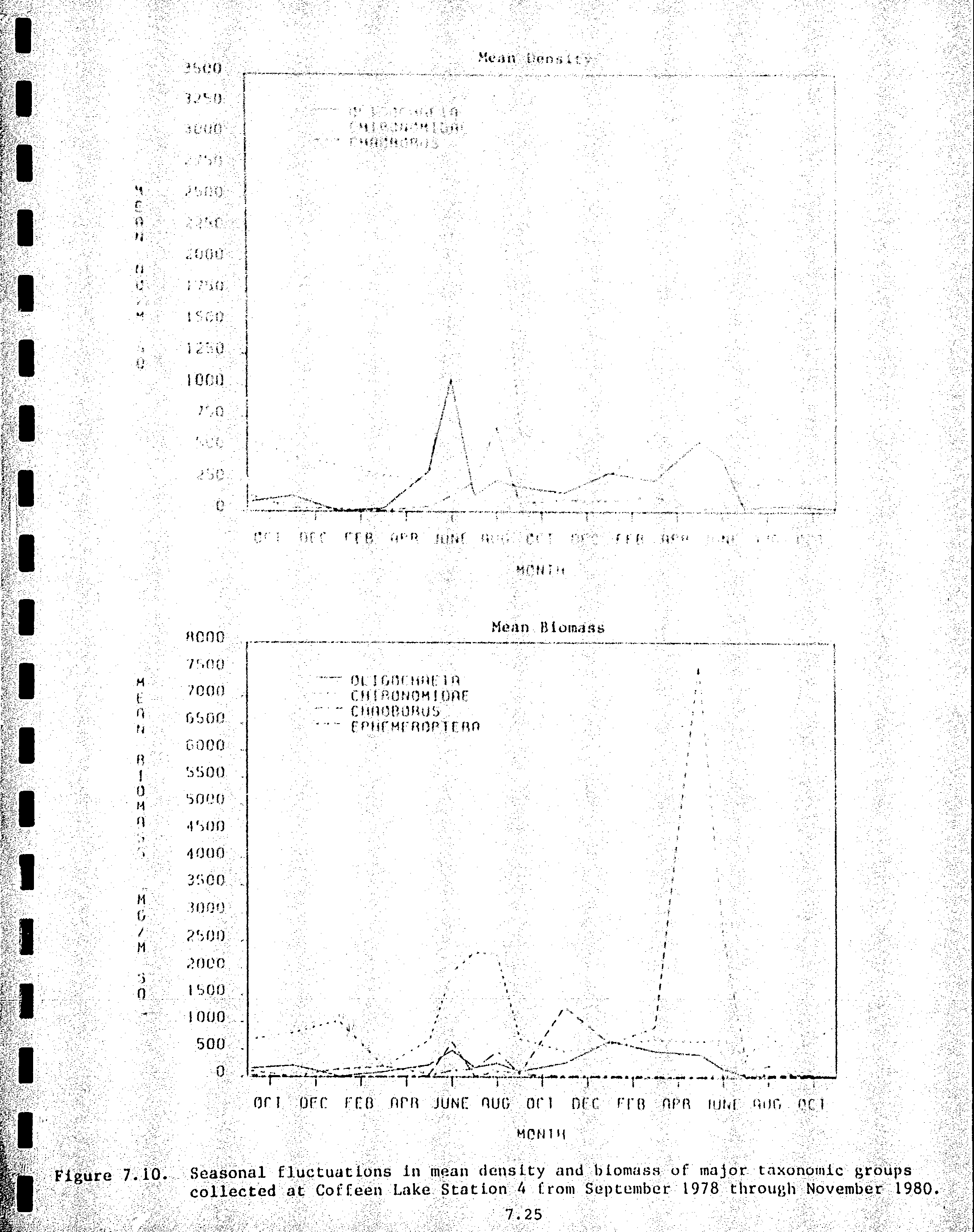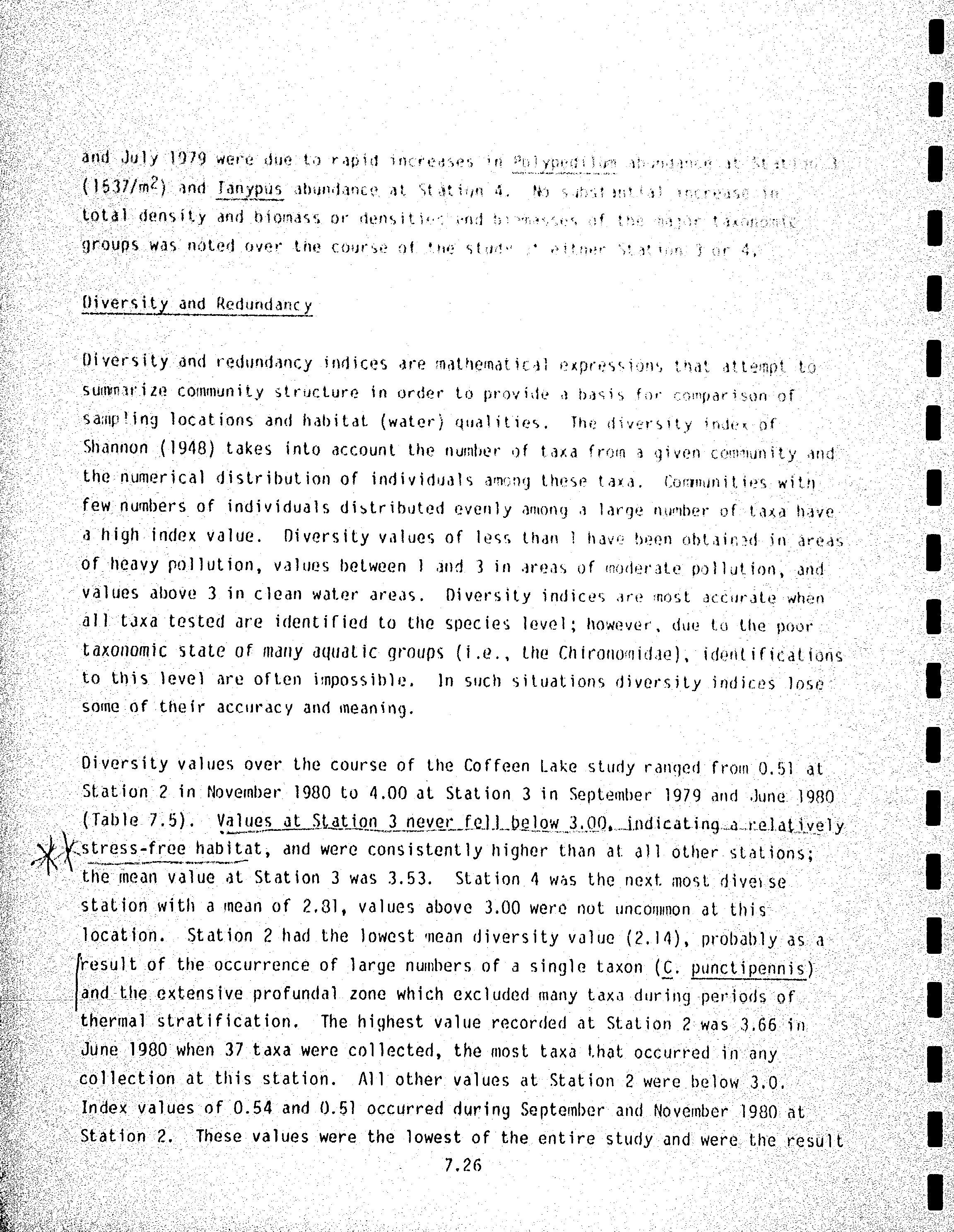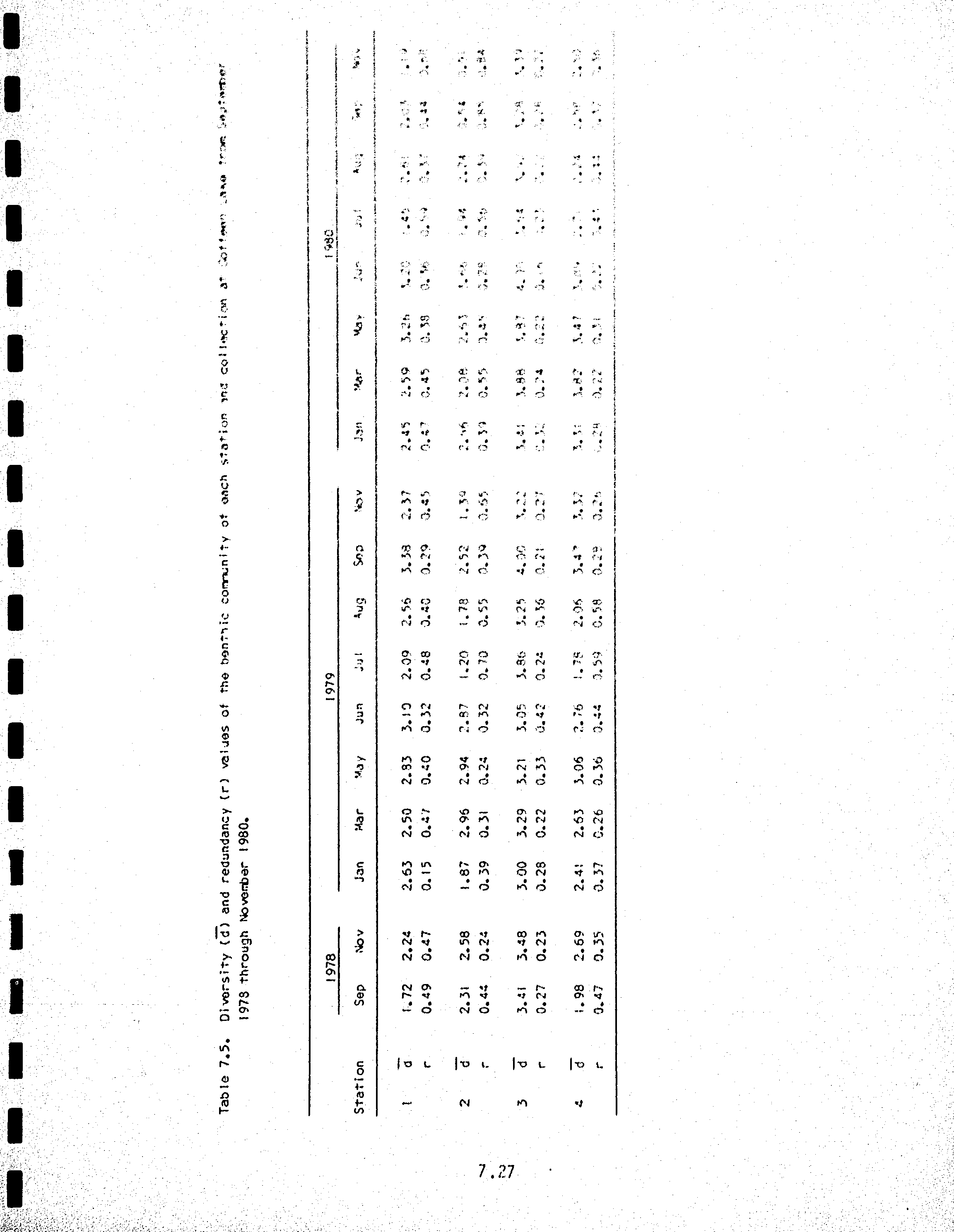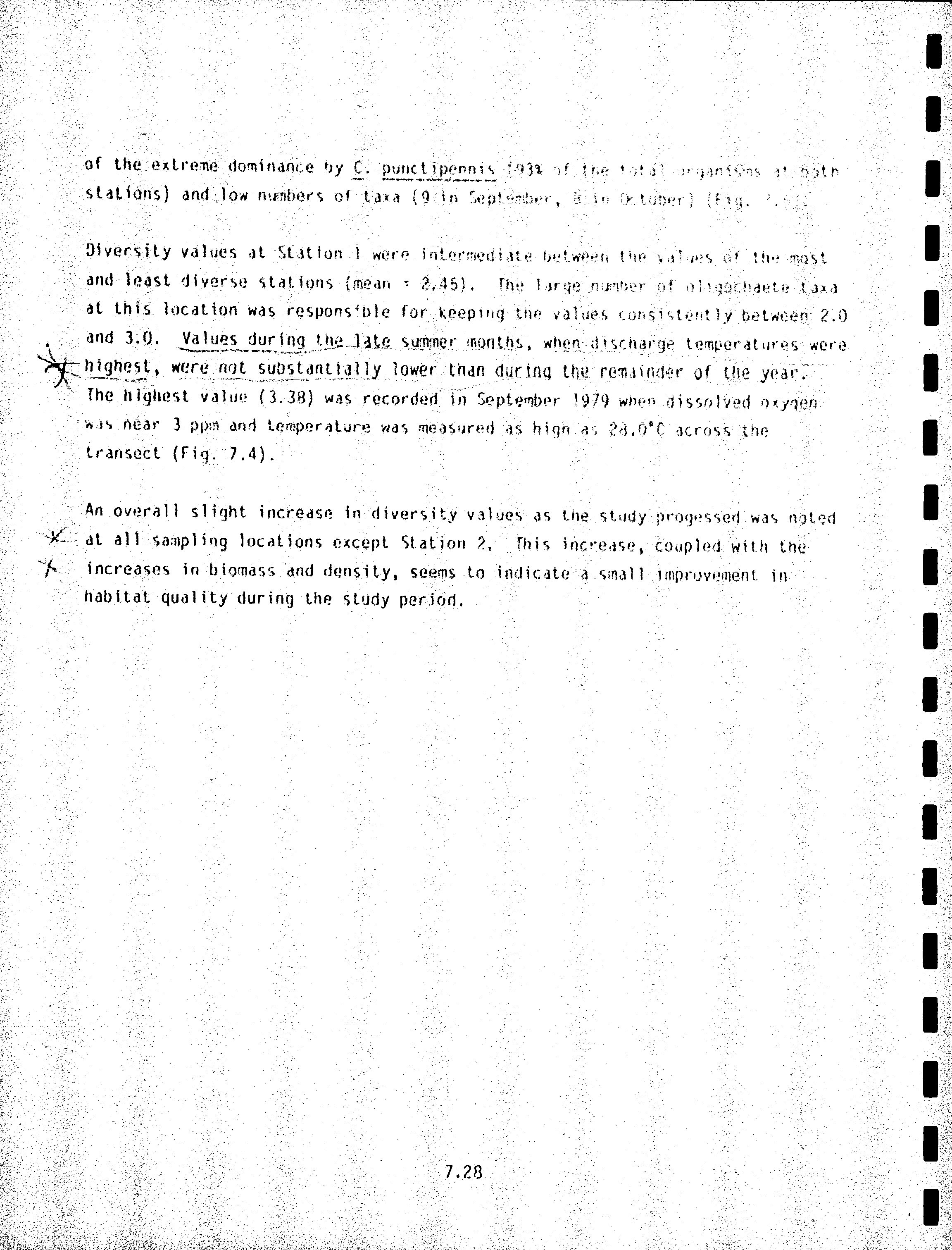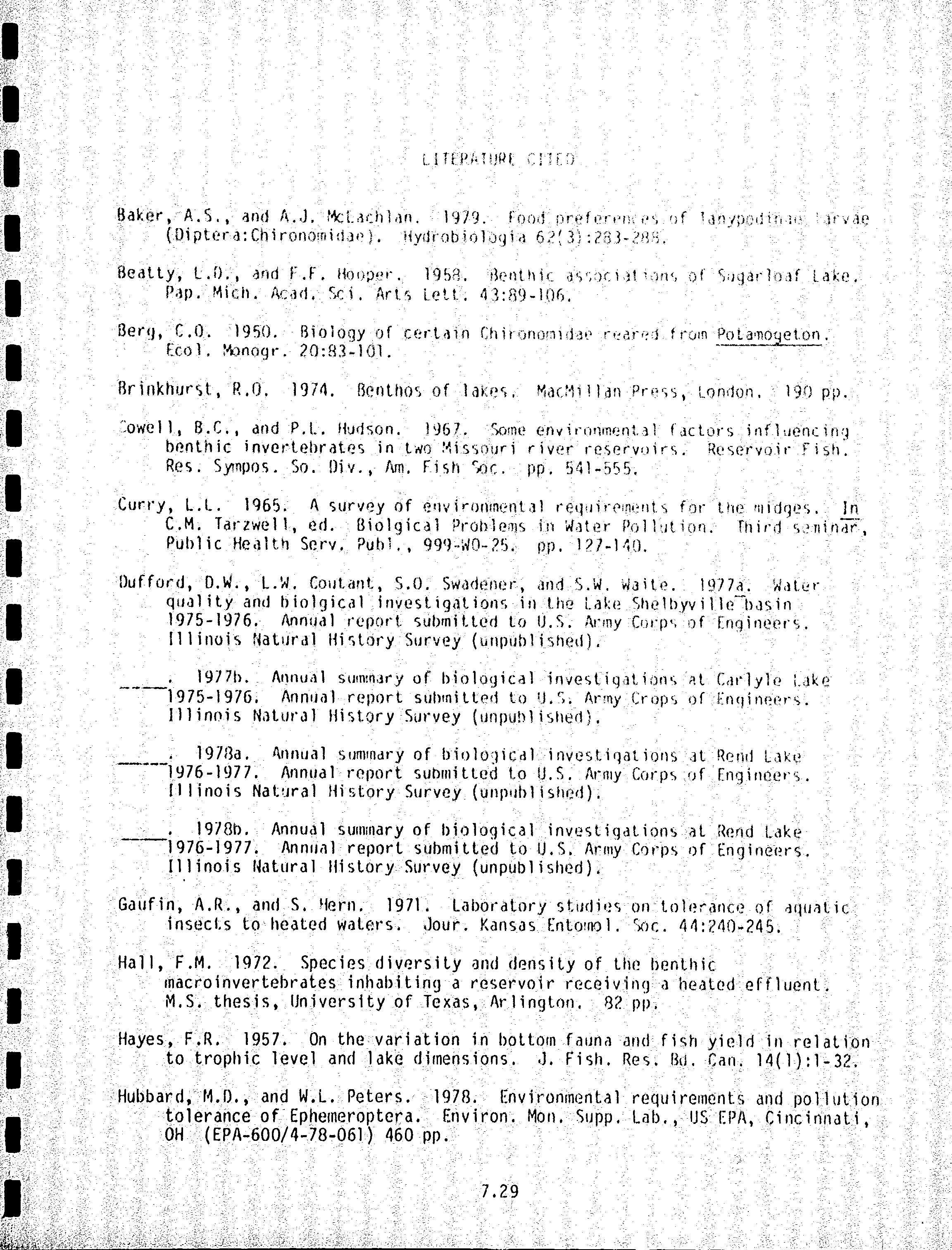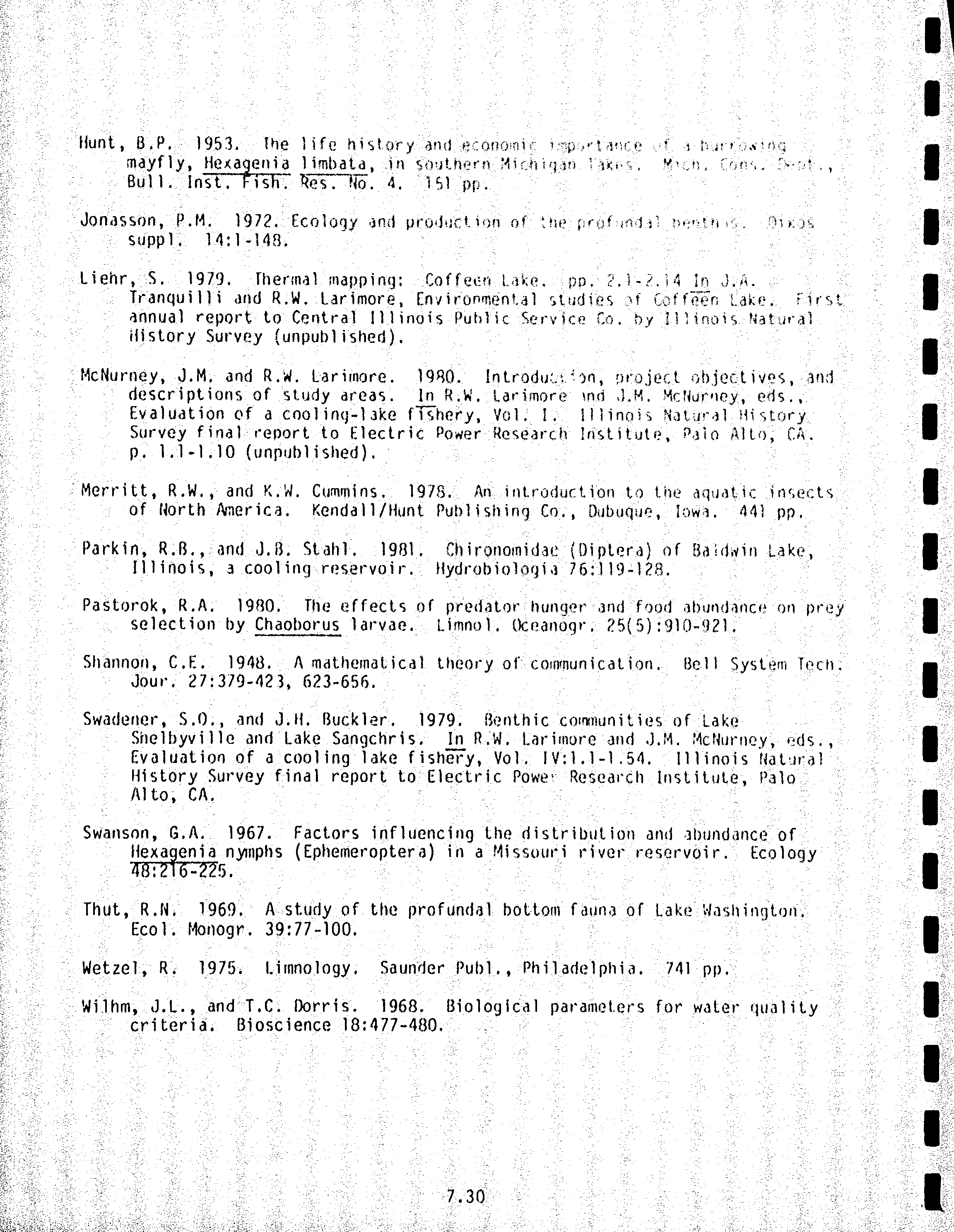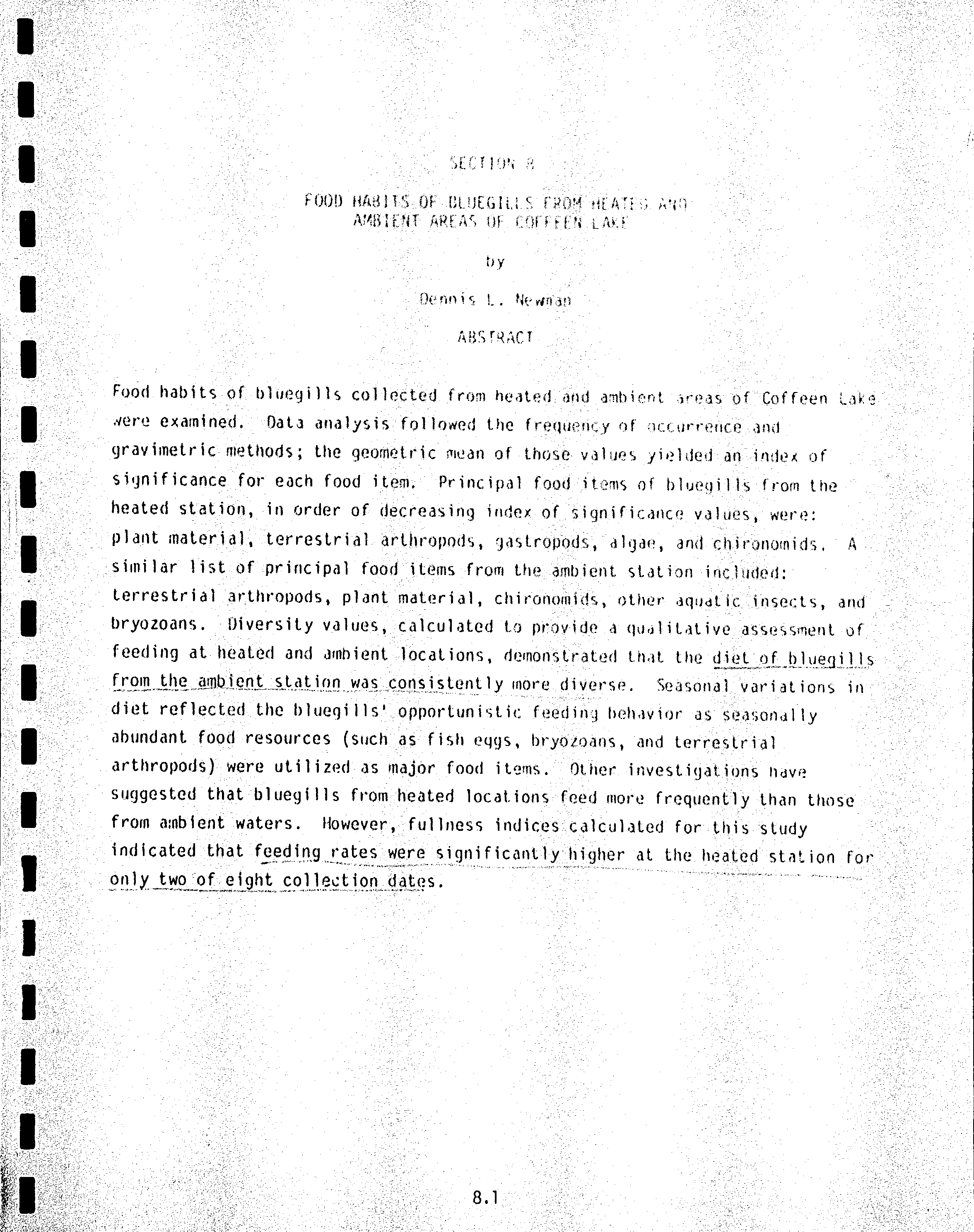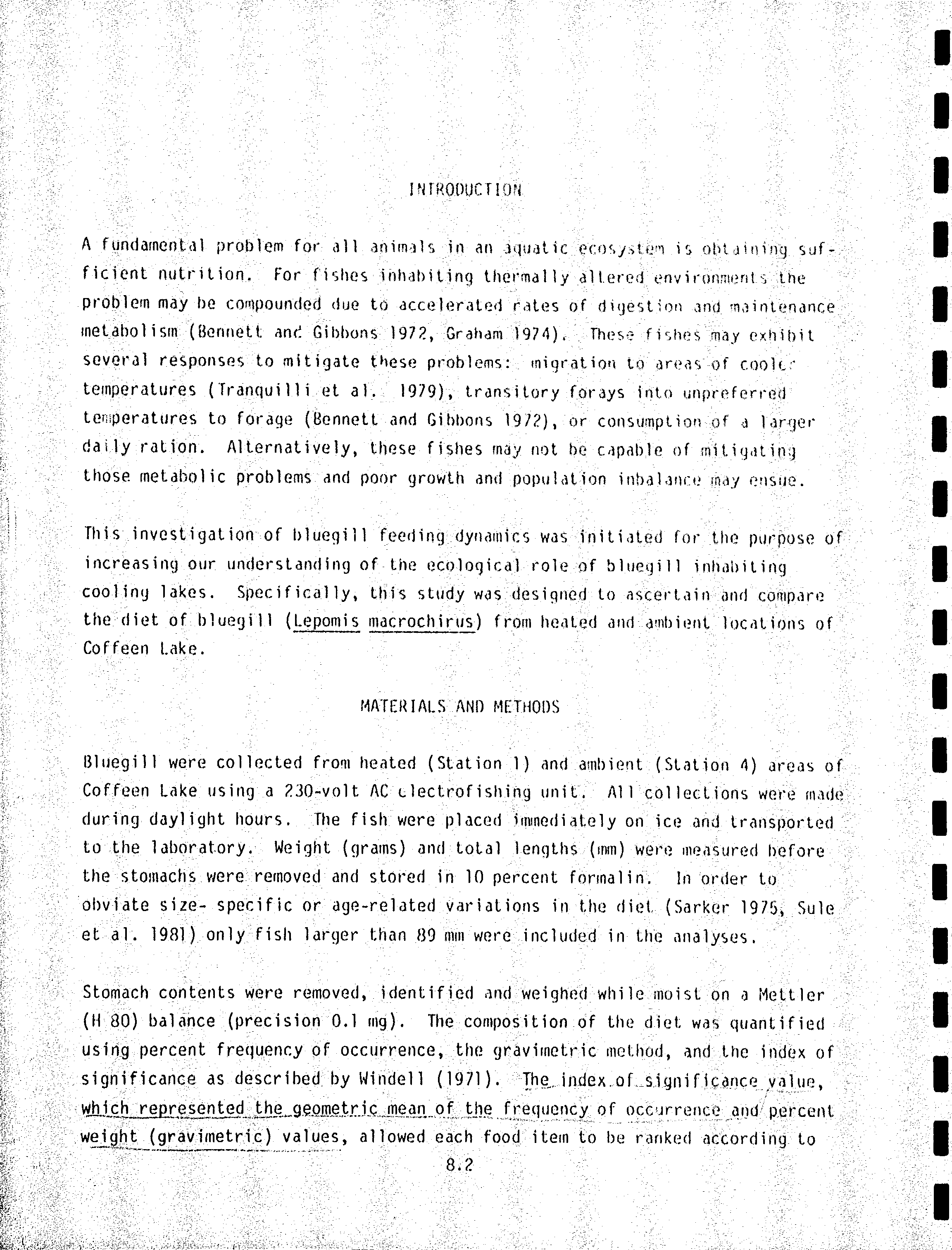-',.-'l
:::1,'.''
::
:
:::
'.
!p.grig:
9iversi!I
I
The
objectives
of
this
analysis
were
to determine:
ii
)
*h,:ther
the
rrr)vprntril
rf
COOling
waters
promOtes
d
Constancy
Of spectes dire
rs
r
ty
rn
ilrc
o;ten-itdter
regions
of
the cool ing
logp,
and
(2)
whr:ther
diichir-rJe Hdter
tem;ierdIrres
anil
associated
conditions
during
late
sunmer
reduce
diver*i-y
rlurirrq
Lrrlt
period.
0i
vers
ity rtata
f rom Year
I
ranged
f
rom a low
of
.'1.46
nt
Srat
ion
j
rn
0ecember
1978
to
3,ll
ot
Station
4
in
June
1979;
the
widest
range
of
values
generally
occrrrred
at
those
two
stations
throuqhout Year
I
{Tab'le
6.3).
The
overdll
rrrean
diversities
in Year
I
of all
stations
each
month ranged
frcrn
l."il
...
'.67
with
an
average
of
2.11.
itonthly
means
of
coolino
loop
stations
ranqed
from
l.65
to
2.8
with
a
mean
of 2.15. For
Stations
3
dnd
4
combined,
I,ne
range
was
sli3htly
greater
at l.l0
to 2.83.
An
analysis
of sequential
trends in
tne
coolino loop
each
month in
Year I
showed
that,
with
the
exceptions
of
llovemher
and
June,
populations
in
the warmest
regions
of the
loop
(the rJischarge
and Station
!) nad
the highest
diversity
values.
In
general,
however,
there hrere
no
easily distin-
guishable
month-to-mont.h
trends
of ei
ther
constdncy
or
increases
arrd
rJec
|
-neq
in
species diversity
in the direction
of water
flow.
A
comnarison
cf
mean
diver-
sity of
stations 3
and
4
and
the
cooling
stations showerJ'that
mean cJiversit.ies
were
general
ly
oreater
at
stations
clirectly receiving
thermal
efflgents.
.
r
:'
j"'
'
In
Year
2,
species
diversities ranged
from
0,2?-
at
Stotion
2
in
January
l9B0
to
3,26
at Station I in
Jrrne
1980,
Lakewide mean
diversities
eoch
rnonth
r.rnged
from 0.50
to ?,61 in Year ?;
stations
4
and ?
had the hiqhest
and
lowest
annual
meanr
respectively. A
comparison
of
the mean divelsity,
ofrstations
3 and
4 with
that
of the cooling loop
stations
in Year
?
showed
that'locations
closest
to the
discharge had
the
highest diversity
in August
and
September,
when water
tempera-
tures were highest.
Apparently,
h!gh rlater
temperatures were
less
detrimentol
than
would
be
expected according
to the
literature
(Pennak
19lB). Therefore,
loc.at!-on.s-!ayj.ng
later
temperatures
exceeding
30'C
(which
is
a
lethal
level
for
rnost
zooplankton
g-ccordf
ng to
Pennak
(19i8))
were able to
support
viable
,!:'l-
*
-t
-
.
-'*-.
,zoqp,la1kto1
cormulities
,in.terms
of
richness
of spacies:.,
It
is
postulated
that
,,i
targe
portion
of
the, late'.Sumlner
community
was
residing
below
the thermal
'plume,
(Section
2),
particularrly
in deeper
regions
upstream
of the dam,
where
I
I
I
I
I
I
T
"
"l'
..,
r:.,
,l
'.i
,,.I
6.10
r\J
c
(1
o
+J
.J
a/l
E
g
,t|
(lJ
ttt
L
,\t
(J
E
0.,
-v
(l
c
OJ
\)
(J
c
f<
aJ]
o',
lci
€\.
.
Gt
{\,
ot
(c
.:t
rc'
{f
f)
o
qt
ri
F!
a
H
(f)
O
{\t
ca
(v
(\,
\.o
c1
C\l
c'l
fr\
'\;
<t
o'
O.\
Cv
\9
GJ
co
i7)
R
o\
O
(o
!t
rt
rc}
(o
(\J
(o
(\,
C\J
c'\
(v
ro
(\J
Ctt
\rt
r€|
cll
O
o:
(n
cv
f')
(o
f')
(v
c
1
c)
r'-)
.it
J
@
<f
cv
(\..,
r{
(\J
rn
<t
c\J
O!
t\
o
(fr
9!
.1
I
qr
|"\
c'.l
I
N
E
LU
(\J
cr..
(\J
<t
6J
t\
rs'
cv
C\J
r/)
G;
a7)
?
(\,
r\
rt
d
a
(o
Ot
.-r
(\,
c)
O.;
rt)
c\t
N
('r
r4
f\J
-1
c
a.i
(\i
(r.l
@
f\J
t\
G;
ct
G.l
c\,
AJ
6J
4
(v
(\,
a\
-1
o
ri
(o
(f,
$J
@
(v
ro
4
(v
d
(\,
o
(o
N
a
f\,
a?)
(\J
c)
c9
(\J
(\,
cv
<l
7<
C\J
o\
cv
(o
ro
a'1
N
.{
Ol
(\,
N,
C\J
F{
Cv
tJ)
r.o
F<
gr
or
I
r\
coOl
I
E
UJ
El
sl
-l
j
'?
:
iF
1.,
lr!
t
O
.:
@
Or
a4
(u
c
5
'?
E
c'l
o
L
t
P
@
F\
O!
>1
F)
3l
c,
-x
rtt
J
(l'
c
(u
$-
$-
o
C).
c
c
1)
o
.v
g
r!
P
O..
o
o
l+,
o
(l):,
t
|!
,|,
>.
t^
L
qr:
o.
(v'
rO:'
o'..
4lri
|!':r
F ...
E
ql
vril'Crt
F
(U
I
C
I
O
FE
''?{
.F
t)
G
CFO,
,rJ
O
()
rd
tr+JC
L(u
'o
il,
(UJ
(u00
(u4r
>'o
=(JJ
:
!f(/tco
o-j
.ta
Qrt
c
rt
.
rcro
.Fl
,F,p
@
C-
A
g€
E
L C
i!
o o
d
o.o
o
(l,
o
o
Gr.rJ
>
^t
o
=
(JJ
Evtcrt
o=
6.
11
':
stratif ication
yts
evirie*t,'lince
the
entire
watr-.r
csluqin,i{is
rarnpled
.in
lhese
aredsr
the
high
divergity
nray
have
prevailed
regaritlass
of
the
pirsencc
of
t.he
Harmwdter
layer.
There
Here
very
fer:instances
in
ei[her
gr"adually
increased
or" decreased
in
the
loop;
in
most
instances
the data
were
annua
I d i vers
i ty
of
zoop I
ank ton
corrnun
I
and Year
2
(1.95)
yas
within
the range
a
3-year mean
for
Lake
Sangchris
(2.13)
Lake
Shelbyville
(lJaite
1979a).
ABUI{DANCT
OF
I-|AJOR
ZOOPLAI{KIOI{
GROUPS
study
year
where
spec i e:l d
i
ver
s
i
ty
direction
of
rater
flow
in
tlre cooling
extrenely var
i
able.
0vera l
l
,
the
mean
ties in
Coffeen Lake for.
Year I
(2.11)
of variation
expected
and was
simi
lar
to
but
lower
than
the
2.27
computed
for
A
fami
liar
characteristic
of freshyater
rooplankton is
the
extensive variabi
I ity
of orgdnisn density,
both
sedsonally
and spdtidlly. Typical
curves
of seasonal
abundance in
most
temperate lakes
consist
of a late
spring
pulse;
a smaller
pop-
ulation
during
late
surrmer;
d second,
but less
pronounced
pulse
in
autumn; fol-
lowed
by
a
reduced
population
in
winter. In
Coffeen Lake, it
was
rluestionecJ
whether the
physicochernical
parameters
associated
with heated
effluents
rniqht
alter
or
produce
atypical
trends in
the
seasonal
abundanc€ of rotifers,
clado-
cerans, and
ccpepods.
Eqlirrrq
The
absolute
abundance of
rotifers
in
Year I
was
monocyclic
at
all
stations in
mid-sunmer.
Front
that
period,
numbers
gradually
decreased
to
winter-tirne
lows
of
approximately
1,000
individuals r-3 in
the
cooling
loop
and
20
times that
number at
Station 4. In FebruarJ,
populations
quickly
recovered
and
gradually
increased
from
301000
to
50,000
organisms,n-3 in
April; in l4ay,
however,
fish
predation,
species succession and the
complete shutdown of units I
and
2
at
the Coffeen
Generratin-g Station
(Fig.
l.l)
probably
accounted for
the decrease
in
abundance.
6.12
I
:.-l='
-l
.l
'l
:'
'l
I
,,1
'
:i
I
i
:ii
Jl
-l
.'l
There tere fetr
trcndr
in
Year
I
regorrJinq
lhifts
in rct!fer
abundonce
in
'rhe,.
cooling
loop
each
n
nth.
Rotifer
numbers vrsre
variahle
fron
thc
iiisrharqe
lo',
intake;
numbers
at the
coolinq
loop
sLations, howeverr
wcre
eene,'ally
nnre
than
those at'stations 3
anrj 4
frorn May
through
August,
0ur'ing
Year
l,
ro[ifer
i
'
densities in
Coffeen
Lake
rere invcrsely
proportional
to
the distance
from
the
'
discharge
canal. Station 4
favored
the
rieveloprnenl
of
more
littoral
species,,,
many
of,
which
attained
relative'ly
high
rleosities
(?5,000
to 140,000
m-31
,
'
ln
terms of
relative
abundance, rotifers
lakewide in Year I
constituted
75
to.
9BI
of tota I zoop I
ankton
numbers
in Ju ly;
irr
Novemlrer through January,
that
fraction,
wds
reduced
to between I
and
BOX
in
the
cooling
loop
and 33 to 94{
:
at stat'ions 3
anrJ
4
{Iable
6.4), The
annual
mean
percentdge
of
rotifers
for'
each
station
in
Year
i
progressively
increased
in
the dlrection
of
water
flowr
from
4lX
at the discharge to 57I
at
the
intake,
with
6i and
77fl, respectively,,
at
Stations 3
and
4.
'
t{hile rrotifer densities increased
progressively
with
:
distance from the discharge, the fraction of Lotal zooplankton tha't
constituiecJ
this
group
was
also
larger,
'
It
is
apparent that with
in
the cormuni ty structure
at
'various
po'ints
f
rorn
the
discharge,
rotifers
had
relatively less
tolerance
of either
discharge tempera-
tures'or
current
velocities,
both
of which
decrease at
points
downstream
(s'ee.
Section 2).
''
a-
.
.
:
-
During
Year
2,
the largest
lakewide
pulse
of
rotifers
occurred again
in
July
(45,000
to
145,000
organisms
m-3).
The
total density
then
gradually
'.,,
decreased
to an early winter
low
of
0
organisms at all
stations
except
Station
4,
As.winter
pr^ogressed, populations
quickly
recovered,
and
densjties increased
at all stations
through spring.
A second
major
pulse
was detected in l4ay.
This
trend
t1as
similar
to that
of
Year l,
except
the
sprinq
pulse
in Year
2 occurr.ed
I
rnonth I ater.
:
'
-",,
.i,'
For the
period
September to
0ecember
1979, densities
at
Station,4
exceeded
those
of
the
cooling loop
stations
by
l.t
to
7.6
tirnes.
A,
jgJgg-t-qed--tglY.gl
l-,
!pt4{=!ggiclt-
Oifferlqc-sr-el*thLJake
at
Station
4
were,
probabll-rr'.re
le-vqfi.b*le
fgfje-99f._lgfgglg-itJy.p.lc:l'ltll-.t-1n..
It is doubtful that'the
atypical
)y
'l
5."13
t
T
I
I
I
I
I
I
I
I
T
T
I
I
I
I
I
.a-..'ir,.,'...1:'
i,.'
.'
:
i:'::::.
: a'
ii.
',
,';:,;,t,
.
;
.,1
'
ll,.."'
Ir!!e-6.4,
Per(enttqe
relatfye
abuodrn{e
ol
t.raJor
r^Jgl6nttqa
qrosrl
i,r
tof{t:tn t.rte,
'jul_y
l9/g
ttrouqh
June
1980.
ii,
:qfs
It=s:a.-F,.*-&;.:E--]tt:J,4:@.l{fq
t7
()l
{t? 47
5
lb
,
.,49
8
!
.,
t
7
6
I
44
6
'
3
I
)7
I
!0
?l
?4
'
l0
?9 55
lt
.75
l0
3:
"4
/
16
4
..8
7t
72
It
80
,61
'5533
|
?
l0
3
,5
18 15
49
9
17
I
4
15
?
4
89815545?5762e7081s69t958
6 l2
lB
5
3
I
6
|
:I
I
6
S
6
!
I
-2
3
12
I
34
6
't
6
16
3
I
35193449.Ic?4?t13245310??
|
?
6
t?
il
5
I
?
1
6
75
3
6
76
4?
14
:6
4
,
ll
39
30
17
'lt
45
45
45
3
'8
46
.J6
3
:.
6
73 62
t?
34
2?.
28
l4
3
.{3
11
.
6
410
41
37,
l?9
YtA!
I
.
l9rS-19t9
ilearr
-
Loollnq
toopl
Rntiterc'
86
16
42 43
5
09
Cladocera
7
16
23
.'6
5
.
CopepodoI'3615g
'
ittitpl
| |
5
5
24
,30
6l
15
:Copepodld.l3SlS14l
tlqan
-tstatfons
J rnd 4
''
'
Rotlferd.
96
9l
il
J9
53 8j
St
e0
Cladqcera
3
5
8
3
I
'
,?
.
Conepodrr.266145
,tinupltl
.
J
I
,{l'
24
3
re
n
Copepodfda'126821?
0verra I I llea.n
flot
i
fera,
C I adocera
.Cope.noda
.Nrriplii
Gopenod
i da
ir';'
l,
. .
;:. .
i1l
:
ljt'
1.,'
i:,'
.
'
i:.
L.
::,
i,,:,
?iit,,",'
i:.
j:'.
, .
i':''.
:
.';:l
.
,?:'
:.
tt:;:
'
i:,t'.t
j
t::.
,
'ii
ii',
:
i1::
il'-,
!.','.
::..
I
ti,
;'.',
i't:
,,,,
'1;;,:
,
,:'
!;.il.
.
'
ii'
'
Jb
.tJ
?7
l2
33
2
9
48
8
61
84
45
ll
I
5
6:
,l
I
15
l?
?o
4227
t9
Bt
56
,81
5t
4
I
13
..l
4
?96926
37
l0
19 15 z3
ll
?
3
I
16
YIAR
2
-
l9t9-198n
lt:
f{ean
-
Coolinq
Loop'
Rotifera
87
44
13
3
:
0
17
82
Cladocera
3
4
l8
4:
5
5
I
Copepoda,
I
7
7
ll
J7 ?8
5
f{auplli
6
35
52 69 31 40 ll
Copepodida
3
l0
1l
13
28
ll
3
tteg_:
L L_l!.q_g
,
41
I7
I3
?l
Za
80
ll
3?9
1?
O
102
33lBs4
B I?
4.
4
53814
44
43
7?
60
l0
s
ll
l9
402141
6164^
6510?9
38
49
70
4l
l09l?25
Rotiferi.,:
92
Cladocera:"...
,
4
Copepoda
'
0
Naupfii,
4
Copepodida
0
q,:lsgf.*
RotifCra
88
Cl
adocera
4
Copepoda'.
I
Naupl
I
l'
5
Copepodida
?
35
?
ll
iil
ll
:-.-::--._--_
Ilncludes
Intake,
dJscharge,
and
Statlons'I
rnd 2
i
'
,
*less
fhan I
pcrcent
l
.
6.14
'l
,'l:':
r
:,1:t1:.::
a
,',:
high water
temperatures
in Coffeen
Loke during
ldLe
sunmer
of
1979
seriou:),v
,l
irnited
r-otifer
prqdqstiqn,
iince
many
of the
hiqhest densities
(99,000
lo
1
145r0{0
orgarrisns
rn'J}
r6ra
iri
th€
r€gi6n
of
iffiedidic
dischdrde
during rniC-
tn
];?F-=ii}ffiF,
In
terms of
the
highest
relative
abundance
in
Year
2,
rot'ifers
lakewide
consti-,:
tuted.72toi95tofthetota]zooplanktoncofimunityinJuly.Thefractionof
rotifers
Has
smnllest,during
0ctober
through
Dscenrber 19i9
(<20I)-
0n an annuel
.basis,the.rneanpercentageofrotifersforedchstdtionincreasedfromi4lit
the ctischarge
to
50fr
at Station
? and then
clecreasecl
gradually
to 48,46, and
4-?i
of
the intake,
Station
3,
and
Statisn
4, respectively.
An unusual
situation
oeeurred
in Hovember
1979
when
rolifer"*
constituted
0t
of
the total
eor;munity at
all sampling
locations
ereept
Station 4-
Horever,
ij."f
fr":..9J*jle.,JiltglJ
.
g[Lsjggglgmlgg]
"pgr.q!qe.t-e-rs
!^e-vedled
-no
.a-tvp.ica-]
,cqnd!tigns
dur:ins autumn
and,
thus,
n0 implication
0f th€
plagL*t_q!gf.q!l9n:
L.,-qro-*eu'-
e lad-ae:eta
,:The
abundance
0f clddocerans vtas lowest of
oll
stations
frQrn
December
through
1
llarch
of Year I,
with densities
ranging
from 17
tq 1,492 orqanisms
m'r, By
April, abundance had
gradually
increased,
averaging
appr'oximately
4,000
organ-
:'
istns'm-3
lakewidel
by
September,
densities
hid
peaked
at
10,000
organisms
n
rn-3
et
.
Station 4 to
55,000
organisms
m-3 at Station
?, 0n
a
rrnnthly
basisinYearl,.therehJerenoconsistentincreasesordeclinesinthenumbers
of
cladocerans
arqun<J
the cooling
loop, Cladoceran
densities
at
stations 3
arrd
4 were
less then those of the cooling loop
stat'ione from
May
through 0ocembor,
g!'eater
in. February,
,and
virtual
ly
ident
ical
in Janrrary
and
l{arch
through
Apri
1.
Annual
means
sf cledoc€ran abundarie€
at- eaeh.-tati6n
in
Year
i
gencFaiiy
decreased around
the
cooling loop from
discharge
to
intake,
and
likewise,
at
.stations
3
and
4.
Gladocerans constituted
a
relatively
small
percentage
of
total:zooplankton'for
'
Year ?; the
range
was
0
to
271 with
an
overal)
average
of 6I. 0n
a mean lake-
wide basis, the largest
percentages
occurred.,.in
August
1979
(16{),
February
1980
(l3t),
and June
l9B0
(1lI);
the
lowest
percentages
were
in
Ma-v l9B0
(2*).
.aa= |
6, t5
January.,l9B0
(lI),
and l,larch
l9B0
(1f,).
the.fraction
of cladocerans
at e,rch
station
on
dn dnnudi
basis
in
Year
? decreasetJ
frorn
BI
at
the discharge
to 51 at
Station
2 and the intake.
The
percenta0e
hras lower
yet
aL
Station
3,
hrrt
ilre
mean
at,:station
4'was
equivalent
to
ihat of
Station l.
.
The
lakewide
abundance
of cladocerans
in
Year:'2
was
lowesL
fr"om
llovember
through
frlarch,
compared
to Oecember
through
Flarch
in
Year i
.
I
n
January,
February, ,]nd
l*larch 1980,
al I
densities
were
less than 500 m-3
.
8y
Apri l,
abundance
increased 4-
to 100-fold
(depending
on tha
location), averaging approximately
1,550
organisms
m-3. As
in
Year l, the
peak
in
Year
2 occurred
in
September,
with
densities
ranging
from
6,000.tb 15,000'orqanisms
m-3. 0n
a
monthly basis, densities were variable around the cooling
loop.
0n an
annual
basis, the
mean abundance of cladocerans
generally
declined
frorn
the
discharge
to the
jntake,
and
stations
3 and
4,
eroctly
the
sorm
ds was
found in
Year l.
...
a^-^^^l-
uopepoda
The copepod fauna
in
Coffeen
Lake
was
the only
major zooplankton
group
to
exhibit
two
pulses
in
Year l. Nauplii,
copepodids,
and
adults
were
present
in
low
concentration
in February;
qradually
increased
to
a
peak
in
May;
decl
ined in
.JuneandJuly;andbeganincreasingjnAtrgusttoreachasecondpeakin
Novernber.
Adults
were
greatly
outnumbered
by the irnnature
sta.r;es;
in
all
but
three
collections
in
Year t,
nauplii
and copepodicl
densities
surpassed
the
mature forms
by up
to
960 times.
During individual
months
in Year
I there were
few
distinguishable
trends where
copepods
increased
or
decreasedr'around the
cooling'loop.
However,
the annual mean
of
Year I for each station showed
that,
while
the density of
mature
forms was
variable
around
the cooling
loop, the
numbers
of
nauplii
and
copepodids
were
relatively
equal.
All forms
at stations
,3
and
4 werc
present
in
virtually equivalent
densities, but their numbers were
'greatly"ieduced.(40
to
50i)
when
compared
to those of the cooling loop.
The relative
abundance
of
mature
copepods
ranged fron
721
of
the total zooplank-
,ton
in
January
1979
at
Station
I to::approximately
1X
at thc
following:
(l)
all
stations.in
July
l978,
(2)
five
stations'in
August 1978,
and
(3)
two
statjons
jn
:'septembCr',1978,.-,,The
annual
mean
relative
abundance
decreased
from
the
discharge
-l'
.:
l
I
t
t
I
I
T
I
I
I
I
f
t:.
i.
.,
r:..
a,..,, .
'
t::t
:
i':'r,
i:::..
-
'-',:;::,'
.
Y;t::,.
.:.
i:'.i:',.,
..'
1i.i..
,.
i:-';-.1 :
r,-:1!,:
..
:
!?-iL'i
'
'
Lri;';.,;';
I
I.
:
I
l.'
I'
li
6. 16
'l
:,:
I:
to the
intake,(discharge,
stat.isns
I
and
7,
intake),
and
likewise to stations
3
and 4
(13,
10, 9,
7,6,
and 3I,
respectively).
Ihe
perccntagc
of nauplij
ras
virtually
the
same
throughout
the coolinq
loop
in
Year
I
whi
le
cooepodirJs
were
variable.
In
Year
2,
nauplii
and copepodids aga!n outnumbered
their.
adult
counterparts.
All
constituents
were
present
in
very
low
densities in February,(3i-63
organisns
a.
m-J).Beginningin.|,1arch,dens1tiesbeganincreasingaodreachedthe|r.
maior
peak
in
llay.
Populations'decreased
in
June
and
July
and
pedked
again
in
S_eptember.Ther|ensityofnaupiii,copepocJids,andmatureformswasvaria|rle
around
the
cooling ]oop'each month.
'.
The relative
abundance
of
mature
copepods
ranged from
01
at
Station 2
and
Station 4
in July 1979 to 6,21
at the
discharge
!1,November.
The Year 2
annual.
mean relative
abunclance,ctecreased
pr0gressively
frorn l5I
at
t.he discharge to BX
at
both Station 2
and
the intake.
0n
a
lakewide
basis
in Year
2,
nauplii
and
.:
copepodids were:variable,
ranging from
0
to
47fl.
Annualiy,
nauplii
percentages
rere virtually constant'throughout:the
lake
(25-36X
of
total
zooplankton),
whi'le
copepodidsdecreasertfromLhedischargetoStation4.
ZOOPLANKTON
BIOMASS
Although standing crop
biomass is
presented
in
terms
of
dry
and.gtn:lry-e_..-(!g.!at
ug.lg-ttlq*o-fg:n!-Q-[r.at]er) weight, the
latter was
preferred
when tne
contents of
some samp'les
were suspected
to contain large
amounts of sjlt,
cletritus,
or
slag.
:
'
n
In
Year l, ash-free
biomass
ranged
from
13
to
2lB
mg
tn-r
with
an
overall
:
a
tneanof53mgm.3.Forthemonths.ofJulyl97Bthrough.Jan]uary1979,ash-.
free
biomass decreased
progressively
around
the
cooling
loop
(from
Station
I
to
Station
2,
etc.).
In Fellruary
and
March
1979,
the
amount.s were'virtually the
same, while
during
the
remaining
period
biomass
l{as
quite
variable. The
annual
rnean
ash-free
biomass
for each sampling station
in
Year I
ranqed from 86
mq
t6
m-3
at
the discharqe
to
40
mg
m-J
at
the
intake.
For 421l
of the
time
(months
in Year l), the
lowest
values
were
at
Station
3,
while the highest
were
recorded
at
the
discharge
(7Ot).
A
comparison of
Station 4 data
to
those
of
6.t7
i
the
cooling
was
greaterr
August)
and
(
Table 5.5).
The organic
fraction,
described
here,ts
rlercentage
orgdnic
content' was vdriahle
fron
station
to
station and
month
to month
in Year
l. The monthly means
of all
stations
ranged
from
45
lo
721,
while
the annuai mean of
each
station was
50
to
741.
For
most
col leci ions,
the
organic
f ract
ion
increased_
algqq{.-!hg_.-.qo_o-.!-Ul.g
t:qp*trfL$r*::
ffis.--{!I._d{_i1I*lj9j
iiSI;;g..
Thar
fact may
1ef
|eet_
!|e
:_t_U,
clll*!..11I1-t*r-lrd-$:-s.lqs-p-er.t-:,culates-
il!r-o.9-!999
y.!.q.-L|'*e...l"qk
within
the
discharge
canal.
loop
stations in Year I
showed that
ash-free
biomass
in
the
former
than the mean biomass
of cool
ing
Ioop
st
at
ions
in
hoth
sumner-
(l,1ay-
winter
(0ecember-February),
but
less
in
dutumn
ancJ
eorly'sprinq
2 in
Coffeen Lake, the
a:la[rlrg:gfghl
.qlj_qqp-liln1tlon
ranged from
-3
with
an
overall
lake mean
of
3i
mq
nr-3.
These
amounts
are
30X
lower
than
those
recorded,
for Year l.
However,
a
comparison
values,
(tlaite
1979a)
shows
that,,!91_f
e-e1
.!{_9'.
v3lye!
.111e:
l_ow
on
a
t
I
t
I
I
I
t
I
t
t
T
I
I
I
I
During
Year
lt
to
126
m9 m
approx imate
I
y
to
other
,lake
Observation
of
the
annual
biomass means
for each
station in
Year
2
revealed
o
gradual
decrease
of
ash-free
biomass
from
the discharge
to the intake. Collec-
tively, the nean
of
these
coo'ling
)oop stations equalled
the
overall lake mean.
From
Juty
ttrrough November,
the biomass at
Statiorr
2 was
iess than that,
at most
stations:in
the
cooling
loop.
For
the
period
Oecember
to
June,
the biomass
at
each
station
in the cooling loop
was less
than
that
at
Station
4.
The annu-al'mean
percentage
of org'inic
biomass
'increased
by
smal I
increments
frorn
38X at
the
discharge,to 541 at
the intake in Year
2, suggesting that
heavier
inorganic
particles,
held in suspension
by the turhulence
at the
discharge,
progre.ssively settled
.out
as
the current velocities decreosjd
oround
the
cOoling
loop,
-
Th.-,
qgst.-pelggleg9_9fJl
.g-go_Li.?g,._lqgp.
*alig-ll
lgp
gsgentra.!!y.
gQual to
4*e
the aveia)l
---
lake
mean
relative
scale,
but
within the
ranqe-recorggg,
!q.f
!qlt_e-S
-!-q-pgchqis
an.d
She],bV-
vi I le from 1975
----#--::'
through 1978.
li
I
,l
5.lB
'l
r"
|'.
l'6
I|
r
,rt
lc
f3
lrr
Iru
lrr
Y
tg
l,l'
,
I
!oJ
I
cr)
t4
ls
ln
li-
fc
t.
lar
lv
l.s
t,:
I
lo
tg
la
.;
lcr
lc
giH
{l)
C,
ar
a]
<t l')
t+
rO
(\J
.}r
Hc)r
d--i
trl
(\J
sr
F--
O
CO
lO
\.o
ct
or
(\J
(f
dH
01
\O
(')
CD
<t
?'.-
ff)
1.. t-
.7)
' lir
r?)
ta,
tY,
r{|
rf
st st'
C\J
(\,
.t)
<t
,\
ocl
-1
€
at).{
c\J
o
cv
H
r-'l
rq
<ttrl
<t'
<l
r<'
co
(()
rO
it
f.\(.,
(o
@fo
st
rDs
<f
O!
aa
tr}
iJ
rr)
O
l.\('l
t..
cf)
tr)
(o
ro
(tt
ro
<f tr)
(\
(o
co
ccr
@ co
lS
.{l <lr
ci
q\
'J>
rc-
aYl
s
fD
c)
tl:)
rq
<:
L')
@
Ho\
\O
h.
!O
o:
10
Hd
'..\
n
N
(tr@
OrO
it)
t.J <t
o\
(.c@
*td
ir)
Ch
ir^)
\C
Or
(.().:
lri
Fi
FI
l:l
11l
tt
li
lll
l.
F;
FI
l;l
l=l
tl
hl
t'l
ll
tl
tsi
tl
tl
tl
isi
ll
tl
l-l
i*i
H
rl
tt
isl
;<;
rl
rl
rl
r-l
iii
It
ll
tt
ti
rt
;
CO
('r
r:i
(U
g
,->
:t
g)
f,
o
L
t
+,
(r)
f\
o,
-)
P
.Y
c
l!
r:-
o
N
o)
-.Y
,U
-J
c
(U
q,
l+-
r{-
(J
o
|+-
o
q
F
o
D
c.
(J
L
E']
E
c
.P
'E
.tt
o
=
rJ)
\o
o
a
rU:
F
<J
<t
c)
.
N
(.o
Cv
frr
(\J
ta,
sf
CO
--l
(\J
d
\c
<t r-r)
st
(\J
Or
(od
\o
it
\o
O
rf)O
st
ca c'1
(o
(n
('r
r')
tJ)C)
tt)
g)
f,
|].
(n
10r\
co|f)
C!
e{
OJ
-1
@
rrt
rf,
N <r
\o
sr@
C\,
d
gr
<l
dJ
tr)
r)
ce
@l')
F{
r{
@
o
O!
F{
O
ctF{
|
cr)
.n
(r)
Or
Or
H
I
O1
r\
tt)
(\,
r\
<l
Cv
oa
trJ
oJ
co
cc}
i.c)
f'l |'r)
|\
Ol
Or
I
gJ
t\-
Or
I
e
frl
..
d
F\C)
rf
r')
<t
l
rt)
ro
€c'
(nl
,
\f,
Nr*,
.nl
6
'!l
(lr
C
Elco
oi
c
'F!
.J
|tt
col
o
.o
o
lo.r=
ot(Jt
(u!
slF
Ll
r
I
lLl
?-l
-O,D
tl
s:o.EcL
<l
to
o
'tt
d
o)
r/,
1 ooo
<l
E-JErro
tr)
tr)tn
o
c).{
e{
F{
F<
{Y)
F-{
(O
cf
t-@
--{
NJ
"{
ql
or
c
(o
c\J @sr
ol
\o
dsr
ql
ful
Fl
or
Nc\J
C\r(\,
Vll
d
?-{
@o
H
(,l
rOl
H
o
t'.*or
El
u1
.nl
v1
El
6
ol
ct'ic'llqtcol
src
.elsOElsO'Ftco
6l
Col
CcolC
le+JtO.el-.!r,Olr.J.g
+r!
c'd(uCOI
c),tt(U.rl
(3^,(U
-c!
o
!,
=
|
o
rt
=
.cl
o
{J
:E
O{
()
tn
(ul (J
tr1
oI
L)
v\
'-l
+F
(|)l
st-
'rl
<t-
3l
olrrLlrrolrl
F{
E.o
tr.l
Fl
Pd
3!
-l
TltO
I
co.gct-
rl
Eogsr-
!
co-ccr,
>!
.uofttru(l,
sl
|Uo|!.Uo,
>!
tl
(uoo
>
utl
(uoo
>
L!
(uoo,^to,orrro
Ol
=-J=(YrO
<l EJ=ctO
ol
EJET,)O
i.,,
..
:.,1-.',.,:,;.,,,
.;..-.:...,.-.-.'.....:..-..,..,'
,
.
t
.
:.'.:';,'
-
t,
(c
iV
or
GJ
F\
@
Crl
ar)
t')
!n@
aa
aa rc,
F{
d
C\J
d4
-l
n\
st ctl
r{
e{
!Q
'F-d
-{o
a1
i{
Or
--l
Oh
f\l:
N
ri
HH
:l
I
t
T
I
I
I
T
t
t
T
I
.lutDlic-a_ligns
of zosilank-lg1_g.qlg
'
In
view
of
the
overa ll
purpose
of th
is
st.udy.
a two-year.
datd
srrt cor.ls ist ing
of
monthly
observations
of the
zooplankton
corrynunity
structur-c
durinq
a
periori
of
nater
management
improvernents
*as'not
total
ly
successful.
Cons iUering
that the
ideal
situation
would
have
incluried
a minim,.rm
of l-2
years
of
data
documentinq
the
lake's
decline
and its
low,
the
concept
of
a
2-3
_year
study during
the
itnprovement
phase
woulcl
have
siqnificant rnerit,
As
it
stdnds now,
it
is
diffi-
cult to
rJistinquish
cause-and-effect
of water
treatment
improvements,
per
se,
frorn
expected
differences
attributable
to
rratural
year-to-year
variability,
:
llowever,
despite
this
drawback,
it
i_s
judged
that
zooplankton
jjr.-c-oj.r:un
_Lg!.-g
*ruL94irq.-L9qkr9--ry9quq!.iyg-q!!l-.J-i$-!-eieryi!F_!!{ilc9t
!e1ps1'qtq1e
::ga_:lt
| :Il9l.l.:_3nj"
gL$
t]jl
!e
!
tr
ch
ern
I
s
!1r.
In
addition
to'the
monthly
collections
of
zooplankton
in
Coffeen
Lake,
efforts
were
directed
toward
several
specific
ecoloqical
questions
that relate
to
power
pIant
effects
on these
organisms.:
LTPIODORA
:
;,6.20
.l
Recent
environmental
studies
of
electric
power.coolinq
lakes
in
centrai
I
llinois
(l,aite
1979a,
lgTgb',1980)
indicated
a notable
paucity
of
the
cladoceran
zoo-
plankter,
Leptodora
(Fig.
6.1).
Because
this genus
has
been
colleclgd
(l)
in.
large
numbers frqn
other
non-cooling
lakes
in I I
linois
(Shelbyvi
I lefCarlyle,
and
Rend)
and
(2)
from
lakes
and
reservcrirs
in
the
northern
l.lnited
Stutur'(n.*
records
are being
reported
from
Kansas
(Prophet
l97B),
0klahoma
and Texas
i,,0,,
|g7g)J,itwashypothesizedthatenvironmentalconc|itionsspecificto.coo]inq
lakes'
were
detr:imental
for
leptodorid'biology.
That
!_gp!g!gl-e.
is
absent
from
a
lake
can be
significant,ecoiogically;
they
are, important
links in
food
web
dvnamics
Delween
prl.qg!:.Y"-endJg{iryJl$t:_P:lit.
l,lhen
presert
in
larse
densities,
they
constitute
an important
fraction
of the f.i:heriss.:-lqqd
hse
(costa
and
cummins
19721
and,
d-u{q_.tlglr.jrgdgr_o_1x-f-ps-d_lng_habits.-__t[ey
gqn
tfre:lgqls9l-11-.Pgynlg
ttll9!5-{g-9tll9jlj.lTs.
To
test
the
alrove
hypothesis,
dn
assessment
of,leptodorid
biology
consisting
of two,phases
was
,r,
t
j
T
:
I
I
I
.'::.r
'
-'to'
'.:1.:
.
I
=1:
I
, ::: :::
t,'
;:>-,
l.
l'
{r.:.!
.
l
uhdertakOn'.
lhonnlogour
to
clraprca
o( otlrrr
Chdoconf
lrood
.
chrmbct
r)vtry
Zad
.nt.an
c
lbiterrnurt
,
[thorrclc
bllkct'r
turrounrtioi
trrouth
rnrndibh
brrlr
Lcptodorr
!!1g!i
lFochol
Q
Fi9.
6.1.
Drawing
of Leptodora
kiddtii
(Focke)
(tat<en
from
costi
1967).
,:'t
6,21
:,,:
I
:'
-.
l.u
f
.:t
l-'
I.:
I.
-.
I.
I
I]
I.
:
I:
t',,
r,.
l:
I-
r.'
j.
f,
I.
I.
,,,
I':
l.:
!
l:,
I]:
I:
!,,.
l:.:
I
r'.
.:
r,:
I,'
r.:.
r.,
'l
First'
a
prellminory
sdttlrrling
rLrqi{fie
was
initiaIeiJ fo'l.J
!r!rc.-.,',vhich ret)rLr-
:'
sented the
basic
morpholo{!ical
types
in
ll
I inois:
cooling
laies,
f
loirr! ci,r'rl
ral
'
dnd
water
supply reservoirs,
recreational
lakes,
etc.
Ihe intcnt herc
was tr.
determine
whether the
paucity
of
lgglo{o|3
Hds restricted
to
cooting
Ialies,
r,
This f irst
phase
was
corrpleted
withi n a z-r{eek
periorJ
in Sr,ptr:mher
l9B0
when
populations
typical
ly
peak.
The
sampl
ing
progran
consisted
of
two to
tlrree
ver"tica|replicatetowsfrombottomtosurfacewithastdndarr|5:lconica]
plankton
net
dt
two
stations in
edch bdsin.
Ancillary
profiles
of dissolved
e
water
colurnn were also'Laken
dt each
:
stat ion.
Theresultsofthesarnplingwork(Table6.6)rJirJnotsUpr,ortourhypothesi5;
that is, Leptodora
was
found
only
in three
of nine
lakes
that cJo
not
receive
heated
di
scharge
waters. These
.{ata
jujg-qs.tg{.
lfg!,.-Iosed--an...the-.one^-.Ljrne
ruPliN--ef-tqrt
!-qr-sqX--sJs-dv--1-afs,-9.rl.y-ttgmel!g!-cgqr!i!ig-ns,.9far.99lelittig
oJ
9-991-1.n9-Ffgl
p-qf-fp--(lteat-regime,
phy,l.!.qil.
entrainment.,
gtc.)
ma.y
not
he the
l:l:-3:-THllLus*!!s-se-qsllggaoj
!-qg!odg3-in.
!lrq:q.
svstclls'
rhe
Quastion
was then
changed to:
what are the
conditions
in
both
coolinq
and
rron-cool inq
lakes that disfavor
leptodorid
production
and/or reproduction?
l
Phase Two consisted
of conrluctinq
an
extensive
literature
search
for
infornration"
concerning environmental requirements,
feeding
behavior,
and reproducLion
of
lgp.lgqgra.
Most authors
agree
that
certain
abiotic
factors
o1)r)ratirrq
in
aquat.ir:
systerns cornbine
to regulate
the development
dnd reproduction
of tq.p_t-o-O-.rtl
(Cummins
et
al. 1969). Two f actors that
rnay be rnost irnportanr
in
the biotogy
of
this
oroanisrn
are
water
ternperature
and
photoperiodism
(Costa
196/).
Ihe latter
is important in controlling
the
synchrony
of
the
lratchlng
of
winter
eggs
in
the"
'spring.
The
photoperiod,
may also
work synergistical
ly
wi th
a sudrJen drop in
,gater
ternperature
in
auturnn to
stirnulate the
production
0f
,
rnale
forrns
end,
rr'iti-
rnately,
sexual
ly-derived winter eggs.
::
-
.Intheoriginalhypothesisofthis.study(thatcoolinq.|akeconditionsdjs-
f
avor
leptodorid
Ot:Ou..t]:n):
it.
was
assurned the
at.ypical
ly high
water
ternperatures,
even
in timbient
waters, in Coffeen Lake
during
late
sumrner anrJ
early
autumn
prevented
the
production
of males. During
this
period
jn
other
,,l.akes
containing
Lgplgdgfq,
those
Bopulations''
r"each
their
peak.
llowever,
,1.',,
t
l
1,,'..
I.'::
f.'..
at:
1.,.
!',:,
:.':,::
I'
ii
4
E'F
:4
a*'
tt]
+a
LC
9..r
arF
i$
t-
o,s
c
Fa
o.r
l.)
OL
6_
'q€
.:.::'
.:
.-
,
'
.:
.
a
-
,,:,
t'.i
ilt'
'I'
=f--
.JC
t_=)
*
.{'
},.:
{'.
n,
i,r:
r::.
:i
€.
_
!>
c)
.J-l
.{
rl
ir ./; s-
a':-
C'
rj
,-
(\J
{\J
(\'
(\ H
a\J
(}.
+L
fl
n.
'j
I
l
l,t
I
I
t
i
r
,
,
j.
(}
Cl
**
rJ:
C.,fr
*.€:
\ (\;
ri.a
C!
1-
{c|CC.{
q\N.r
f.
\
e.
i\
i:
t! a\J
r! f\'
^1
t\,
A;
G*
i.:
rn
c\l f'--
rJ.)
€Gn
\()|n
O<>14-Cq;.<tfiCC\',r-
rL
OOrnr!,jOgit:.rOCC,=
i
I
I
r
|
.
|
. |
|
r:
r&_1
d
r{|
F.
ir:
r$
e,J
+
-j
Gj
F
{t\
rrl
\G
rD
r.o
Oi U'a O1
F-
ci
|{o
r*.
e,
r,.
s,.
OJ
I
c
t.
c
E
r-*'(J
4S
--
a
Lv
(l'
*2
,E
3
''l
t
r(}
dl
.o!
-
(tr
L'i
At-
.co
(u(J
Eo
tt
.,
r
La:
fa{,
€,(u
u
,t'
g!,
tEtg
,v
Li_
pl5ol
d
ol
l''
elE
arlq,
Jlu
(J
l'-
e.-
L(p
-
v,
It
o,
FA
O.
!t
t6
E3
yr
ol
(,01
(l)
.trl
Ll
r.ol
d +,
I
-el
(Ul
vt
Jl
o(u
gL
.
,Fa,
*s
F=
('}(l,
a
FIJ
.4
g*u
c'.F
€r/r
ttcu
,
V1'F
X
.F,
.0
Jl.-
io,
.(O
'
pa
Ar'
':
D'
E:
.*
''l
g:l
o)
iJ:
-
f*t
q
g?
.t
tJ")
.ra
g"
ftl.
<}{}€.OEFi
+
{tOA.<<3rnC.!q
(if}(i
.!
C
d(\lit
rlcv€
vi.t
10.f
c-
\o
E
CL
CL
q,
c
Cii
)1
t
j
El
;
cri
oi
i
I
I
i
;
t
EI
1
t
{
t
I
I
I
I
I
(ul
+rl
|lti
-i
"r0
ot
a
c
E
o
tt
TJ
(J
o,
tf,
g
!,
[a
el
cn
c
o.
E
|l5
:e
I
iu
iH
fL
f
!c
lo
ls
'l
il
',i
:
:i,
-l
t,I
,l
il
/t
:+,.
rI
c)Qc>c'crc>Ac}alc,Cc)c'
@QCOCOofSttisst&€tEt4'
\
\
\\
\
a..
\.!.-
\.
"\
\'i
\
!oQ0€q\q('|C)"1
dav\d\O
oc)c)o()()ciGcl()c=€5
\\\\-\'\\\\\\\\\-\\.
OOOc.O()dH.{ddHF
o
o
q\
or ch
0t or <'r o,
or o,
or
o\
.oJ
Jtd
C*i
+-<
(r*
O
s
J
qrt
V,
{-{-.!F-;4J4t*
LorLe+--a$
qroroirJ)
.EJ=-@LJ
q.J4ErUl&JQJ-J-JJr3F(r4'.J.FJo|,!tt
z.yrJ>\4t,EtC
l:
E _ !l
LJ
-y
o
(lJ
'ug(uo
go4rtrcce-c
tz1
OO>
c
Ot*J'-,-
1 tvt
.)
O.C
>
4'
t
(u.q)
a,C(u(u€O,-EU1llrp.-0J
.x,e8
tF
e
t6
J
4
Qt
I
ar
(u
r.!!
L
{!rrr
C
t:Frts
.o
<}'!
Q.ll'
{
J(JJJZUl(JtrVro(JcDJ
l,
:'
I
J
u
,tt
J
6.23
a::a':::it
::,:::::
.].:
..:::
.:
:
)-,.1
:
T
I
I
I
I
I
T
T
T
I
t
I
t
I
T
I
I
I
I
'::
'
,:
.1
.
Leolodor_q
cin
rdre
i-r
!ury
r
vr..
charges 0f 30'C
dnd dbsYe
rt
ent
ire
Fopu
!
at
ion
bef*rp
rpEl
H,f lSf
f.r$pfr5!,1r;;r,
a,l..t;;1t
.''i'
.
:'1,,1t;,,;
iii
n
ri:i-
d}t{eert
;3i(r3 f,ur:;r-T
:4iri
',,J1t1i,'r
r':.;.=':.1
+t'-:rrtt'::t
'1-ari,:
iq6;
3r #!lltrrr'
{-}C{i.,
t.':.;'.1
1.,r,
"'\t\'
i.1.
,F'.1i.
Ttre'f;Ct
that
!B!!q!lgg!
rf id
not
nFpedr
ro
{rr'{.r
nal{ .;! !-ti{i
f!{:==iiril irr'r
i.li:*q
t,n{,
litq,-'1!
'ff
aai
iur*
*1.
thesd,.organit[E
ril.hisr
the
bloti{-ahiotic
!Lrur-Lurr:
g{
!dtF,,ysf{:tl.;.
ln
totn-,
narv, H!!L.rAl-.,ortSlI.E"!1y..
ltrquglt
to
be
an dncmriy
in
the
rlce
urrcnce
of
tgp-to,-
!|-org
difggtl,t,
-t:-n-teg-la-.g.g9.!l!g
lqhg
{or'ditions
il
nor
consrderec
a
much
qxrrr
co|:q'!-qL-
phenornenon
rhtch
over
laps
iianJ
dif
f
erenl
lypef
of
a0uai
iq
qr.{).,ysir^'ns.
B05l,ll
liA
,
Res0'lts
of
both
Year
I and
Year
7.
studres
of
foffepn Lake
ghored
dn
unssually.,,
lo*ioccurrence of
a
small-trodied cladoceran,
!g;ggl;
these
tlenrls
were
ir,"er-
preted
as significant
in light
of,rntir
occurrenee
in
0lher
lateq.
Quest!on::'.:.
0o cooling
lake
characterrgtrcs,
suclr
as
increased
temnerdtures and
entralnrnent.
reslrict
lgJrnUg
prorJuct
ion?
One.,possibi
lity
is,"that
temperalure and
entrainmEnt
indeerJ
oc./!rn
th0 dyna;pitg.
,
of
bosminid
populat
ions,
but
probahly
at a
cnrynu4i
ty
level. llowever. i
n L ak+
S.rngchrls,
Bosmlna
occuffed
lakenide for nearly tlre entire
year-
{tJaite
l979ai.
One
other
possibitity
is
that
some
water
chemtstr.y
parameter
limiled
their
production
in
eoffeerr
l.ake.
The
pH
rdnqe
in
Coffnen
Lake
was
similar
Lo
[hat at
Lake
Sangchr
is
and
{.!-r:olved
oxygeo
.levets
nere,,wel
l aboye
fhoser.require..{
-fqi-,:
t-g.Lt_?-o-_o1llA*lqfs.:
UnusuaIty
hiqh
levels
of
tota]
dissolved
sq]ids,
chlorides.,
mO l,
iirtut'
iS..t
ion 3)
rnly
indeed
have
an
irnpact
on
zoop
I
ank t on
b
io
log,y, hut
tolerance
lcvels
are
not
wel
I-documenterl
in
the
I iterature.
A
iecond
hypothesls
night
be statcd
as
follows:
bosminrdt
in
eoffeen
Llke
ar.e
sub.tect
f u
heavy'predatory
pressure
by both'vertetlrates
{f
ish}'anel
invertelir'ates
6.?,4
:,,,
-.
"l=
I
i-
I',
.-
*
r:i.:
ii'l-
;1'
i
',,
,.'-
il
i.,1,
ar:
:::
i'I,,
!,,.
"tt':,
lif,
i.,1i
-.'
i,Jt
i'l
i,,t='t,
tl,
;', , :,,.,
i'I.
ti,
,
..:,,,
tI
rf
iilggbgr{:
trrrd
{;vc:?*pr:i:1
lr:g:=grr.:gr.;.
i;.133r;
,.;*:
, il='..,*.:
::;:;1;4.r-.,r...*
!ri<i
-.
{=r:i.:i.;
r;f
veftefirate
predat{l11
li'i4,s
!
1
lt,rtiolri
,-
1r\;6.,-'nrlr rr..
:.,,...,..1
.1..r
1..1
... -
,
..
,
...t
larger
hslrhirerf
s.
?nel r*i-]t
i...t1=r
'll*
=t
7',11+-t:
*=,)
.
:i;=,lti,:
1,1
;.=:.i;;
l;rri
!r-r.i= ln
biuegi
ll
rtcarchs
:q
ftf
f
cen L*iF'iireiri:-rri
ii:
:;:;*{t5i
ix+r
'?t:i:
2r?i}:.:r:.r
f
3:iii;r
mdy
bC
in(rftd1ed
f.{jrfrDf
t
t
l
i6ri
f
r;7
f
la:i*t
i|r
:..y,;,
.
\.
4t
t;
it,,.
.!
4l
:r
..
.
Iherafore'
it
is
tulptr{+.+d
lhrt ltr:
:nfi.tq-trr
:,-.,,rrr++ttt :.:l
iictnrne :n
l+,f
feei
Lake-ras tlot
dit'of
t
!y
reloteC
tc
lit).t.
t
tttl
4r.;
pf
{*r1
?s,
liiit
't
-*'*-;
F,-Dbifriy
th*
result
of
heavy
pre6Sur€
by
!nv*rr,t!:rdr-F
!if.fJa?,.r.
il :..r
6.
i,.
ttt tRA
I
r{f,rtr{
I titt IHcll0r
06
I
r-s
Asidg
f
ron
t.he
pntentiai
ohyt:r),!c,:i.,1
!
,.f
fe{
!..
ri,
"4..,1
r.
}rn.rt
;n
dcrJ,:i !r
t:,r}t
I
:n
the r*cervtng
sy:text5 {townltrettr
ir{
ir't*r,r ;}!6nr.,
,
ririt.
:-),t
!t31.
n.-.,1
ri:in.ir!;ll
i:e.r-
IUrbdtiOnS
tO
the$e
Syitefns it
lire
t.gr!,;1
rn74
rf
f
p;
r..,
+l hl:e:
r,tn
tfrn
3rhy5ir.,tl
f
OrCtS
resrrlting
f
ry1
entrainmgnt
thri;ql11., tnf,
1,t4r
t
;;r.r;plr-.
ilr;.0rirr tfr{,
,ritq,
I
Obvious
ef
f
ects xefa initiai.ly
d9s,rc
teled
;rtrr
f
i,,h
{r-.:tlt,i !
rnn,
nrui:h
i:{
!+e
cntrllntnent *cJrk
has
br:en direr:tr-ii
torarrj
1:r.:rfeliir
,:nc
fr.,rr
g+nrpi:rrq
'rrrllh$d*1.
:
oqlgs.
lt
is
also
lsi'J.red. hor{Fvqrr,
thal.
$!lr.i: tifri,,
irlrt
!itn:.ti!r lfly,}rtehrdt+1
ar,l affeeted
lry
{?nIr0in'llent.
hi;t
,nrrUrodr:!fr.Jri,5
hiyrr
'f;
!r,ir]
cds..,5
,rrel
I
utltr!
.tn
dCLifrdte
rlelrlrrninat
iOn
rlf
||n?'tdlr!.y
rg1q,.,.
ftt|t
,t!
thf
,rh.,icrr"!
1yr,,,
,1{
ih,t
c*i}-
project
iraE
to
atSless
trio
techntqires
:n
t{,rr":!
,.;1
..trFt"
.,tr,;lltcily
.1rrg
r'r,itlllr
l-
ity'for meas:rrinq
:oopl.inirton
enira
inr.'s$t
!s!hoi--q!g
Ihe f irsI
rnetltort
terLed
iln$
AIP
iadcnoitnp lrit,hri!Fh;.!ti]
],\.ty.
lhr.
de!r,rir.!
rra-
tlon
0f
llve
biomass
in
dqudtrc
erotycir3inS
has
ilri{:ri
fr"rrr,tr.Jler!
lly
thri
frrr\f.rrfi.:
of
non-l
iving,
particulate
rdetrrtus.
6ravimplrri
lechnler:e.,
iwhri;tr
gsrlr
utifli zed
in
the
biornasr,
determinalions
drseuires
€a.'!ir.]
s.,: oiten
suitable
when total
orfdn'ic cont€nt
is
reqrrired,
hut
rr:
unre!.!ohl*
for
d€tsr{ninations-+f
I lve
bfomass since
totat
lnass
contains
lon-
lirinq
or{ldnic
e
onEtituenfs
{L;nbr,r.
ll,
1973). ATP
aSSay
ian
be
An
idedl
methorJ fOr
live
broftl,s(,
pc.tlfirct{i.,
hec;uge
it
is
found
only
in
livlrtg.
celfs
and'ls dstectable
eyon in very
s+ali
irmunls.
A.?p
ls
Crtracted'in
a
'bol
ling
Tris
sOlution
and
rnjee
te4
int.o
+
lucifari-n-lr,rcif
ertse
l-
l.=
l'
ooo
'\
OOcoc
T=
l'
l-
t:
l'
!:;;r:
tt'
-:.
l-
r
r
I
l.
l_.-__*
I
Rel
a
ti ve
S'! ze
of
F----
.---"-.-;'
:-*---.-;f
Bosmi
na
Zoopl
a nk
ters
T
Flgure
6.2
Influence
of vertebrate
(flsh)
and
invertebrate
rrredators
on
ioo-
plankton
prey
populations.
Lack
of vertebrate
p"e,riiori-rouoi"io
1!rong
lnvertebrate
predition
and dominance
or'larrJer
ttu.riiun"oi"
The
reverse
leads
to dominance
of
smaller
herbivoris.
irte
forner
slIudIron
supports
the
proposed
hypg!betis
r:eqarding
qo_snrina
in
.:,.'
',
,.
'
Cof
f een,
Lake
(deri
ved f r'onr'
stensohl
t ele
;
.
:'
: :l
I
-i:
-a
I,:.
I:.i:
t,l.li,
,
I::
I.::
r..
-:
.:
-:
I:.
I.',,
1,,,
I:,',
1,,'
a::
:
I:
r:.
::::: ::
I:.:,'
io.'
!.,t,
:j:=.'
'.ji::'.:.:,:,.
[1*
(f
iref ly)
prepardtion,
where,
f
or
t'each
$ulpcillt
of
AIp
hy<!rr:lylrlr'!,
r.n'r
;lhr,1ton
of
light
is
emitted.
The
concentration
of
AfP
rn,J
r,rrnpi,]
rAn lhr,n he cnlc'rldteC
by.measuring
the intensity of
I
ight
.rith
an
,1,Ii:
pnotcinpr.er'.
fJrt.ai ]cr:
rci hods'
are dpscribed
by Patterson
,et
al.
{1970),
t{olni-l'ian5en
(19??i,
lreb[,r
i:9?3i,
'APHA
et.ral.
(1975)
and
other.,.
,'
The
proposed
use
of
the
firef
ly
0ssay
i<Jcally irould
lre
two-folrJ:
(l)
ts
rtevelop
a
method
that
closely
estimates the
degree
of enIrainment
rnortality
in
Lhe
discharge
or
other
reqions
of
the
receiving
systems,
and
(?)
t.o
rJetermino
overall
viable
biomass
fractions
of
the
standing crop
anywhere
in
Lhe
system.
The
scope'of work
for
this
rnethorjology,
which Has
teiled
clurinq
August
t9i9,
included
the fol
lowing
points.
fiepl icate
samples
of
plankton
were
col
lected'
from
both
the
intake
and
discharqe
canals with a
t{aile-0'6rarty filter
pump
(wtrictr
yields
Iow
sampler-induced
m0rtalities).
Sarnple
tirngs
yg,'s
varied so
that measurements
could
be'made
durinq
periodt
of
pumped
discharge
under tnthi,'
heated
and non-
heated
cond'itions.
In
this
way, measurements
could
lrc
marre
:
during
different
phases
of'the
plant's
operation to
dssess
s6rnponent
stress
:
parameters
(i.e.,
temperature,
mechdnierl
abrasion
and shearjng
forces).
The
final
data
could be interpretec!
hy
developing an
index in
which the
percent.
survivor.ship
would be
expressed as
the
raiio
of
ATP-discharqe
to'/rTP-intake
t
irnes l00.
After thre*:
daylight
collections'w€re
taken, the
rtata
were
founrl'to
be
extrernely
variable"and
non-repeti tive, so sampl
ing
was disconLinued.
'
fhe
'dutu
**,'e
invalid to the cxtent
that they
will not be reported here. ATP
extracted
from
.
paired
intoke
anrt non-heated
discharge sampIes was, bowever,
rnore
consistent."
than those
pairings
involving
heated
discharges.
ln the
lat-Ler.case, both
AIp
per
unit
volurp of water
and
ATP:per
unit
biomarr were
gr^eat.er in
the discharge.
These results
,led
us:
to
con:iider,,some
other
conditions
and +ssumptions.
One
inportant
assumpfion
of
the
ATP
assay
is that
concentrations
of
ATPlcell
remain
constant
from
one
individual
to anotlrur, ds
well
as
amonq species.
I
I
6.27
-..,--.
I.
I::
l
.:
-,.
I'
r-l
I,.
Iheoret
ica
I
ly,
however
!
a
relat
ionsh ip
frel'eren
AiP
aErrl b
io*Jrr,
t,:n
lrp
{rJfrs
iderrid
vdtid
only
if
physical
parameteri
af
f
ectrnU
metdb0
lrr-
rat4g
{
i.r:.,
iilii,ytr
it.r,'f:r
sd
I In
i
ty, etc.
)
are
cons
idered.
l.
T
l''
I
T
T
t
I"
l=
t
t
.
.:...:
T
l'
,
l''
..4:
l=
l=
"
l,=
:
t
,:=:,
,l
a;
:.
'l
'f
.,1
,l-
.l'
:,,,
j
::
.
il-
'l
Zoop'lankters
Here
col lected
from
both'
t.he
inlake
,aorl
4ischarge
regions
(representing
ambient
,rnrJ
heated waters) with
a
f
i
lter-purnp
appdratus
(l,laite
and
0tGrady l9B0),
which is known
to reduce
sanpl
ing- induced
nnrta
I
iLy.
The
or'ganisms-r{ere rinsed
(with
lake water) rnto
d
smdll
sieve,,
which:
was
'inynersed
in
an
aniline
blue dye
sollution
(5
g
aniline blue.l00 m1-1 rti:tiller!'
:
water). At
the
end
of
a l5-minute
irmersion
period,
Lhe sieves
willr
organisms
were
removed from
the
dye,
rinsed,
and
srlbmerged
into
hot water.
The
"heat-
killed" specimens
were then
transferred
to bottles
containing
l0I
formalin.
Optimum
temperature for
"heat
kill
ing"
was
50'C.
Temperatures
above
this level
yielded
partially
stained
indjviduals
and
i5
to 90'C temperatures
resulted
in
a
total
denaturization
of
proteint
,tru,
no
rJist
inction
between
l
ive
and
dead
organisms would be
possible.
.
Virtually
all
samples collected adjacent
to the
intake
screens cont.ained
entire-
ly unstained individuals;
these
result.s, irr
arJtJition
to
laboratory
tesLing,
indicate
no
immediate
effects
in
consuming
[he
dye.
0ften the
organisms
had the
dye
particles
in
part
or all
of their
guts.
Although
sonB
organisms
sampled
from the
rtischarge
reqiorts
were
partially
stainerl
(inrticatinrt
a
nossible
mori-
bunr!
conrJition),
most
were
either
whol
ly stainerl
or
unstained.
As
expected,
large-bodied cladocerans, copepods and
even
rotifers rver€
5[3in96,
intJicatincr
their
greater
susceptibi lity
to
entrainment mortality. Prelimindry
calculating
o-l-.1lleg4g[L,..p-]u-s*t.g!1pJgI
IofFl!-t1.
i-ndqcated
that r.*e.
than l.0X
of the
returning
:--J*'-
organisp.s-3ere
dead.
The
fact
that these
orqanisms have
short
repro-
ductive
cycles
faci
litales
tlte
recovery'of
their
popu
lation
rrumbers,in
down-
stream
waters.
These
clata
are
similar to the
estirnate
obtained
for
Lake
Sangchris
(|,laite
1979a)
.
0f
the
two methods
examined
here', tlre
dye technique
was far
superioi
in
terms
of
simplicity
of
both field
and laboratory
procedures.
Since
several
larval
fish
collected
with
the
zooplankton
were
,also
dyed,
this
methort,
with
rnorJif
icaitons,
maybea|soeffectivefortnort.1|itystrrdiesoflarvaIfish,
FI
il
::::
.
::.
:.:
. :: .:4,
6:29
.
.
:
LI
IEHATURI
CI
TTD
Ahlstrgm,
E.. H. 1940,
A revision
of
the
rotatarian
generd
!1.r!hjg-tg_1
,rn,J
PJ
atvi.qs
wi
th descr
ipt
ions
of one neil
spec
i
es
anrl two
nFJlar:i
dt
ies
,
Bu I
I
.
Amer. I{us.
t{at.
Hist.
77:143-184.
:
,
:
. 1943'.
A revision
of
the rotatarian
genus
Keratella
with
rJescriptions
of
three
new
speces and
f
ive
new varieties.
BulTl6Erl-Hus.
fiat. itist.
80:4ll-457
American'Publ
ic
Health
Associati'on,'
American
lJater
l{orks
Association,
and
lrlater,
Pol
lution
Control Federation.
1976.
Standard
methods
for
the
examination
of
water
and^wastewater,
l4th
ed.
American
Public
llealth
Association,
l{ash
i
ngton,
0.
C.
Brooks,
J.
L. 1957,
Systematics
of North
Anerican
DaphUl_a_.
Mem.
Connecticut
Acad. Arts
Sci. I3:1-180.
1959.
Cladocera,
pp.58/-656.
In l{.
T.
Edmondson,
ed.
Ward
and
.
llhipple's
Freshwater
biology,
,Znd
eil Jotrn
l{i
ley and
Sons,
In'c., New
York.
Buckler,
J.
L. lglg. Benthic
studies
of
Coffeen Lake.,
In Environmental
studies of Coffeen l..ake. First
annual report to CenTFal
tllinois
Public
.
Service Conrpany
by
lllinois
Natur.al
History
Survey,
Urbana,,
Il'linois.
Chengalath,'R.
-Syl
1977.
A list
of Rotifera
recorded from Canada
with
synonyms.
logeus Series, No.
ll,
Canadi'an
Aquatic Identification
Center,.
Hai. Mus.
Natur., Sc,i.,
0ttawa.
.
'
,,
Costa, R. R
, 1967.
Population
dynamics and ecolooy of Leptodora kinrJti i
(Fo.cke).Ph.D.dissertation,tJniv.ofPittsburgh.7T9-i.r,.-..
Costa,
R.
R.,
dnd'K.
Itl.
Cummins
,
1972. The
contribution of ,Leptodora and
other
zooplanktontothedietofvariousfish.Am.Midl.Nat.T7r2T559-564.
Cumnins,
K.
tJ.,
R. R. Costa,
R.
E.
Rowe,
G.A.Moshiri,
R. M. Scanlon,
and
R. K.
Zajdel.
1959, Ecological
.energetics
of
a
natural
population
of
the
,
l
'
predaceorrs
zooplankter,
Leptodora kindti
i
(Focke)
(Cladocera).
0ikos
20
189-223.
Edmondson, 1,1. T.
1959.
Rotifera,
pp,
420-494. Il t.l.
T.
Edmondson,
ed.
and,tJhipplels
Freshwater Eiology,
Znd
ed. Jolin
I'li
ley and Sons, lnc.,
York.
Goulden,'
C. E.
1968. The. systematics
and evolution
of
the Moinidae.
frans.
Am.
Philos.
Soc. 58(6):l-101.
Grothe,
D. H.,
and
D.
R.
Grothe. 1977. An illustrated key to
thc
planktonic
.RegionV,CentralRegionalLaboratory,Chicago,IL.::
16tifers
of the
Laurentian
Grreat
Lakes,
U.5.
Environ. Protect.. Agency,
t
I
:
I
l'-
!.
l'.
I.
!':
I
I
I
t
.l
.
t
I
l'
l'',t
r..::
Ii:;::
,
'.=.;
l,
tllard
New
:
a:a..:
:.:l
6.30
llolm-Hanse0,.0.
l!7?',
0etermination of
mrcrol:ial
nur,{rer"s
and
hiornass.
l3
Y,
l, Sorokin and'll.'
Kadota,
eds.
l-echniqurs
f,or;
thc'assessnertt
of
rnicrob
ja
l
product
i
on
and
rJecompos
i
t
i
on
in f retltwaterr
, IFP
Procrarn
!lo.
?3
.
Blackrel
I Scientific
Publ., Or.ford.
Ho'lt,
J,
R., 0. S. tlhlte,
anrJ
A.
P.
Covitch. i9iB.
0iscovr:rv
of
!-cjlggql'd
Urrdllj
(Focke)
(Crustacea:ClarJoccra)
in
0klaharna
,rnd Texas,
Southxest.
ffif. m(4):686-6s8.
Patterson,
J. H.,
P.
L. Brezonik,
anrJ
ll,
D.
Putnam.
19i0.
Measrtrement and
significance of
adenosine
triohosphate
in activated
sludge.
Inviron.
5ci.'
Iechnol.
a(7)t569-575.
Pennak,
R.
fJ.
l9iB. Freshwater Invertebrates of
the United States,
2nd
ed.
John lli
ley
and Sons, Inc.,
f{ew York.
::
,
Prophet,
C.
H. 1978. Occurrence
of
Lgltodolg
!1_01tlf
(Focke) (Crustacea:
Cladocera) in Kansas:
d new
recoid-l$'ilth*d?C-Tat.
23( I
):
l68-170.
Seepersad, 8.,
and
R; l{.
Crippen.
1978.
Use of ani
line blue for distinquishing
between
live
and
dead freshwater
zooplankton.
J.
F
ish,
Res.
Board
Can,
35: 1363-1356.
Smirnov, N. N.
Lg74.
Fauna
of
the
USSR
(Crustacea:
Chydoridae).
Acad, 5ci.
USSR.
New
Ser"ies
No.
l0l,
vol.
1
(2), (Trans
lated
fronr Russian),
lsrael
Program
of
Scientif
ic
Translati.rns,
Jerusalern,
Stenson, J.
A. 1g76,
Significance of
predator
influence
on
cornposition
of
Bosmina spp.
populations.
Limnol. 0ceanogr, 2l{6):814-821.
l,laite, S. l,J.
1979a. Zooplankton
dynomics of
Laka Sangchris
ancJ
Lake
Shelby-
ville.
In,tvaluation
of
a
cooling
lake
I'ishery,
vol.
lV.
Final report
of
the
tllif is Natural
History Survey to
the
Electr.ic
Power
Research
Insti-'
tute,
Palo.Alto,, C4,
',
.
19/9b. Zooplankton of
Coffeen
t.ake.
In J.
A.
Tranquj
I t
i
and
R.
t.l.
-._larimore,
eds.'
Environmental
studies
of
T6'f
f
een,Lake,
Section 6. First
annual
report
from
Illinois
Natural llistory
Survey to
Central
Illinois
Public
Service Company,
27
pp.
,
and
S.0'Grady.
19B0.
Description
of
a,new
suhrnersible filter-pump
-uppuratusforsamplingzooplankton.Hydrobio1ogia74:lB7-l9l.
l{eber,
C.
l.1973.
Recent developnents
in the
meastrrement
of
the
response
of
plankton
and
periphyton
to changes
in their
environment,
pp,
l19-138. In,
b.
etass,
Cd,
,tlibaisay
techniques
and environmental chemistry.
Ann Ar6dr
Sc i
ence
Pub
l:i
shers,
I
nc .
,
Ann
Arbor.
'
,
bJi
lhm,
J. 1., and
T.
C.
Dorris. 1968.
Biological
pararneters
for
water
quality
iriterii.'
t,tt:
Bioscience
lB: 477-48L.
t{i
lson,
i,l. S. 1959;:'
'
Free-l iving
Copepoda:
Calanoida,
pp.:
]TBB-794.
ln
W T.
'
Edmondson,
ed.r,,'l{ard
and
Whipple's
Freshwater:
Bjology, 2nd ed.
J6hrr I'Ji'tey.
6. 3l
-_J-_anq-1.
C. Yeatman.
1959.
Free-llving
Copepocla:
llarpacticoida,
pp.
Bl5-861.
l{
tJ,
T.
Edmondson,
ed,
llard
and
tihippie's
Freshrater
Biology,
Znd
ed.
J6fi'n t{i
ley
and
Sons, Inc.,
r{ew
york.
'Yeatman,',H..
c. 1959.
Free.livlng
copepoda:
cyclopoida,
pp.
/gF-s15.
In'u,
T,
1.,
and Son
s, I
nc .
,
l{ew
York
.
.
l,
l'
l'
..:
T
I
I
:
l'
I
t
t
i..
l'
:::.:l
.
.'.,
''
a;
't
'',ij
I
l:
I.
I.
I]
I
6.3?
j::
'a,.
t:.:-.
a'
,
.
Sf"CIiOt{
i
,
BENIUIC
lFiVtST
l64TI0l{5
AI eOrrt-[i{
Lirrii
by,
Gary
L,
l.larren"
and'
.lamr)s'H.
Buck ]er
ABS TRAC I
.,
j
:
Eighteen
Uenttric
col'lections
were
rnade
at
Coifee,r
Lake during
Lhe
study':perio,J
in
order
to
ascertain
the
effects
of
new wasLewater
Lreatnerit
fo.l
lities'onO u,o
h{:ated
discharge
upon
the
macroinvertebrate
..
cornmunity.
l4ean
total
densiLy,
I
i
orna s s-
and
.
g.UlLail-TJ-J
ol-!.uqlguc
.
grgups
.]vere.
si
m iJ
ar
.Lq
t
ho
s e
o f. La ke
s
Sangchris
r----*!;
_;j_*__^-+.-*--
and
Shelbyville_,_
Il ljtois,
howevcr,
all
ilrree
lakes are
relatively
tlnproduct
i
ve when
compare<J
to
many
othcr
I akes
in
llorLh
Aner
ica
and LhrouglrouL
the
wor"l d.
qre*h!U.qf9_g-j-lg-J.g.!
-L99tq_i1ly-gf:tebrate
raxa
were
coil
tecLed
f rorn
::
Coffeen
Lake;
three
major
taxonomic groups,
0l igochaeLa,
Chir.0nornitlac,
anrl
Chaoboridae,
dorninated
the
lake
in
total
ahunrJancc.
The
se
same
gr-oulls,,dlong
with
Epherneroptera,
dorninatecl
toLal
lliomass.
l)oqrinant
ol
igoctractes
inclu,lerl-
unjdentifiedimrnatures,Najdidae,Dero<|igitatq,Aulodrilu:pigjleji,antl
Paranais
f ric
j;
domin,rnt
ctrironomirrs
were:
JSUE11
,
lgglglanvp!:,
[blyperji
lurn,
Cryptochironomus,
and
l)rocladius.
The lone
dorninanL
cha0b0ricl
w,rs
Chaoborus
punctipennis.
Station
I was the
sampling
location
nearest
fhe heated
dischar-qe,
an,l
nis
ooun-
whelrningly
predominat'ed
by
the
ol
igochaete
taxa
listecl
atjove;r
pr.ed.ltory
rnidges
were
also
dominant
at this
location.
t'ligh
ternpcraturqs
'ald
low
ctissolverl
oxygen
Een"a-errLruU9.n:4filg*i!9--.t-tgreLJgrUlu,-9:rs.Luderi,rnany,taxa
fnorn
ilrq
gi!g!e[ge
..
d-t:ea.
The
Statjon
2 cotnrnunity
was dominaled
hy q.
lrulc'L'ipennis
ancl
consistenly
had the
lowest biomasses,,densities',
and nurnbers
of taxa
of al
I
staliorrs
throughout.thestudy.T|'9-.gI!e]9.]-YLEofun.r|a.l.,.zonc-.31ql.'q.u1n11e'l.-!I-q'ryqa.!.:
stratif
ication
preventecl
cti1e1-1ijt
1!
:l.t:y:.,?
rr91y
fre119-
sreater,,
The
qn'mnu-nTffel-e!-sfatfons-3-ilcl
/l"ilei;
tdominated'by
chirononrictae
anrJ
wer:c
typicat
I t{IRoi)uc r
t0H
Benthic
macroinvertebrate
comrnunities,
rlue
to
their
trophic
position,
dre dn
important
component
of freshwater
gc6sys!gms.
Ihe
rJensities,
biornasses,
and
taxonomic
compositions
of such
communities
are
determinecl
by
abiotic
and
bioLic
factors
imirosed
within
the
ecosystem;
therefors,
Lhsse
complexes of
organisms
are
indicative
of
the
conditions
that
have
prevailed,Juring
their
development
and
aid
in
the
assessment
of
the
water
quality
and
biological
condition
of
lakes
and
streams.
The
llenthic
investigation
at Coffeen
Lake has
been
conducterl
as a
part
of the
program
to evaluate
the
operational
effects
of
CIP's
Coffeen
power
Stalion.
The
specific
objectives
of
the
benthos
program
were:
(1)
to rJctermine
if
ilte
quality
of
the benthic
commurlity
irnproved
as
a result
of
refinements
in
wastewater
treatrnent
methods,
(2)
to
evaluate
the
effect
of
waste
heat
discharge
upon the
bentlric
comtnunity,
and
(3)
to
compare the
benthos
of Coffeen
Lake
to
that
of
two
other central
lllinois
impounttments,
Lakes Sangchris
and
Shelbyville.
.
:.:ja
,t:'r:
li
l',
f,
l.'
i:
l''
t
I
I
I
I
l,'
l'
I
t
l'
I,
:
:
t:ii
.=
li
,,,tj
l.
7.2
l.
,l-
:--
rl-
i,
,,:
,
|4ETHOSS
Alt0 !'lATtelALS
,,
.t
,
Elghteen
benthos
collections
were
obtained
from
Coffeen
Lake
tJurirrg
Llre
\tudy
period
(September
and Novernber-,
lgZB;
Jdnuary,
14arch,
Mdy,
rr;;,;'r,-OrU"ri,
september,
and
llovember,
l9/9;
January,
Morch,
l,ray,
June,
Jury, Augrst,
September,
and liovernber,
lgB0).
Each
col laction
consistert
of
40
samples;
two
rep'licate grabs
were
taken
at.each
of five
sampling
sites
along transects
at
stations,l,
2,
3, and
4
(Fig.
l.z).
samples
were
obtained
with
a
petite
ponar
dredge(surfaceareasampler|=0.o24n2|,washedinaU.S.StanrJarr|l{o'30
sieve
bucket,
and
preserved
with
l0X
formalin.
ln
the
laboratory
each sample
was
examined
separately
under
a
stereorJissecting
microscope
with
magnification
to 40X.
0rganisms
were
hand-picked'from
<Jetritus
and inorganic
mater-ial,
identified
to
the
lowest
positive
taxonomjc
le'vel utilizing
ilre
Iiterature
in
Appendi
x A7.1,
counted,
anrt
wet-weighed.
'
Raw rJata
were
.onuurted
to
numller
or."
milligramsoforganismspersqUaremeter;...
,
i
''
:
0rganisms
that
required
sl
ide-mounting
for
identification,
such
as
Chironomidae
and
0ligochaeta,
were
cl-barecl in
10%
KOH
solution
or Anman's
lactophenol
and
'Hydramount.
Identifications
were
then
nrade
using
a compound
microscope
with rnagnification
to
.|000X.
Anci I
lary
Ineasuretnents
taken
concurrently
with
benthic
col
lections
inclurJed
bottom
depth
ancl temperature
and
rJissolved
oxygen
just
above
bottom.
Measurements
taken
during,collections
from
July
l9B0
through
Novernber-
lgB0
are'
i
nc
I uded
'in
Append
i
x
A7 ,2,
,t
.'
l''
a'-:-:
::
T.
:j.:':::.Rts'jL;5At{c0I5CU55I{.l,i...
ln order to
e;tatnine
the
benthos
of
Cof
feen
LdkD
in
pr.rspect
ir,,],
deta dcsii-'iblng
the
benthic
cormunities
of two
otlrer
central
lllinots
irnptr,.in,t'nrnt.s,
r.,lkc5
Sangchni
s
and Shel
byv
i I
1e, are
;lresented
for
cornpar.at
i
ve
purposr:s
.
Ilt:
rth
l..tkrl
Sangchris
and Lake,,Shelbyvi'lle
orq.newer anci
larger
than
Coi'feen i.otle, but
are
simi
lar
in
many
key
morphometric
character istics
{
Tarrle
7, I
).
LJ,.e Sangchrig
was
created
between
1964
arrd
1966
as a source
of
cool
inq
watt:r f
or
()lnmoriwealtrr
Edison
Companyrs
coal-fired
Kirrcaid
Station.
'The
loke
is
supplicd by a
1ow-
ortlt.lr
iIroo,n
(Clear
Creeki and
has,extensive
littor,il
are,ls.
Lake thelbyville
w.ls
colnpleted in 1970
by
danuning
the
Kaskaskia
River,
The
prirnary
purpose
of
the
lake is
floocl
control,
a-
hence, the
water
levc'l is:suhject
Lo
fluctuatio1
t'hrottghout
lhe
year
(i4ctlurney
and
Lar
intore
l980)
,
Swartener
anrJ
Buck ler
(
l9/!
)
founrJ
lhe
two
lakes
to he
similar
in
nrean
biomassr
nlgirrt
rlcnsiLy,
arrrl
,na-io.
-
taxononic
gt'oUp,cornposition.
'
Table
7'l Comparison
of
major
rnorphornelr
ic
characLerisLics
of Lrkes
Coffeen,
Sangchris,
and Slrelbyvi
I
la.
l,
::l
t
l'
I
I
...
I'
t'
::
I
:'
t
l'
l'
I
Parameter
Coffeen
Lake
Lnke
Sangchris
[-a ke
.
Shelbyvi
I le
Surface
area
r'ruun-iupirt--
:
Max
irnum
depbh
Vo I ume
Surface/volurne
rat i0
Vo
I
unre deve I
opment
Shore I
i ne deve
I oprnen
t
446 h.r
5.7
m
17,7
n
27
.2
x'106m3
0.16
rn-i
0,97
10.6
876
h a.'.
4.6 m
',
13,7
rn
37. 4
x
'l06rn3
0.2?n-l
l
.08
14
.2
4, 490
h <l
,r'
'
4.9
rn',
.
,
l9.B
nr'
267.0 x
l06qr3
,r
0, I
7nr-1.
0.75'
lt.7
l'
QJrg_lg$.Igd_"e_klgl.IgTojryg[g.[fef*!:ju
were
ccllecred fronr
Cof
feen
Lake
over
!.
the
course
of
the
two-year
strrdy; tlte
nurrtber of
taxa
Col
lectccl
rluring
a sirrgle
sampling
period
ranged
from
26 in
January
1979
to
56
in
Hay
1980.
Ourirrg'the
two-year
(1976-1977
)
study.
of
Lakes Sangchri's and
She'lhyv'il
le,
BB and
/3 t,oxa,
respectively,
were
collected
wit.h
r:anges
of 29,t0
48
taxa
f
ound
al
l.ake
,.
'
Sangchris and 24
to
44
taxa
at l-ake Shelbyville
(SwarJener
arrtl
Bircklgr
lg79).
The
tota! number
of
taxa'present
at.Coffeen'Lake
appears
muclr
larger th4n
llre
7.4
.:l
t,ol,al
taxd
at
Lakrls
5anqrhr-is
.:nd
Shtll:!";i!lr.;
hirwi,,.,_,r.,
fr:oin
tlre
latter
trri
lal.es'rrere
fi$t i{iefttrf
ierJ
r}n!i
t,ir{i
separate
oligochaetc
tax.r
wer.e
irJqrr-rt
if
ir:d f
r.oin
i.r1
f
1...1,1,
a{tditional
tar.a
ttre
total
at
cor'f
er:n
Lakr. | f,1'!
!
.,{itrrrri
Sangchris
and
ihelbyvi
l lc.
:; I
t:;i-:r:1r,.:Cl
ir,;
i'-l
lr:if
ed
':
,-l,;,r,r'l
trr'a.|,
.
*.i,',
il
-.
1i.il
.
',{'i
1,,,;,r1
!
tl."\'.j
t.l:1,
.;11
,gr'
ll,Jl.*r:,in
i..lhi,i
I
l-
l'
T
l'
l'
t
1..:,
l',
I
l'
I
Tab_|_9-!,-2..
g.gllllij-1 t!q.rt+q
!qr-t_qJ.
rtgllsity
an,1,:tiio;.*+:r
*t
Lakar
Coifet:r.r,
Sangchris,
and
Shelbyville.
fii
was
the
cas,: xiUi
l,ot
l)
t.tyd,
vJl1ls5
f 16rn
roffeen
Lake arrpr:ar
rlrnilar
to thos*
of Lhe
other
centrdl
lllinois
lakes (arr
irnproved
rnelhod
'of
enu$erating
otigocha;tei
aecou,rre,J
f
or.
Llre
r:1q,64
rlcnsity,at
':,
Cof feen
Lake
lleing
substantial
ly irigne
r
tlran t.he
ntlrer
i.il:1s);
howev,tr,
prg
values
liSl,ed for
al I
three
lakes
rrc
quit.rt
luw
whrrr
conpdrerl
t0 Lh0tc
9f
i!,1;,g5,
(1g57)
worldwide
sturly
of
?51
I
dt;.rs
ran.linq
f
r'onr lr
i,,;h
t,i
lo.*
llrtl,JrrcL
ivi
ty
in*
lowest rneon
biornass
reporled
by
llayel
,*a5
2,36{)
rnq/rn?
f irr
ls\cc
r-rf
the
f innish
'
region.
DaLa
from
a wirle
varie'"y
of l0kc!
s,r,nrrarir0d
try rlcrzel
ilg/5i also
suppor.t
Ihe
conc.lusion
that
Ihe
benlltic.corrununily
of
t]offeenll-ake,
nppe,lri
to
bc,
not
highly
prorluctive.
raltle
7.2. l4ean
toLal
bin,.Jss
,1rlt.| rJensity
of
r.he
hr-'rrlrric
COnmutlities
rlf
LakeS
Coffccn, 5art.jt.hr.is,,inrJ
She
llryv
i
I
le
.
t.ake
'{}itlrndss*
(
rng
lrn?;
0crrs i
L
y
(no./m21
Co f feen
Songchr
i
s ,
Shelbyvi
I
le
I
33q
|
3fli
l4l5
|
455
|
015
I
0Bl
'.'
Coffeen, Sangchfis,
ancl
Shelbyville'are
lrresented
n l,jgure
7.1..
At
Coffecrr
Lake,meandensityranger|from504orgdni,n''/,.'2irtJalrttaryl979to3,460
l97B to
2,776
ng/nZ
in
June l9S0
(biomdss
of
f''lollusc,l
exclurJ,:rj).
Me,rn
.:::
f":ttl.:
til biomasses
h,ere
generuity
to*ur.
during
ure
winter
morrrhn
anrl'
1,='
hi'gh€sL.iin
tlte
summerl,
a
pattern
of:'seasorral'f
luctual,ion
whi:ch
is,
unl..ike
that
::
-
*exclutles
weighl
of
,i4ollusca
:
.:
.
:'
,
Ihe
seasonol f
luctuat,ions,in rnean
l.otal
biornair
anrJ
nearr
LoIal
darrsiLy
at
Ldkes
:'.
:l
:
7r5
t:r:
::::::
::
.......
:.,,
.=a.:::
.-
:
',1
-::.'.::l
-l
''t
t,
,t'
"'
I
.
,1,
i
'l
.:
'l
l'
I
I
,l'
'l
t
''l
'l
:.:.::
-l.
-J
.,'.,t..,,
.
--ttj.i
l;
I,
/'
't
.l:
ii
jt'
Jr,
Jtt
Ji
j'
j:
i
J
|
i
:
Ii
I
il
.,1
i
i
r'
t/
\
i
,t
\
I|lt
I:
I
i
!'.
I
l',,:
t
I
I
\l-.i
\t-
\.
'\/'\
-,-t-/
'/
//
f
$Frlf
!1'
',:',:
'jtif:l$!.r':i-:-f
1;iifrl,iiift
i :'
1500.
30crJ
2500
2090
,:,
I 500
100.0
5Gg
0
4000
35r]0
Jrl00
2500
;:000
r 500
|
0G{l
500
i:::::.i:'..::::'
.'.
:
: .
.:;:a',j:
:
'-a:.'.:
='.;;;;;::,
aa.
:.:..-
'::
:.:
',
=,
::,...'..
=...r::
.
l{
r=irr:
'
F
::: .',4
,,.t.,:.-'.,
n
:1.:i:
l
N
at a:t.'
'
:::.t:,.
:
l.-:tl,
'
tl
:,:-,,,:
t
0
-'tt,'
.
'
o
:,:..,:
R
1',:.,,,:
0
:: I
n
:.,::.,'
.
fl
..':
.
l
_:t:.
)
:-.:..,
H
.:.'.
S
j,','
t
I
,,,.',:
tl
::::,:-.
:,-l-,.:
5
=n
ra
a a'.4..
i
: ,,
.:
:::'
:T**'-r--i-=1111
T*:i:**:-----T
""
--
----=----.;*-
0rl
0tc
Ftl]
ill,l3
JUril'
fiu{r
cl.
I
cti
Fl-s r)p,r
r,.Jr.i:
rr.u,f.
rlf
:
:
HCta
1
r't
,
!'lcarr'iot;rl
Blt'n,rs$
c0l-l.ffh
5]trl$!vll'Lt
Sfllrricrtn
l5
H
r_
n
lt
g
l
I
l\
H
n
5
J
H
i4
5
rl
blomass
oi.,'trirntltlc
arrd
Shelbyvllle.
,
_,.:,-.
..
'
ll
i.!\
'
;i,
Jr
ti
::
/l
tl
Ji
rt
ir
t!
.u'
\ri
'!
J
t\
;
I
t.
r ..1
.i'.,
i,,\
.-''
'\
\1
'y-
\
t
L.
I
:'i.,:
,
'.'/
..
.l',-
..
1.
I
t
I
7,1,
Jgnernl
iy
at
tlrr:ir l;;4e-s!
t'{.rtr.r.
i{:
!,+r
i
; t.,e:::e;, :'.,.:
t
,
ilr,.f{t,}f
i+n. ilepr*dir.-t.irlr
!ttr:,r
i6';.!r,;i i.\r.:
,:,.r:r,,.
.:t:.j
1
tttr.?xghaxl
tni::lrfiyi*r.,
ihf
r"'ai.(i
3i
I,r.,.r.r1rir.
1.
I
,t.
I
!ypi:.:dily
fririrr:j
r* i,trr:-;,
l.x:'g.r',
iit'
.Jri.-1 :;
j'r:
":=":
::i
a
j,,-:..
l.:.a:
',a-
t,
i.:;,
.
,
.r.
;:.'
.
:lr.',.
r.i,l!.tr.r.'l
l'
I
.ili|rr.r9e!}l:,'J,.:l}fir-|:aii{y'i|1t!i}!,..:ijliii]rr.l,i.-:}i;}.J:-!1j''i'}:!|'l'.F+:,tl..rr,..]i,.i.'1'-.
,l ltg
f
+l
I
;ri,J
C.lr.
i:r
ntllt!6r-
Hher,
'-!;ri,jr.t{rii-q1
:r5.==,
!.;r
!=.,:;.,
.r:,,
,
t_
,r.1
r
!.
.
::....:1:j,j
[Jtrf'*Asf
CCntinu{}5
f.i)
inLrrJdle
,trjriri,;
!i11, ,!irrr:r.r
*,jt
,.,
1...,.,..
lr:,
,.
11
1,-
,,,{..
.f
ligntly
{h'etfel
t?75!,
in
.J
nr,,:li!
criij,li
!,jri,
;j1.,;i-1
r,
ir}j
i:.-,:.riii:
il,;1r:!r11;,
,vir11p,'
airrrl,l
rtr.)r-,tted1!
Dt:
q,lr.\
rJre.tlflr
.,h4ri
:i
,,ijnrr,,,
in,.,
,,11,.
j,i
,{,,
r.r
irv
td{!rlf
in
ihg-
rjata
cal
larle,,t
{
rri,-r i::il
iirri
*lk{r
,,itj'.-t
f-rr:;ir,ii:iy,
1..,
1\r.:
..r1r.jL
.,.
r
rrr
ensloy*tJ
rlrJrin?
s,}{ple
pr.}cfJ.=lin{1
,
iht
6i};.r
.}\
=;,r.;{.
r!;l
.l
,,r:.!,r
ii.r!i-,:il
!
:2';i:ia;y,1
l4dtly
edt'ly
irtslar
inrrcts
,tniJ
!rr:1
ttr,'
r'
;;!lr;r1,.-11.1n!r.{,
l,;
.:,.,
i:1.,
j:,ri:i
lr;,r
Pfa)llc5',
l4{}
;)roctl(lr;r+1
.
Ihf
r,i,rl
:ri.l
,,ilrtt-1
p,Jr
i.,,rr, ,i!
i l.i.'i.
t.r.
!.,!i
.!+
r.,r
rr.riir
:
irrj
it',rl,
proDdlily
Sirrilar t'r
tlrAt
Of
,i
r-
ffiir.
r,i
l.ri,.,
f4e,ltt
;ntrntilly
bi0'n,151
anrl
rlenSit.y
til
tr,l.,
f
1i,1r,
i,|i.i,,
i,.rn,l..
tit
t.,
y..i
{fig.
/.1)
Or'; nOt.
direCtly
(6:nl),1r4lii,r
t,1
t.i111r,re
1r.,.,!r;1f
ir.,.r
j1[,,
strrrf
ies
{)r-E111'1'o4
ilt
rt
ifferent
yrilr't.
lt
i.;
;:,riil,.lri
ir.ii,i
t:,i,rr1.
,r
q{litg()nal
ti,,i-tulLions
in
iiio,n,|lc
at.
r-hc
Ihr',:t
l.]i,r,,,.
6,,r.
1.,
.1
r
t.!::;ry,,
ivhi
lt
f
lUCl
il.rt
iOnS
in
ilerrrily
at. Crrf
frtCn
L,lh,,
,jr.r..rir'r.tt1l
.;.;
.l
.,r
irr,1.r1
opposite
t.t
Lltat.
at
L,tkr.rt
S,tnlchril
an'J tirrrlhyvijl,i,
"fht'ee
rnajr)r
groupS
ot orgdnigrns,
0l
igo{:hnrlt,}
{a{italit
i{r)r'-iisj,
:-rrirlrrr.r:,ir,l<tt
i!.rui_,
rniitges),
and the
phantom
midgo,
chaoboruL
rru[|.]Ienrnq,
{lr)fliiri,lr.{irl
trrr
hcnilrii
corrynunily of
[of
feen
Laktt.
Theso
Ur0upq
accorrnl(rI
f
,rr
3[i. ],
J{.ri,
,1rrrt
iF. lt,
f'espectively,
of
the
l,oi,al
organisrnr
col
IecLerf
,
arrC 2Z,ir.
!r;,ti antl
I
l.:i1.
rcspectivc'ly,
of
tlre
toLal
biomas-<
{Fig.
7.2t.
Ihc inrtr.t
,rrilel
f
1}llr-r;:*'1rqlplsr-1
(rnayflies),
althoJgh tloL
a
dominant
gr'oup
in
t.o[,tl
rrunrf;r:r'c,,]c{(rrrr}Lr.rr!
f.rr.:rrl.9t
Of
:the
tOlal biorndss
(r
ig.
7
,?l
.
Previ
.ls
$LurJir)s
ltirvi:,
tltnwn
i.ilitq,:
.,.3rry;r
:1,1j1;r
'groups,,to
lle
domlnanL
(aceounting
for:
nearly
9A'I
ot
the
Ldt,ll rr,rnbBrs
.rnrl
,,biomass)
in several
other
ll
linois
lakes
(Duf
forrl
eI
dl.
lg//r.;nrt
lr,
,1g/$*
agcJ
b, Swadener
and Euckler
l9/9). Figures
'l
.2 anrl 7.3
cornpar-e
the
pqrcertt
,-composjLiorts'
,nedn'total
dens.itles
and
nrein
t,otaI
hiomas.i
tif
the
rnajor
gr-ii;rp{;1,
"'do,olnatlng
the berrihic
conmun ities
at
Lakes'Coffeen,
Sangchris,'anr!-tir*;btv;ljrj-
'f'lean
densities-'of
.'01isoctraera
at
Coffeen
Lakc are
nnt
.o,"n1rr.a6'le
tq ,iuuo"n,
.t'
'
..-...l:...........]]]::..:.:7,,7
l.=..
.a.
:
'
.::t,
:-'
:'
urit,;',,=
'l'
'.4
-:
:1
,,t
I
:::
-l
:.
:'
'l'
,|: .t
.;':
nl'
-'l-
tl
=:'
,::
,
",
:,'
':
t:
::::
'-
l'
.-
'
'
: 5',.'
'
'a-
.-::
.:
:-- .
j
:.'l'
-'
'.t
'
aaa
''
:.:
:
':,
-
:.:
.
t...
r:
::.:' .:
r
T'+Eai Srre;hi;r'r
'a
t-trta
t4r.
*ltrlqt
tflt
a4=.
!4
3l;i:+-+ri
l
:
!!!,
|
_r
aarr{a
a,a
.rd
c.
i
i
,.G
:
a
'-=
,,
',
ln-
::a
:l-
.:
-.:
rj.:'
-:.:'
:::.:
l=
:
;
i
:=:
l
ri€{;*
r
_
a.rEtr*
i,
.r
r,
'l
1
:
t
a
j
I
I
/
,.ttF:r$
jt
ri
i
jl
,.a
.a
j
;
:'
it,
l-1.!il
E
tt{
t.ta
rtrt
,.'1
''
*.-*\*-
t-'?l'ir.-*r,
.r1
:\
r'ri
\
'
t
'\
l
,'
,
l'.=*.-.-._,-_-=r_1,
,i
,,'1=i'1..
i
i
i.-'.
r'<..-
r.rr
,
I
"
|
;.
:
.'
-.-J
-'
L.
.-r.+-.t
q.r't
+i4a
rlli
i
.-..-q
tt
l.:::'r'
r::,.:
I:r:,=:
I.:::
l|l.:,i:
I...-
I:=
r:j
r.,,:
1,t..
I:.,':
!,..'
:::.
.
::.
r
I::::
-r.
I:::.:
t=
,ii';
..,.
-.--
:
!i./
E
ia
ia
!;
! a,
a*l
l{tara?irt
,rn,tia
?tt*ar
tlrt
rl
rl
l='l
.-l
I=l
E
G=l
-:=
{s;lt
.
,a.
t,
.:
.,
-,=.
*
i.<t_*r.
|
!r
F!gurc
,'.
J. ,t,jf ,.n!
L:r)rnpo:ilLlun
rrf
trlL,ri
ntrinorrrs ;lttrl
lrJr,rrr,t:i.s
,
t
tltt, naior
::-::t"tl:.'trou0s
r:rrl
Iecturl I
r,.n:
i
ri..r.:;
(jof
f
uerr, .i.rnqchri*.
.rn,l
SlrcLbyvilltr.
!:..::".
.:.':.
':..
-,.
.
:,:
r.,.=
.-
J:i
!{+ir:
;l..s,r++i:-
j
:!
It
I
:.,:t
.'ii
..
ri
,
,jl
r{
i.rii':
i
i
r.
;
ilr'l
[
!'!r
i't
i
:,
Xr+r:
+:i::r.;-3:.\
i'
t
',
:
r,.
'..
1r!1
.
:
i',r
:', I
|
..t.'l
"'i.,:
,
I
r
iii't
t;'
,
.[i
"
tt-
1
t
.'.i.
:
i',4r..
:
I
i
r;li
'F
-
;'l
:
-
lit
"r
=lii
-
''.:j:lii
:
-i-i-hi
:
:ir:
;
i:
''"t :
I,
i,
L
.rr{
Jrl
r
ll
I i
;--.'
a
i..
:'
:
t
,-a
i'..:.
r-r.i
:
l-t:t
'
i'-.1 if!
t--..
tit
i-.,,.
ft.r
i
i.'i
,4:
s=
lar
i(-l
i-:.:: ]!i:;
i':
t.'t
t::,\
-
ai.r5:=.
:
;.ii
"iiL
I :'
;:ie-;r:
"li!
i :f-;t=lrr-:-
...-.lri::':.;a
-
t.
Iti
,ii
i
:
iil
iiiil
i:iii
iiiii
t
i'.!:r':!it...r
: lit
i.r:i:€fd5;.r
i iI
'!Eitlir
i
'i
i lt :l:li'{fi'-.
:;j:!;:t-i-rlt3':1;
i
:i,''
t
i ii
I
i,i;i
| ,.'a
i
.,
i
i
lt:i
i,1
i-',..
i
,;'
j
'
t.
a .r't
i'.1
i.a'-,1
i
'!.
)1"\ t
i
i:illiiilr'i
li.'r;.lili
i
i
ii,ii:tiil
i'.riiF?{l
i-*;"iiiiil"
".j
!,..,.i
',:'
'
.=1
=l
=l
=,
il
;:|:
'l
::1
.i
..
fi
t
i!
::fi
;':t
'
-:l
=l
-r
=f
:;;:
-l
':.
-
.
.:
':r
1;:+:'']ri':;'
;
:;
i;"r:
.*
:
r'i1ri,rrr
!
'-
:,
i.lil
'-
,ai'''i;. -
;jtll
:,
.
,:
;,:
'1t''
r:
'
lti'
r:!
t
-i
l,:1
1'=l
t.,t
-.j
{- ii" .1
'a
:
i
iiri
i t-_.t
iuiiii
.l
i: i.:
J::il
-,.
::
jI
;::
'I
:::
-
tirll
'l
i
Ui!
'-.:'
:
:
a:;-.
.:.'
'
=1"
-i
........:
.
+t:11
rr"
:
.:
:.
,:
,'
rlenslfy
11{
.trtolBars
o{ tlre
{L1
i{)r
taxonr:rsJ;:.
riro$p$
r:oll€cterl
l,akos
Coffeen,
gangr:hr1:1
,.:,il[it
,Slrrrlbyvi
lls.
,'-.-,''-
',,-Fl.g,urc
7. 3.
Hean
-::-:,,,:',. .
'
'.f,g,orn
7 .t)
1,.
I
I
LOI*r
Sdrirp.rt'r.,
4n<,
f.ir,!i;I;r:i.
i,.:
i
t-:r,
r:,,-..-..,.
.;:
-,.a....:t
r
,.
.....:
.EethCdri
,E:tr,
,;111*61g1..,
+f
,lli,;irrfi.t,.i.!
,ir,*
-..-i.{r.!:.
.
,
..dd1.,.1
...,.
:,
*
i,rt
o''"
!.ltt9
f dr;
{[,6;ri-..ily
bri
t,-t.;i,
it.i:J
1,.;
-.,;!,IJniF5.i,
i,
rc,
I
i,,.f.,
:,,,,,.
:
:t,
indlfl{tul!
iilfl;$.
rlth{r,
ri.!.;.,..
1r.,r;,nr..
,i.;,.,.i.,,j:
:,
;
....,.,.,
ir:.,t:
tntl
n*an
lriil+g',11r'.,
?r"'tri
rt,n,.1l ti,{. ,tri,:
i.i.r'.',t,1
j.:.:ij,,,1
,..-
.i
..,,
1ri..
,;,..
,1
.
.,
at*, tnltiffE
C,:lf*i:q,*llr.t
t{*,;+ry:"1=ilar
!,:1i;..;i1-
:l
jr..
-1?;i-..".i,
*,1-,:",.i
,
r-.:r{*Ft
ir}n ril
ip-C+.:t:-.rpt
t!t-I
,r:z:.i ;ii
i=i.rlli*+:
|
:i;j,-
.. -.
-
;
t
i_
_,
.:
:,::j.
,,.
:a::= 4,,r
1i,i
l-
i!
:...
ril
lkir.aqr-tjri3,
i,hP
fphr:ta.;iptt:r4
{
tr.;rr'esin3
fri,r.1is!
4r,r'r1!:yqr1,
it
ir*t|:
lr},ri
llir.fi
jrr.ilrr\
,,q1
,-i;r,,..r,!,;!r.:.i
d,.-.{l
ir:.!ia,.!f
,."i
.t.,.
:,
,,,,1!.
,.,:i..;,.,
.,.
,.:ii:r..ritlr-,,
'tr'r"1 itltutlt l'il
i.
Fr:lt!/
Jild
iiifiper
)111..{,,.i,ri:jl
..r,il
1.;11.,rr
':,!i..
rj,i,.,
.,if,:.
jil
.lfll
l9i-':,
thr:
r-,rp.lril,i;t,
litL,l,..fi
trel,,,rl
-.lr.r.
:.l,,.,ljrilii
.ri-,:
!r;;;
ia.::t!,-
,,t,,
?-lCk
+l
i'.€lt
t!'{,lq
,f
!.
f*f
fe*ri
,LJt€,
=tI
.:r:rij.i+r.
f-ra
,,
1,r.
*i.+r:
i
iit.i;.tit...i,l,ir.
-r
!)l&r+ait,
.lt
thr:
{.ir,t"?/
lakfi
,}r,{flrrr.irttl
,.
lt!t,!-
::.(
!hr.r l.t!.?rrr
l,
!
-,..t..
ti,,t1.
..tti.t
*gie{
.
l*:irt
t,rl
+} *!
tqif
hJ{,tir
!rl:1r45
j
ti
1ii
c
i*,.,r,
;
litz
t:
t.,.,r.;j.,,1
l
.rri
..,
;
t,....
langtnrig ,1rr.J
,':ht,
l$yer
t tr
t,y
tvtr
.}lyJi
lrr,l
.
I
.
ji,
,ir,.
rlr
,n,.ri
J".,.;,
,,
,,,,
'.,
:
.-ar$s
ttfitt{
!tt t.::ii
tyFr*:li t7
ilirivr}
-irr
tttiittlri
1.1,.r:s,',1
i;rri+i11:.1
il;:1
!..r,,irii1r
l!:r:r,-.
rir:j::i
rirtl
f
r.Cr?i.i.,
!,r)ir:r
drtC.r
!rtri:lsi
,fn+
iilis
,44/
.l{r,)ijn!-
l,ir
th,,
liiilrti,r
,j..
lgtre
,r,i,
?!:
hi'-)?c!i
at Crrf
ir.rirr
1.,Jl.r:.
Alf h+u.Jh
L;!i,..
")tltrjr:liri{
rlc,;
rr,-.:i.r,.,
i
r1e,
llr:
il
'Jilclr'rrg*.
'ist
l-'rurt.?d
ltto';ta$..
+f
ol
igocirte[i:
ilnp,;!
il
r,jrr,
rr:t/
?r.ls'
iy,rr:::
'!
1s,,,
,;,r,.
At t*f
feCn
Lake lrrf.J,-i*,t,
!.h*]
,Jirrrarqe
ll*r-ir:ri
cc!lr,rlrlLJ
sr
1.r.t,!,.rr,,r. .rrr4
::,.
il.,r
{1979i
irnt
i,t,
ii}t*r;l'.f r-i
f
drinflr
f
r1ri
'r_hrr
.tr\rf-li,i!-{u
;-,rn.}!
i!la4
*,1,,
r,l
,}.r,rr,r
i
t=
COf
f
Aryn
Lnkil;
tltr'ref
rrrt,,
Cr)f
fq"elr
{.nl(e
StttiOrr
I r.r:,i.i,ivrl,J
.+;.rt,r
r,h*r.,,iJl
}r;;,llrr
2
.].:..t{hl{hr€5*lltrrtinl{r.qer.popui'rtiorrgalt<llri*,-,r.,r+f,-l.ii'].lr-hJt1t.i-..
flte
ilcan
tDl.al
rlenritrcs
cf chironornidle
at
tEkcs
cof
f
ptn.
1.!n,11rir ii,
,lr,r,
Shr.:l5yuiIic
reru alt
betrecn
45f)
anri
bbql/nr?i
r,oHevryr-,
5i4,n;,,.,
nf
i.rp,.,jnil,i?(r-Jr)
f
t l-akqs
Co(f
een
dnd
SdiljJchri\
rras
fiuch lo*cr
ilurr tir.rL
,rL
i,rr,._.
l,lrr:ilbpi
tlrr
(FirJ.
7.31, Ihiq
dif
fqrengp
Has
;rccountert
1g'"
trv
t.hr, pr{lqr.}ntr}
rtt
lhe rrir!r;r:
genus
qLtgnqru:
irr I
arr;rr
nunr)ers
(z0l
of tor-a
r
rrenrir,
,,r,i
iir'
,,
,n,u,
llio:nass)
at
Ldk€ Shelhyville.
The
sarrfi:
lenrrs
ilae
a
vory
\rrdll
t.6rrstirucrrt
rl{
the
tot.al density
and
total
biornass
dt
Ldkas
Cof f
ean
Jnd
Sdnqchr
i.,l it!
occurrence
at
Coffecn
Lake waq
quit.e
rare
(ies.,
than
l{
of
trrtal
r.lcrrrity.rnrl
biomlss).
Ctrifonomus-
are
tube-bui
ldlng
herbivore-detritivores
thit
.Jrr
-consldered
prirnary
comp0nents-0f
tlle
profrrndal
bottom
f
aun+
of
very
pr0due
t
ive,
::
.
.:.,
::
',,:
,,
.
.t,,
Z-;I0
:.:.
:::
t
,:
:
.,.,
'a,,-
:
..
,
-',
.
i,,,
,.
i'
,l
I
I
t
I
t
t
I
I
I
I
t
T
,i:
;:
-.
-.
.
:;.;;.
t-_
-.
;;;:;
il:
i:,'
'-
4):::::..:..'
irr.,
-
:
*'.: r r:-
ii!:i:-
:
Ht!'.-:':.
:
ffi:;,
Ui.:.=.,,
l-
il.=
lI'-
=l'
i:,.
,
:,.
-,,'
,
l'l''
i.
.
..
,.,''
tl''
itlinOli
!1i;1...
fii;'
r11l.+t,;i.
lii,,."r,,.i.
.,f
:
4iilrjjphi-'
1-li:r,:r
{,.1:;*1,r':.;ii',i.i
};,:
"
.r:,
,-
g,
Prf
f
tf
,!t'_,'
lfr:rfii,
t.
r.
,il
i,:i
i..1.11
1'1
,,,
-ir
.
i::
"
:
'
'.
",
l
L*
i"-ntrl
i':+t?*yriiIi=:j :1.1;."7tr:
,1
t,.:1+
I.l-.i
+!:trtnc*
!
4:
tlf,t
.1-q I
,i
i +.:l!
n+
i
r
.li
::+{ }
r
5gAli':n
1.
{},;rrrii;.
+
.}1.,t?1.,;f
ii:!:ir:r:
i
P*riin.:n4
ittrrl
:,i9,1ji
4l'=-r
r::,rr-.!
!;:il
thc
rr
igffrar,ll
r lrie
l
.
t
I
I
i
I
T
ft'
:
:i
ia.
:j
!i
tii
'l:J
;i
ir
i;-,
'.
*tf'
i.:' '
il
I
r,:j'
t"
I,
.,
'
.
rl.-'
r
,':
-,.'
1.
,:
'::
-'
j
'l
l,;,,:,.
I.::.:
ll:',
.,.
l'
:.-r*1
inr;*,$f
!iir'
t!:ri
::i.rtql
i1i-r::lrllrrl
:-,r..
I
-.r,:=.:i:,;r,.i!i...r-:
.1.
:
:.
-r
-i-..-,
{".
-,iit)i
.
ilrf fegn.
fr!,i';i7i1'tt,
,lrr.J
t,rr,
lt,y,,iil",
,t.t.
,r:t;,,r,,;1.,j
-.
.r..
,,
., :.,
ii..:
.:,.:.
l&idgntili*
j
!rrE,!"ijr€
qli:;;r-htrr'r
4:,
:iir,l:ii!.';I.,,
.r
.:,..
t.:
-.'s
'.1,,
j-.1.-..1
4,.,;,
,l;,
q'+i-t
lfq*fJ:,
.r*4.lirrr.:
iitatlr.r
i
r.ii
i r: !
?-i-?i;,=i,i-il.
,
_,:::r_f::
,
!::":*.:::*;.,
,
.r,;,i
"oLfgg|!;Ai
xt:r+
thp
r-.r..I
.-ir,'r-.r.':;
1,rl,,r:.,,1
'",':r.j;
"r,..-
,;":l'.....',
.
r..,
fhtlret11.|:!(|:rllrr!a!ltl-';;.''!:!tll.?.;l.]x.-.ij
I'ive
OII
Sf:
i$
filL,
o,:rirg?rUir:
,,r,u, r:*.irrr:
f 1.ir 1,
r!y
ia]-,
.'.,
.l
.-
1
,t:,,r:l
t;,.jr..ir+.,
.f
!Ong
ritli
:r-rdi*tttrilr,
i:i:i::i!.i;rr,
.;Fi;J
f4i)
ii
*.:.,.,-i,ti-.
.,-1r
'.iii..:
j'.i,.
l-,:,::.
..".
g*i"Ilgilf:.'
lg:Jg1:,
+rxl
.iiri::j:lgivg'9,
;z:{t;:
:.,'.r*i.':1!'r,':
:i:,,,i:;,.1,..i,
,^.:.j.=',,
'.lEti
2OOp?+{iiitilrl
*rr.l
th,:l
ia
iii'i$r
ip.i3
1rr,r,i
'-ri,',.,:,,
.
''i-r:,,
i,1-.,f
iri,}
u*_.
1..tl
;:-1r.;
I1''ii,
Pastorot
lg'1r)1
,
io.!4vg,4f:il
.t,'*
i:*.!ii.;;r-:.;',
t\t-,,,.:';
i;f
.. ;,.,:.
!r.-,
.-!r.
....
StriCtly
lierhivr:r,.-4,.tr'l!
!;;lr'ii.,
il4*rrrtt
4:;:j
.'1,3:,-1,
.,
,,r'.-'
i.,..,.
1,,,
",..
{ttt'!tindlCi!
by
I.irr:
rrJjrf
ly
S:t.-qgrrt.
?t}:r;
r!
n,
i.t?:r
r,-.
i
,r
,:..:.i.f
1i",
tt
:,.,
,
-,i
tl.
blf rvat
pril'Cnt
jCr
relA!it.=:ly
:+r+3
1
l"tr$,,:-i
,
ii
-i-
?r,;
t.,i
1)
.l1,,,.iirr:.
,i:i;i:r,
Idra
rjorTlilt.tnt
irt
tiir;n,lrq i{(:ra
ihq
T4.tt'
i:, '"i.i,-ri
i-.,:
ir:il:r
tr.
r*ltti;,]
lh.Jrrltfr(:rlr
rith
the
ij4Ceptif-rr,
t.rl
Rr_I:)/i)n. :hr!
lrrlpsii,.
ii;rr,,l,rtxr-1i-1.-yj
trr,)r1J.{:.lfji,.r.
r\
t{!i.q1]-l-1f
d.iJ!-11
'i1."[:lf.i-o.'t
,r'4rph+n-:trir
cir.r,'i;.tj.'rr!L!ir
+r,i!
].rtir.rrte,
rr.,i
,1"3-.t_i'tj.lg-t:-,!.q
!jf+
of
L.rlcl
lan,tchril
.rn1f
.5ie!irytii
I'i
i,r;i,ir::;
i-J'.":i,,t
i.{i.
,
:nii
nfdjtfr
qllf.fr:rCnCr::irt
l,trttrtlelC
rankirrq
,)-r.;!l.il
lhr; 14ri,1 l,rt.:=
i
,,
t-ir*:.tr.l:\,..;itLt
:i{
L*
gener'*
af
chir*nonida*
iihlfrygl.
ari.t
ffsgj.-o*J_g.i
r,rl'tri,,
tr.,p
i!,rr:
,ri
iakir
5he lflyvi
I le
tir.tf
OcCUrred
in
,ruch
,;:qdllt:,-
rrrjrllir:r
.,
.!L
i
.1r.t,',
i.i1 f
lc,,rr
.r,.,1
SaltgChrif. Ihe
reasons f0r
tlle
differ-errc(ji
in.lh,inrl,tni-r,,,;
ii!ro*clnui
h.l.,t-.
!rt:gf!
discussed
previou:ly.
-------t
PJ_ocladiu-s-
is
,t
c,trni,lrlrirt,,
ilrJr,:)+:rr
i)f
itut
r,trl:
s.Jtlfernily
{Ianypodinae)
as
T,rnJp,g ind
-C!gg!gypq!,'whictr
?r*re
diflitll'j
th{t
ti.}F
1.lrc,i*
abundance Jnd
tlirlrnass
at
Lakes Cof feen
aarl 5dnr,leirri:.
Prr:tlarJiu.l,'ri:Dloar.i=,l.nu
lat[er
tro
genera
at
t.ake
Shelbyvi
I
le due
Io
its
nr*f
r,r*,,.,-'-illT
prcf
urr,Jr]
habltat
(ltlerritt
and
Cunmins 197S,
Swadener
arrrJ [ir;cklr.:r.tg/9].
:i,!:'.
I
:
r.tl
ll
:::.:
.
l"
l,i
f-
I
I
I
I
I
I
I
I
t
I
I
I
l'
*
tp.
L
:t
t
=
c
G
c:
&
I
c
E
rC!
)
a
lc:
c
o.
{t
B
9l
:L
u
c
g
o
.D
t.J
lo
1.5
l.L
t*
t'-
I:G
l{.
1.8
lr.
::::.
1,..:
li:."
-'::.
r-
r.'r:
a
:l
fl
d
72
l,=
=':**Iii't;i:i
fi
.-
.t
{.iion$4cr11
-.J.)E4{{44
aa
;l
Ii
*t,t'
1-.1
il
.1
it
;il
.'
''
^1
Bi
fl,
iil
il
or 3
3l Bl
?i
E
rl;i
.
:t;l:
f,l
!i
Eifllil$il'lill
Slrl;
F[.]lJl tl
fl
r
,,
ar
+j
t3
h
{
E_1 A
*
a
h-(Jl6r-fr{.t*.r
(f
G
t'l
:l
EI
TI
:
qr
.-t
ai
gl
i, il
il
Er. Bl ;l
fl
Hf
iflillkril
j
/r
t{c\h(}Onf^,/\
a'
$\ot.r\6{.'n4
_
_
,,
(b
r/\
(!(.4--€rnnFtO/roC€4--
FF,\O!t.t
::
:,
stl
E ll
Br!
i-flHf,niflflfi
i.,,
'ci
t{
*
-"i
d'*,oi
oi
7,
.:a'
:c
X
p
{q
ri
l.t
,i!
F
ri
ll
l*
l,
'-l
,
'i;i
!!.
Et
,
{n:
,l
t
I
I
t:
l$
ls
,',i,
fa
t:
l-
l*
I
t,
i
F;
'il
"17
r.
EI
cl
:31
-:l
I
I
:l
I
l-
le
lx
t_
lf
.l
t:
t-.
l€
le
3l
"lN
a
,:
,2 ,,.
}.',:
J::
4.:
*.''
!i'
8
",,
E
F,
u
*
fi,
-.
a
t,
e
s-
.{r
4.
:
a
.t
rc
a.
I
rt
't
7
,l
:{
a-
ft'
E
(t
e
f
5
3
c
4
?g
.o
.3:,
t.l:.
rt
I
&
e.
u
tz
4
rl,
.:
l-.
o,
o'
a
.t
Q:
G:
rn:::
t-
.
,o.
.a
.o
il:
'jj
:
':
.
,':a
':
a'.
:'
'
*
c
rt
_
J
=
s
4
.t3
!
,t:
.E
a
d
.E
+
:-
,E
:E
I
.:U
trc
oe
tn
QL
o:lJ'af,
9l
ovttc
ue
t:
-c
l;
J
o5,
o
.L:
t^*
Fo
ot"
o.r.:-
(no
-6
-^
at
4"
rf: +:
{.t
r:
,aat.a
rr'i.---'---
4**
.f,:*'
O.l)ilqittt.'t?
i)
r.
{
{:
.
...}
a i
''
t- il
i\
{t
\c
ft'*
h
ts
f' F
\*
!+
:'<
*
-
{o
.-
,.t
v\Nor
/rN-
-a
a
a
a
a
eg\rOF(Oo'.9
rl,
:
:l
i'i
tt
-ti
$l€fi
,ll
"ritll
El
;lEts
ili{,'
ilgjiflilflHii:lil
{{flf'Ovagia)*f.i.
!!.r
r)€or,6q
rt-:
-rta*rl
'oFi-t{
{'r
tt
jl
':l
,ril
El
5l
-r
El E.|
El
:ljl$iHflf,flilil
aon{:
{onc}?,efvN
aa
O!Oq-!Crn
9d-
e
l^
c\ \d tt1
ao
d,
r.\.oFq{r,*-
L
"jl
Cl
;61
gtrffl
3"rl
El
gl
€l
Hf,!gllsHf,;ilf,
-Gfn-:-
.,:
..:1
.t:.
.
'l
-':-::,
G
!.
F
Ir
o
*
{,'
e
{-
c
i.
ti
r'
c
t
l.r.
C
R
A
F
,
It
c
t"
lr
F'
:{
o
c
lx
l
I
.:
*l
4
o
I
c
\r
c
J
a3
o
-t
c
I
8
I
I
:
..f
G
E
E
G
a
E
:U
,t
9t
e
E
,
TJ
6
x
a
1.
&:
f{
F
['x
a
e
o
F
ar
e
t}
s
t
3
l)
4
a!,
{r
x
ar
I
c
o
ts.
o
,
o
tlt
c
!
c
3
tr:
a
:I:'
o
'F.
I:i
r-.:l:..
I,::
:::
,i:
,
..
l::,
I.
I:.::
I:,
'l'
't
.r
",,'I,
,i,,.'-
.'
-
-'t
'l
"'i
I
I
.I
r.,
..
,,
,.a
l'
Station
I
.tas
the
sampling localion
nearesL
the
dischari.;cl
rtnal, heni:t',
1{'.*:*s
,
the',area
.:
most. therrnal'ly
inf
luenced.
I'ti,J-c.han1r-gl
tlo!tqnr
tenperatur'c!
r:rlrrgs{j. ir+r*
!le-!rreeu-i-0-and_!_5_l_l_{.-u1|ng
llla
wlntcr:
nartths to a maxirnun
of
j5'c
a'uii.ni ihe'
,'
S-ryer
(Fi
g.
i.a),
Temperatures
in
morc
shal
low
areas
of
covrls
rcacher,
.4SrC
,
during
duling.lhe
summer
(Append
ix
Al ,2) .
Mjd-channel
dissolved
oxyqcrr
co.rrcenlr,aLio
:l!:
sumqler
(Appendix
A7.2). Mid-c_hanrrel
dissolved.oxygcrr._c.oncenlraLiorrs
g-_t_tS-_Lgltqlt:Anged-fi:pf
-.1egr.1.
Fp{r
in
late August
and
tuprember
r0
9
,rnrl'10:
ptrnj_!_.-!-!e*-tt1nter*Il.ql.!It"!
(Fi0.
7.4). Ihe
bottom
in the
area
of
Staf
ion I
was,..:
covered
with cleposits
of silicate
sfag that
originatetl from
lhe
polrer
plani;.Lhe
,Pltlsical
ploperties
of thn;J;;itions
cornbinerl
wir"h
the
hiqh
Lenperatures
and
low'levels
of dissolved
oxygen
to
make lhc Station
I habitat
intolerahle Lo many
benthic
taxa
during
the
summer-
monLhs,
.0ligochaetesoverwhelnr.inglypredominatedthettenthiccommunityatStaLionl
'(Fig.'
7'5
and
7.6),
accounting
for
69S of
Lhe
tot,rl
org.rnisms
collecLed.
'
l
Densities
and biomasses
of worm
populations
were highest rluring
spring, dropped
in
,June
anrl
July and
peaked
secondari
ly
in
I
at.e
summer
(F
i9
.
,7
.6\
_IIS_i-r_fglJl
,
i'
t_gglefg!_gtes_an{_low--c,g.!!,-a-l_tl:.qti9_nl
of
_rJ.iSlq.lved
oxygen
presenr
dur-ing
rhe
lyll1gllp_?-al9j!1,y- {:!_!p.t._e-rse_g-d_o*l!s-o-q.!raq!e
rolerance
tevels,
jlld
lal
irave
g{it!.9*t_!e.
r,y*t1clgltilg._t!p_-t-r*b_qqler-.lqt
foorJ
source
(t.lereil
tei5)
anrt
exc I ud
i
ng the i
r
predators,
such
as
Coe'l
otanypus ancl Tanypus
. TwenLy-sev?ri
eligoclraete taxd
were
collected from
5tation
I,
eight
rnore
than
at any
other
station.
The
most abundant
ol
igochaete
taxa
were:
unirJentifierl
irnu,uru,
(6go/n2),
unidentif
ierJ Naididae
lzzs/n4,
pero
gl-g-U-g!g
l?-0a1n21,
pa,.aniis
",'.
fricci
(139/nZJ,
and
Aulodfr]gs_
pigueti
ltZln21.
D.
cJisirara
anct
p.
lfjq-f_
t{ere,the
species
most
abundant during
thc
population
peaks
of
spring;
P. frici
was,absent
frorn
al
I
stat
jons
but
the discharge,
whi
le
g.
5|jg.llata
averagerl less
than'18/m2, at all
other
stations.
Unidentified irnnatures
were Lhe rnosL
'
abunc|antoligocltaetesduringthesmallerpoprrlaLionpeaksof]a[e:stt,nner.]
.
-
-
-,
1.
0ther
irnportant taxa
at
StaLion
I
were
C.
punctipe-nl!;
(
160/nr?)
antt
the
,
...
[!!-
larvde
arq
jnhib'itants,'oF'the
prrofundal
se<linrents dur^ing the
day and
are
plankLorric
'
predators
at night. This ability to
migrate
through
the
rv.rl.er
colrtmn,r,nay
have
l,
.t:l.
l'
I
7
.14
,i
{i
t{r
; i-i ! _:
i:t.
iril:lh
aa
i.
li
i
t'
ttl
t
!
t
I
,i
I
:i
.i
',',
'i
''1
i,'
',
r'i'i
:
i:
i
i: !.,1
:i::tt!i
!1
..
::
'
1r
't
'i,
r.
j
i
i r;:;,r
I
vr'rri {)i:v;'r..lr
ti
!i
: r!
..1
1i
I
6
4
,l
,
i
\i
j
\i
.l
=r*r-
).J
n
5:{t lt
-
:i:r
Senrl
-'rnoit
t' lr I
y
nr
i cl
-c
hrr n uc=l t.
etnl:r:r'ir
I
u l:e
neai'.btlt
ctinr
;rt Cof l
cen:'l,lkc ,,Scar
ions
tlr19,,,
r
!..o,
rnllc
,tU.
-i.
,u
arrd tl i r;r;o
I
vcrl oxyg,cn rnc:ir
surcd
I
arrd 2 f
rorn
Au1;,us;t
l97B
:,,'
a'
:
.
.
':
a.
.
:::
l=
-:4,Iii:.
-'.:.
:
,
..:!:
t
.-,
Henn'Dens'lL1
l=
jt:'
I.:t.
I::,
-:
:::
r
t-
l'
::,
l-
I--=:.
I:-:
I::.r'
-':
-,::
,tl
i.'
-,1-::
tt,l.,'
l'
|
600
I 4
rl{j
I ;U{l
-
I t!ilai
I
t
t:{
!
t,"a
rtri{
l.':i
t-!!
I
!',,:fi1-!!{
I i!:
ai
i
trfli:'ilil{li.J.'
il;'rir:jr'
:
11
t:
t1
l{
:l
t*
,.-
c
{'t'}()
!ttlo
fi1
ti
V1
rlt'^
l.l
vi
?.1
i.l
r', I
rrirl
i
i
lll.1"'.--
il'.il I t!.\l
,*i--.1
I
il;
I./-,j-i-t
t!
I ti::J
i;J_
'i
::
4
'
]'
l"
l'
5inr
!ori
...
Ilean Blomass
--
*-':t-**::*l
Cl
I
ii'.rirtl.i:l
i
|j
a
f.l
ll
I
H
n
J
J
H
6
:
/
r,t
ji
0
l2{,0
t
00{)
80rl
g00
400
200
'rl
ii,iii,jr,,j'ir i,,i,'
i
I
lrrrC
Lr]!lil',
i
l._t,!il'!.tl
I
rrr
1{
jltl
!
0
I
!rl'l:i
i
:.:;,:.
a,
W,:r,^n
,l
,
51qr t0N
t:axonomlc
groups
collected
at:
through
Novcmbcr
1980.
..-
,
:
.
::
i
",.,
,:'.1r
....
:,.
t=,
,'
',..:,
t,,l
..
.
,'.,
,
':':.:,
l:':.
I
a
,i:
-a:.
:
:
,-t:
g
;
n
ti
ll
0
H
5
t'l
E
n
ll
B
I
0
M
n
5
5
ii
H
q
1
:::i::._. r:.
i:i::r-
:r:/:.
:
:
:..'
f.
a:. 1
r-:'
Il'
::.'
a.i;i'''
,,
.-'
l,r'
''.
I-,
.'
=',"
't',
l'
t.'
!,
,.',.-
'
.::,:
I.
..':
a
.
l.''
'r':
::l::
I
=-,
l,
!:
:
..:':
::
t::''
l
-
1i.'
I.
I.
::
!i'
,
..::
I
'-
'-
r
I:.
:.i.:,'
-:
I.
:a':
tl
I
I
!
,,','
,
.
-
I
::
'
.ii
.,:
-.
:,
rI
:-
I
rj:
1-
::.
I
.-
:.t,
,
':
-
::i'
I
,.,-
.!. ;
.,..,'
...aa
.'
.'
:,.:.;
l'"
"'
'
f:
'.,.,.:
.:
.a.=:,.,.,'.,.,.
l
"'
-,-..j'',
l,
":t;t"t'
.'
Figu
!''
'
'/00fJ
t
500
G{J00
5500
ri000
4
1'C f]
4
000
3500
,3000
2500
2000
I
5{lo
l
000
.
500
0
ol.
lo{ic.rtnf
I
ft
.
C!'
'B$trgH
lOfit
fttr,St]*RUs
:
0cl
0rc
rtB
nPR
JuNt
0t.
I c0c ltn[ 1
n
ciltB0N0Hlont
clrR0u0BUS
Mean
Dens
I
ty
nlJG
0c
I
0t c
r
t &
nPfr
JUNr
qlJG
,
Qr
i
rl0ll
I
ti
z',t50
2500
2250.
2000
I
750
I 500
I 250
I 000
750
500
,
250.
0.
\
OC I.
'(TC'
FEB
fiPR
JUNE OUG.
OC I
:i.O[C
FI
B NP.N
,t.,
i
r
.::
r,.,
.,H()Nll1
,
JUNT
NU(;
OT
I
re 7.6.
,:',Seasonal
f
luctuaf
lons
collected at
Coffeen
:r:::,1
,-':-::.:
.,
::.a
,::':
in
rean denslty
and
Lal<e
Statlon I from
7.r7
,,:
'::.i
blomass
of
maJor taxonornlc
g,roups
Septernber
1978
throug,h
November
19g0,
'
t,.
t
,1.,.
'':,,.
,
't.
t-
at-|
,,
,...t,,,,,
';:..:
t
l
.l
'.a't
-':
:
. .:,.,:,,. a.':a::
.
Mcan
lllomass
::t:'
t
I
T
t
I
t
T
I
t
t
I
I
I
I
l.
I
allowed
these
larvae
to
toler,ttr:
the
lrigh
trlrnprlr,)LrJri.rs
,Jrrrl
lrr*
u):y,lr:rl
concentrations
that
characterizerJ
the
bottom
ll.
\Lat
ion
I
ri t,,n,::. rJ
ir,-ir,,i !;r,,
wArlner
ntonths.
thagbolt[
fced
largely
on
z00planlt,rn
tirrL
travr-,
{,rtrrlrifi-,11
.i
preference
tor
0ligochaeta (llctzel
l97rj),
a
f
oor!
s(rur.i(l
in
gri,,rt
,:th11r1rJ33iq-1,
.11
Station
l.
Peaks
i,,
9.
r,!n,c-lipggj:
dcnsiLy
.irrrl biorras-
rrsuil
ly
?ce u!.r-i.ii
or.r*o,
mortth
af
ter
peaks
i n
o I
i
goclr,rete
abundance (Fi
g.
Z
.6)
,
Ihe
'largest
rJensities
of l'oUpe.gilu[
occrrrrr]rl
;lt
StaLion
i, inakinq
iL
0fl0 of
Ltie
few
taxa
most
abuntJant
at
this
locdiion.
llowever,
irl
ctlly
one cc;l)ection
(.lune
l9Bt))
were
individuals
of this genus
present
irr
large
nu..nberr
(llet,lnZ;.
ilany
Polypedilum
species
are associaterl
with
aquaLic
rnacrophytes
(Derg
l95i)).
while
others
are
tube
builders
in
soft
serlirnents
tThut
.l969).
Thc genus
includc.s
herbivorous
and
predaceous
species (l'lerriLt
and
Cunmins
lgTS), Sirir:e
Pg-UPed.ilum.
were
not
speciated
in
lhis
study,
the
Irophic role
of
Ltre
qenus
it
Station
I
is ctifficult
to
ascertain.
The
high ternperatures
measured
in
coves
at Station
lrnay
have
precluclert
;nany
insect
taxa.
Gauf
in
anrJ llern
(1971
)
reported
a IL,n
of ?.6.6'C
for.
flcxarJen_iq
I
imbata.
l"lubbard
ancl
Pelers
(197S)
reported
that
C.aenis
did
not
occrjr
,rt
ternperatures
above
30'C, An rrpper
tolerarrce
I irnit
of
33'C has
Scen
irrr1icate<l
for
rnany
Ch
jronomidae
(Curry
1965).
Densities
of lha
prerlaceous
rnirlges
lanJryi
and
Coelotanypus
were low
at
Station
I
(3
artrl
7
irrdividuals/rn2,
respect,ively),
and
increased
with
distance
frorn
the
discharge.
!ryj!_L.rnd.
coelotanypy:
depend
upOn
ol
igochaetes
as
a rnajor
foorl
source
and
woulrJ
be
cxpecterJ
to
be nruclr
more
abundant
in
a sirnilar
habitat
free
of thermal
influence.
In acJdiLion
to
excluding
taxa
or causing
depressed
<lensities,
high
tr:rnperatures
nay
cause
connlunity
respiration
to
exceed
biornass
prorluction,
resultinq
in
srn,tller,
weaker
individuals.
Reduced
fecundity
is
another
serious
sublethal
effecL
of
high
discharge tern;leratureS,
Lowererl
egg
producbion
can
cctris0
recrui
LnrenL
to f
all
below
the
level needed
for
popu'lation
majntenanco,
resulIing
irr
ilre
local
ext,inction
of a species.
!esplq_qry_o_f_j"ltglo*ltf
lllgflcel-
ol
ctevarcd
t.91t9l-@.i.l-<tensj.ty_-andJil9it1!sg!]g"!}9-.tl9|.9.i!,.l_q.r-.{[-
|i9q._l91.
qJ_!Tl1!9-I._LlIqTLic.gr_qual.plleler-r*incneased.
friep.-1l1llt!i91..
tp_p-1,
l.!n'*f
.
l?90
(ri
s.
7 .6\
.
7,18
I
I
I
l'
..:
-
IJ
I::
i
t
I
.'l
Stet
ion
2
lfgal
Originatiltil f
rOrn
tlrr-.
pr,an1- pla,tt
n,,11.
,ll>,:.,!i,
1lr.:l
1,r,r,r,
,-,.
,,i..rl
r,
ll,;,
J.r,ri
.lr,ln
{Lictrr
l97g'),
sq bqt-LOr
L,',tt)cr-alirril!
c!
q,l
,i,rirl,
'.
t,;t.;, ,,,,rit,:, 1,:,J
r,J
tilr:
trri-,r.ra'l
disClfarr;e
ltttirn,ljrtr
f,j(tr:rs
ilf
l;Jilr;{:iu,,
1,.n,-,,,r,,,.-,r-,,,,i1.y
rtrl
,,rrJi,p,,:ij,l!
,l! tiris
loCation
wr:re
rlt:pth
.rri4
!cw
cirricentrAtiriri,:t{ :li
si;:jtr,rj
i.r{r/lf:ri.
i}:ptns
,;f
col leCt
lon
sites rangerl
f
rorn
Llrrr:it
lrr l
h
{rlpplriiiir
i,:,i;
i,
t{
j4-Chilifl*l
,'
''
' ,
diSsOlved
oxyge'n
levcls
ran,lr:d
{ro.n
9.i)
tr,
l{j.l pi).n
in
llig
y;.r
1
airil
wintLlr.
f
0
as
fow
as
0.1
Plttrt
il\tri
ng t.ha
Jle,'iorl
r)f
tirr:r'nal
sl-.:lilir.atrerr
irr.Jrlrrrj,
isly,
\
-
(Swarfener
ontl
Brrcklcr
lg7g)
|
IT
|
-
0ther
do,ninant
l.dx<t
<tt SLaLion
2
we,e:
unirfenLif
icrl inrn(ltrtrrj
olirtocltacLes
I il
o|/nz),
ilre
chironornirrs
coerqlnyp11:
$g/nf-1,
lt-v_plosltryllglljrs
(.qtt/nzl,
I
-
Procl-adius
Un1n?ll,
anrl
hil.ing
midqes
(Ceratr)pog6rrirlnt:)
of
grt:
t,alporpr-1g
| il
cornplex
(51/nZ).
Thesa
taxa,
except
for
t.hc
oligor.hacles,
drc
t*Htu.t
*tr',
I
I
no special
ability
tc wit.hsLanJ
lonq
periorJs
of
low
oxygen
concsrrLraLiorr.
Thl,
'
I
9!Ull$:cJ-9-l*q..g-r:.n-t,vo.r'qU9.-t']."
I
q"t
lt*i9n
2
nay.rr.ave
causld
Ltir.r
rterrsiLi,:s-
o.r-pr.ey
,r
r
9r9r'9tj.g-g:"!i-q.19:.r-3.o',P
Augusl,
anct
Seplerriber.,iFi!,
7.di
Dr:solv,3il
,lr.y1,,rr
iirlys,r f*l
]
br:.i
o.w
4,C
pprr,
i,r
'.l,
,j.
I
itt.oral
areas
of ttre
goycs
sarnpleJ.
;^
,ft
StOtiOn
2
harl
the
lOrrefL
rJCngiLies,
Iir;rq.1.,55,5,
4f]d
r-,]lJ
rtg,nltt]r.
I
prrttrrglrclut
tle
f
st'udy
(Fi!'
7.5).
0rganisrns
wers
collec[crJ
f
rc;r
lhc ] ittqrrel
rcinc
(
J.ltn
,.rr,
:::'-
I
less)
on
orrly
f
ive occas
ions
,
(september
arrtt
lirrvrt.n[],'
lg,)li,
,,t1rrr-.,
t\rrq,rsl
,
+rrr!
I
lovcrnber
1979)
,
!-.
rulq-L$grlj-t
prr:ttorninaLrltj
llre
Si.rL ion
r
.oln{nun
i
ty
(f
i
q.
f f
i,5),
i,5),
'i(,ct)ilntirrg
r(.c()ilnLing
for
frtr
52'A
52't
nf
rlf
the
the
t.ot.al
t.ot.al
,tltrJnilanr:rr
,thrrn,l4rrt:r)
(5
{1.'llln?t
')11,r?)
,rrrd
,trrrl
li()l{
ri{)lt
rrf
of trrcr
tfrr. f
r,oL,t
nt
j
I
-
I
bisnass
(i39
nrg/rnz),
/ts
tliscusscrl previousty.
C,
p.ul!r.ij)e,[L:
,r,.tt intr.lrril,]rrL,,
-'.'
r
t
..'
'i!"rvl
r
i
I
of
[he
prof
rlnd.ll
sr.tt!irttertLs
iJurinl
Lhe
day
,rn,t
rrrir|',.,.,-,
tr) [r.l,-,rl
irr
Lh,-:
I
ir;rrr,:t i(
I _
zrtrle
,lt
niglrt;
early
irtsLar
larvae
Inay
t)e
cntir,:ly I
innr.tic
(lliiLzul
lg/lt),
l'hi-.
I I
5taIion
2
halliLaL
rvoulrt
rttr:rr
to
be Lhe
'ilosI
corrr]rrcir,,i
,if ,il
I
Ctlf
f r:urr
L,rkc
!
staLiorts
I'or
Lhc
rJeve
loprnr-,nl
of
a
larqe
C,
lg1lf.L$crryIs-
l)ot),jl.rt
ign.
Thr., h.rlrit
i I
ot"
rliel
rnigraLion
throttgh
thc
watrlr
cr)lrlrnrr
allriwed thr:sri
larvae
Lo
sur'.iivc
.I
dtrring tlte
sunlner
by
rising
frorn
Lhe
hypolimni')rl
trl leve'ls
of
lriqhe.r.oxygr3n
l,
I f
f
concentraLiorr.
Durinq lhe
periorl
of surrl,ner
stratif
ie
aiion
aL
l_,r,xn
srrelbyville,
r-vrrL
I
rrl|:'
lrerl()(l
or slrnllner
SLrdLll
le
Airofi nL
l-ai;r"
Shelbyvi
I
I
C.
pulrCtipelrnis-
waS fcrrrrrl
Lo
be tlrc
orrly
organi,;,n
l)rr?sr-,rrl.
irr
t.ht: hypol
innion
7.19
I
j:l1T::gid:19.I!}t"!2!.1r,':.:i19;'1-|.}i.'o..trr;'1:l'.,.ii'y.il-r.i,:].:'..::.,'rr!|1is1a]1lln.
Figure
7,1
il
luslrates
a
generA!
[rr.lnrl
t;:wdrrj ,]rr
ir-rr-rit,ts'J
in
nrr!,ll)itrs
ill
0l igOChaCta
and
fhirnrroirirt.irt
d,.rrlrrJ
i){rirrris
,rhr-,n
trrr: il
.
l.l1lct
ipr:nrr.i
5
l){j[trt]rLitn
ras
at a
low
point
anrJ
a corre
rporr(!irr11
dect.c,lre irr
u,r,r,r,,.,
,rf*oii
,f.r.r,noL,,.,
,n,l
chironomids
when
Lhe
c.
ggn.ll-lpen!:
populaLion
pp,ir:r'rt.
inis
trerrrrl
war
especlally
rlviden!
in
JtJnc l9B0
when
rJensit
it:s
lrrrt l:ioin.rsscr
,tf
Chirorr,)rnid*tc
a,),j
0l
igochaeta
peaker-t
sharply
while g.
llgg|lpg1lff:
de,rsiry
anrl
biornass
f
ell tc rlre
lowest,
point
of
Lhe
surlyne
r
,
?rpdalion
pre
ssi;re
liy
C.
punclipe
nni
s
:nay
ir,rve
been
responsible
for
Lhis
cycle.
I
T
I
I
I
I
I
T
T
t
t
t
t
I
I
l,
f,
t
As
at
Station
l, total
qrean
densiLy
anrl biornEss
of thr' benthic
well
as the rnean rjensities
and biomasses
of Ure
rnaj0r
t,u.onornic
increased
sl
ightly
f
rorn
surnrner l97g
tc
surrrrner 1980.
St at
ions
3 arrrJ
4
corwlunily,
.l
5
qt'ot.rD5
!
Ihc benthic
co'nrnunil ies
of Stations
3
and
4
arr:
rliscusscrl
rt
get-her
l)ec,tuse
of
their
sinrilarity.
llatlr
are typical
of
what
woulri
be
exprict.erj aL
a shallo,v lake
of
Coffeen's
oge and lal;iLude.
Tem;leratures
were rneasurerl
a:; hiqlr.:s
34'C
l-ri:f_|it-i,-.$urnmei:.nenttr',
i{'
epv6--at
ffirr.
il.t,loiis,
truL
liiinpeiarriJ
wai"nou
u
c.r,it!ggl
f
act,or:.
aI
eithcr-area
!1gcqu-qe
it
was
-not
elev.rted for
extenrlert
periotls
o{J.t:lp.
S[dtion
4
,'vas
usudll.y
slightly
cooler
and
slighily
Inore
shal lrrw
Lnarr
Station
3'
Thertnal
stratification
occrrrred
dtrrinq l4ay,
June, anrl
July
at
Station
3
in botlt
1979
and
i980.
0issolved
oxygen
during
Lhis
period
was
consistently
below
4.0
pprn.
Tha deap
area
of Station
4
straLificrl
only
6urirrg
f4ay
of
l9B0
(Fi9.
7.8).
The
cornrttunilies,lt
Stations
3 artd 4
werc the
rnos[
4iverse
aL Coffec,rr
Lake
.
0ver
20 Laxa llere
present
in
each collection.
0nly
at
Station
I
dirJ t,hr-'
nurnber of
taxa
per
collection
approach
20; howevor,
ntost
of trrese
,*ere
0lirloch,rete
taxr.r.
Chironomi<lao
pt'edorninated
both St,ations
3
dnd 4 in
density
arrd
Station
4 in
blomass
(Fig.
7.5).
Hexageniq
accounted for
the largesL
percenLage
lliornass
at
Stat'ion
3,
The most aburtdant
chironornirls
at both st.ations
werc
t
arrypodinee.
Coelotanypqs
r,trs
the
most
clominant
midge
at
Statjon
3
(1617'u21
while
Tonyrrus
7
,20
I
l'.
I
tl
'i
.t:
:
tr,t
tl
t,'A
j:r
1a..1.,t
I
.1 :
:;';;:.'
=l
.T
'l
.:.
'l
"l
.1
i.j
-l
;
:.
::.
'l
:
-l
:
::i:
-l
;.
=l
't
-:f
'::.lf
:::
trl
a.:'
::l-
:.:-
:-:,.
:'
i,t.,
'
i/.i-:.i
n
'iit'!1ii:
t
i
Jl'*
l
lriji]
I
i:,:{:
qi,f
,l'-'f
a:
1rr.i{l
,',
',!'''l!
llctrrt
Bloniasii
i'1
l{riti'ilrt
;ti
i
'i
|
{t{'lii!lrt
I 0trl
1
t
tttrt:l{t'}tr|tq
'li
i
"
,
ti-,'
-'
i
\.
,,
",,
'
il
'\
_.
,
1,!,
i
,,1
i,,
'
rii)!1
,illil':'
ri"t,
7.7,
Seasonal
fl.ucLuatlotts
ilt
meatr dctrslty
arrd l>lomass
of
rnir.jor
taxonomlt:
qrouDs
collected
at
Coffeett l.lkc
Sratton 2
frorrr
Scpt:cmbcr
lg78
througlr
Norernf,er
tlAO,
=-'
,',.,
.:
,..1
1
'ii..
,-t,.,
t,',tt
,
:t-tt
't'
l
l:
I
i
t
t
a
{
I
l
it
l
:;l
5
I
t
'l
'l
I
I
T
I
I
t
r.i
a:,
i:l
.
l.
tl
u
-l-"--,'-^-: -'i-' -i--
i'
'':
!)iiiri!'*q
i
;
-i'-
i'
i
-l
-l-'-:"
:
;iu1;ilr;i,i!'
rt'.
i r.
l;
I
sr',r
I
v.',1
(1.+t'i,,r.lr
\:itl
!(
r-.
:t'.:',,
'/l)
.'.
t,
,:
.
'
'r..,,.
't
,l
I
/.:!
':'
,,,'
.,
:
.
:
:
t'"
"
"
::
..': I
a
:
::
:,
,
:':,
:
lir
;.,
,,,
,
...:,..
.
jj:.
,
: ::
l:.
i
,
l.).,.,
:'..
:
:
:,
tl
:
[]
n
l{l
f::
.
I
..;
:.,
.,,
-
J:r
:.',.:
:
'
l.
l,t,
,',:,:,
;;,
,
t.'
.-,
,::.
.:
.
:::..
.,,.t::,..',:
'tt,;t
t',.,
,;
tJ
''
:
:
)i.
.:,
t
'
J
:
'.
:0
f
,-
-.
:
'
ilt:
,
r
t
r.
:i
..
.
,;.
''..'.
:',
-.
.
:
'i.,
,
lrigurc 7.8.
i.:i..."
:
iir'
:
'.
::.r. r,
tL,:.. r. ,, ,,..,,,, . . t, , ,.::,::,,i
:'t::
I
,
I,
I,:
l'
'
I
;
':
l'
...;
-I,
-t"
.tl
..:
.
I,
:.::.
'i'=
::
+
.:
li
,:,,t-
,:,
rl{tprgdtltnin+*l{t-it.!t.iCn4i4};r'1Fi-
rili'ir..*=-ir':-;:::r,t
i-i:,,:l!i.
Ii-1
r:,:
r'
Statif.ln
3 erirl 4
{Crtnunilirl<,
i,r:
i:Jl!r,,'!
isi;1
1.1,1r1,..
,1
i
.rr;,1
.1
j.ii,r
i-,,iir!.
:
i,.
,1,
::i
CryptaChironcntrt
{166
an,f
4bltr:?.,
rrJ!pi:i-f-i-*elyi,
i....*:1;ii.,;:'-lrl,;,r
..'tir
+r;,t
-,i=ii
,
:
rESpee
Iivelyi,
nnd
lhe
S:-frgtry_
r,jiilt]i11
r:
atil
,::i:l
t:.1t,;';1
,
!.,.-.ii,,i
i
rr'i,iJ
j,
{rJi-r:,
At
,Jt
the
S[,]LiOn.,
1]re.iiri,lgly
.jr5{-.rj{,a;rrilr
il;irr.y
..,f
l!,r,.
llr,,.
j4r:i
..i
..::jrj
l
p
I
,{,rr,r
pfr)ttatOrt.
.::
fuVrtfa'l
,1r:rttir.t
rrf
i.trirtrioni,l.iii
i.rr!ri., .,:rlr
jrrli
.,:1r:c.
1,:,1
.ll
it;tt,-rnS
,lnd
4, hU!
T
ere
r;itlc
Or^
airgclnt'
ln
L.,
1!,i,
'.
iOn5
fr{,"i
.-l:r:
;;tli::.
l.r-+
lttt-
iirilt,
Arrong
t,hese
Urtrrer,r
nr:re:
$,f,*_o:gf*,
i[lo!:/L{':fti:. lLrt.:li_qtl:
gUelglglgjsa:,-
.PJi#9!Lrr9ry*g:.r
}::-lgg!.Io'tg1t:,
$1,,r
lfjit_lll-l'rn9l$1.
rh
r
s
l ist
inclurJer
L4x
j
fron
I
variet
y
+t
L'.ophic
ir,rhir
r.
llnirJent.if
ietJ
irrnratirres
w0re
thrj
1665'.
rtlirlrrdanL
ilrqcclr,:trtr?,,
.tt
lrtot.iorrr
3 ,r4d
4,
I'lean
rlensitieS
of
these
worm!
were
',!0{>ltn?
al
!t,rr.i,relj
.an,!,i58/,s"
.rt
iLdf
i0!i
4,
0ther
,.{0rjn
taxa
that orcirrr{:d
/src not
rrriar'l
y ,11,
1l1r111qgnL. fll
Llrough a
good
fcrage
base
seemetl
to
be
prescnt
fnr'!.
IlJ'lttlfjrr]tlu
at St,:tirrrls
J
arrrl
4,
ine]lr
tJe
nS i
ty
,tnil b
iom.tss
f
or
tlre
lppc
ie9
,'^-er€
1r)wr3r al thr:trr
iocaI
ioris
tlran:
aL :
:
5tations
I and
2.
t.ack
of
,ln
extrjnSive
Fruf
unrtal
zorl.?
or
',hr:
irtability
l.o
cotnlJeLe
with the
prtlrlilceorr5
chlrortornidue
rn,ry
hc
rr?,r.;orls
for'tltg
r'el,rtively
low
,lcrtsiIics
of
!.pg'tglgg1f:
al
Stations
3
arrri 4,
Thr: burrowing
mayfly
l3ljgd3
was absent fronr
5taLi-'rr I rlue t,o
lrigh
drschar-gol
ternperatut'es
and
an
rtnst,ablc
bott,orn
(silicat.e:'lag).
Lack
of
liLLor,il'are,ts-/
excluded Lha
genrts
f
rom
StaI
ion
?-.
llowever,
tlre
habitaL
at
SLations
J
and
4
was
r,fequate
for the
establ
ishnrent
of a smal
I
poprrlation
(30/rn?
at
hoLlr
sIaLions).
llgxageriij-
were
rnaj0r
contributors
to
the
biornas's
at both
locat
ions,
accounting
f
or
40i{
at SLatlon'3 and
65%
at
Station 4. Heia-ge.nii
ar0
burrowing
d'etritivores
that are allle to
exclude other taxa
in
cornpeLilion for
st)ace by
virtuc
of
their
s,ize;
in
areas where
lar"ge
populations
occur, it is
possillle
for.
derrsiLics
of
other tava Lu be
deprcssed.
This
was
not
the
case at Coffeen
l.ake,
IIF_-Ig:-t
important
role
of
Hexagenia in
the
lake
may
tre
that
o!
_u*{_o_fq9,r3-.,base
_for:..-f.ish.
Figures
T.9 and
7.10
present
the
seasonal
f
lucLuations in
clensity
and,,bigrnass
of
,
the
major
taxonomic
groups
at Stations
3'and 4.,: TherpatLern
of
-peak
valrles'
,,.
.:
during
the
summer months at Stations
I and
2 was not nearly
as
evident
at
Siations
3
4nd
4r'bu!
lt"did'occur,'"
Peaks
in:clrironolriitl
:rlensitl'i'es
rluring
.)unc
''.
t
t,t.
-
'
.-:...
:.
',1.
,t-
ti
,i
:
ir,
,
i'l
u^
t
I
-i.-;!
{
,l
t
I
ti!
.'.:i.e
.;'-;+,i
:
;:ji:il
:1i.!;
i iia.:':l
I
'..!.
25Cil
/
2:ru
2$01)
:
I
/5rl
l
500
I 250
r
000
750
50rl
,,.,
2s0
IJ
l'lcrtn
Je-:i i L-r
':l'
'r/
\,,
{'!1" I
!f
il
l:f
f.l
fi!)B
ji1f;i
nt,,;
::..:
llt
i
i:':,S
e,,'r
4ilft'I
ii
.
ltlcarr
.lllomass
---
'
'
{jl
clrlB0N0HlonE.
|$Bcltntin''
-'-
(.tlfltt{l0Bu5
-'-
-
t
f'tlIl1t'ln0t'
lEfin
!
:
1..
':.
t'{
E
rl
l.l
.lJ
I
t1
M
n
a;
'5
H
tt
]M
q
,o
l:rll
nPli
JUl.lF
r'lur;
0c
|
0l=c
FrB
Ilpn
JUt.t:
nut;
j:r'l
,l:
,,
H0N'Jll
,.:
:
,",
.;;::-;'.,:,
mean dennl.ty
and biomnss of
ma.i
or f axcrnomlc
g,roups
Statlon
3
fuom Septcmber
1978,rhrorrg,h
November
1980.
ric I
t)[c
l'l(.i
ri
l,
a
t)
.i
i,
i
.-
j'::t:{}
,
1
r(
lr
,,.; li
t'
,
i.t:':il
it
':
| firLt\
I
r''!.t,
t'
.a
r
-.i;
:1,t
-.'"a
.:.t
:ai.
:
i
!!
ii
i:jir
:
i:,,::i.^
Ji
i:
t'a,
r,,
;
:-
:
"rii
t
I
!
i
I
t
!
!j
;:-
I
,
i'.
ir.
)t
::
HL!ilD
l) lorD.isri
:H
ll
,,
t.i
,t,
I
U
'
A
:
.
t\
.
It
.
t:
,'
H
)
0.
:'
:
:
8C0G
-/1,{}L}
la0r1
b'tli{}
i,0
flfi
i:500
501.1{:
4':{)fJ
4
{.l0al
-J'..;1111
.JIlD!}
2';()tj,
.lr)0c
I
lfJQ
I
000
50{J
,a
flt-
!
l;l'il.
liiil: l
tt
r:lt
!tli:|i{)}.! ! ljllt:
C
lttl{:11.!$t1ii
5
F
rl!t{' !.tl:
tl
4P"l
[
8n
0r
|
0f
I
l'[{] fllll
JUli[
qU(;
0('I nt'f
l:l'tl
R''fl
trjr,t
rirl|,
,..=...-.......:=..|....:ue}ll||
Fleure
7.i0.
sor;;nuf
ffu"ruucion"
,,',
,o;,,
uo,*'ri, an,l"'lrlon,ust'l
-e--
-
collected
aE
Cof
f
eert
Lake
Sratlon
/r
Iront Se
pcentbcr
,.'-.
t''
j,-.,i,:..,::,.,;t,'.:,.,,,,
;
,.j:::
::i::::
:r:::r
r:
:'::
-1.
':::aa'a
:'::::::a
-.:a-
:r.:::.'
r;,j
:::
,:.:::..
,rit.::
,.:,t
=
ttt
.:
':
;',:
'
:
::::
:.-
.:
j:
:
:-:'
:::.::-
j:.'-
::::
.
a.::
t::.'':':
:
.:
:-': ',
:,:aa,..
::-
-,
:::
?:a
.-
:::::
';::.
,
:-:i,
:1::
:
l::- :.
4..
:.
t::,,
arld .J:Jli
lf
lg
,r{.;r-s
r!t,{:
t;t
r4tiirl
irri
rr::,;irl:;
,
ri
{
}$'l:lrrrii:.lnrl
j:13-1911
.it}ii1,l.f
i,'
,ri
r;t,\ii;1*
.1.
Lotd
|
(t8nt
il-y
Jnd irir:nes5
rlr-
rirlrrl,
i1!,..'
'.r1iJ
:;:
grOUF!
it'n5 nr:,Irirl f]v,"tr'Lilr]
Cttur',r,-,:rt
f
rrt
ii,ri1
.,
Ittt-fttty
."0 A*
:_l:-l:j:.:jj.,.-i:i:{
1;: ;i',:r }'i,:.'"
}:
:.:
'::
:
lll
.,.jir:;:
ili!
i
!
i
:
f.:
j.
I,:,1:ir
.r:.i
1,r,
ri.'
i.<,
:1f
::'rit
,:,i;
;r
I
.i{,jj;t::r;il
.
,:I|,ir;r^
'i:.
itl
1j;r:
i
t:t d,
:
.
-,:-:1
a'
:
.,
I-
-,',',
f'
a
:.:
:
:-.
'l-
,.
.
I
:,-.
-l=
0iVerEily
'fnd
rr:rlrtnd..tflcy
irtrl
iCt-'5
.lr'e
nitit,lrnatiL.ll
'::{ilf?..5\
jirr,,
I.i1,i!-
,!?i,:,liii?
r_;
SUrtlt-rt1:
jZn
COfnrnrJnify
st-ri-,CLure in
rtr<jer
Lrl
lirtyirlr
,t
il,icir
f
,r,.
j,;r,]l,rirililrr
?i
5a:ltl1
llng
locdtions
anrl
hallilaL (wateri qualitir-,s,
Ilri:,lj.r1'trt.,
i11.!1,r,]{
Sltannon
(1948)
takes
into
account
Lhe
nurnl,tf',)f
tara
frr;n
i
ilit'0rl
ir.irirli/r)i!-y,rrrj
the,numerical
rJisLributiorr
of
inrJivitlr-lals
a'n{lt,J
thrtir:
I,ar,r.
i,i;rirrrilrtilr,,,.=
wilrr
few
nurnbers
of inrJivirJuals
tiisLributr.:rJ rlvrftly
anronq,r largt
nrr,,rllrt'r,.I
L,tra lr.tye
a high
index vdlue. Diversily
valuer, of lcqr,
tharr i irav,:
lr,jt-:n
ilirL;rir::tl irl
.rrrj4\
of
heavy
polluIion,
valuc5
11g1spen
Ll]C
J
ilr.r+:,ts
i)f
rrrtrlrtr.JLr
0,lll.rr_irlrr,,lrtri
va'l
ues
nllovt!
3
in
clean
w,ll.rlr'are.rs,
DiversiLy
in<lica,,;.rrrl
,n..].ll
,ricilf..:Le,lh;:n
dll
IJxa
tcstett
dre
idenIif
iad
to
tlte
species
lr:vel;
tlt)wr,.ve
r'.
titrr:
l-:-i
Llre
lttiurr
Iaxortomic
5t,d[e
0f mdny
dqudLic
qrotrps
(i.r:.,
Lhe
Chir0n0,rrirlre),
idrriltif icaliens
to
blris
lcvel arr
oflen irnpossib]r:,
ln such
situations
rJiyersjLy
inrlir-es
losr_,r
sorne of
their accrtracy
and
Ineaning.
:
Diver"sity
valttes over the
course
of
the
Cof
feen
l-ake
sturly ranqcrl
f rorn
0.ll
at
SLat ion
2
in l'lovernller
l9B0 to
4.00 at
SLaLion
3
in
Septerntrer
1979 arrrt
,lunc
l9B0
. \
(Tablc
i.5).
Yr]:r:-l-u-stgt-Lo-uJ-ll"v-qt-fe-I.1"-belq,q-3,.{,J0.
-i.nrlicatins,:..r.etatj.very
*.ktit:--f
tj
l\
'\
rle*franitat,
attd
werc
consistently
highcr
tlran
at
al
I
ourel.
,,orto"r,
I
-
.::the
'
lk^
rncan
;^1..
value
.,rl..r
'lt
ra CI
Station
^!:^-
a
3 was
..^,.
3.53.
a ra
Stotion
.r
-r,J
-
-
4
|
w;rs the next
inosL
r.Jiver
sc
..
-. stal,ion witlr
a
rnedn
of
2,81,
values abovc
3.00
were
rlot
uncornrrron
dI Lhis' ,
-
-
"
'
,,location.
Stat
ion
2
had the
lowcst nean
diversity
value
i2.
l4),
prollaSly
as a
fiesult
of
the
occurrence of large
nurnhers
of
a
single
taxon
(g.U4g|tgqln11)
I
land
the
extensive
profundal
zonc which
cxclur.tcd
many tax,t durirrg
periods:o'f
,:',
',
'thermal
sLratification.
The highest
value
recorrlerl
at
St.aLion
2 was
3.66
i1
June l9B0 whett
37
taxa
trerc col
lected, the
nrr:st, baxa
I.hat
occurr.erl
jn:iany
'.
,
:r.,-:
=..Collectionattlrjsst'ation.AlloLherValucsatSbation2werebclonj.o
,,.-
t
1;t6u* values of
0.54
anrj
0.5.l occurred rluring
Septernbr:r
anrl
Novernber,lg{]0lai:":"
,".":'511611on'2.
lThese
values
were the
lowest
of the
entire
sturly
and
were ilre
t,,eiutf
:
r-
I
n A^
.i
:
l'
l'
t'
l'
-l'
l'
7.26
{1:
.--.
r',
f
c:
af.
a.
t
tr
(:'
-.
a
a,
,.:
. -::
Ir fr
(.
ai
:t..t":
1..
f:t
t',
.-:
f,
il
i_,
a-1
n<:
t'
qi
C.
r'
..a
t-}
's
.t
fi n
<l
..'
c)n
4(:t
.o
c..l
(\l(-r
-"r
(\J()
O,
trr
\o
r^
elc'
@h
Oa{
--
c)
TC
n ati
+r-
na
(1
,'
a1
lr
*-
.l
al
a--+r1
n
.t
f.
,jl
t-j ff
*
t1
,*
.t
frfr
4C)
rJ
rt
n
.:!
n{}
otr
nrt
f40
mq,
NC)
O\N
r{Ci
r.\
c>
o6I:)
o,,
h
@n
rt
o.l
r/\o
-1..tN
no
traF
-c)
rcJ
ta
f>
€-
Or,\
cl
<>
t- O\
to
r4
-(:l
(,-
^rc>
4
O.
(i t,
rtalf.a
holJq:.
.o
a)
f-l
.)
C)
o.@
.t
frc)
9\
r,
fJo
r)5
cJo
atF(Dat
Nr'
n(v
aa
NO
(\la5
Gtor-it
F{n.t
;o'(\to
fou
lor
lo.
lot
7
,27
:
n
,i
:q
L
o
:t
-l
frl
It
n
a
I
I
Lal
*l
f
,-
f;
t
4
I.
.J
r.,
;
u
:
(,
rj
c
a
U
e
e
o
a-
=
't
r)
t
o
t-
c
o
o
F
:t
I
L
a).
co
po\oco
c-
t
Et-
oost
g
!c)
c>
lrt
vO
f-L
"9
>o
c
:
'-E
|,+-
t.
6tt
)F
-Oh
o-
ts
4'
o
o
F
II
-
I
t.
r
:I
:I
.a
:
I
r
I
I
I
T
I
t
I
t
t
T
I
t
t
I
I
i
c
o
a-
t-
6
..,,a.:a
'l=
I
I:
I.:
l-
lr,:
-r..
-:--.
.
l:::
r.-
-4.
--
l
0f the
,,,
exLt'efl4
rl0nirt.lrrr.g
,t,!
l.prjn4t
i;]r,nn'i,,
rr
jl
,r
tir,
,
,1
!,
:,
ij)::1,,.i:1
i;rl
-
--€+^++-+*
SIa[loili)
and l0a nrrnhrr-]rt
cf tJ,n
{q
i1
i,ittr.,..iir,.r.,
i
,,,,
'}
?
,:,,.,,
rir i,
..
DiVCrsiLy
Valur.rl
,)t
rtftiiJn
I
wrlt'r.,
in.r{lr',:jr,rrii.!i,.
!r,.t*i,,jtr
!i1,,
i.si1r1{,
.;r
lfl.l
,,:i,!i,
and
l4sst
civer'lr;.rt,rl.iDrl5
{r,?,1n,
?.4i).
Inr,
l.rr,if: r}.J.?lt},,, :rl
,rl,
j;:
11,,r.i,,,..
tr,,,
,lt
thiS
lrlCilt-ir-rn
raS
reSpOnS,Dle
fOr
[eeptr,q
.Lnr,
yJ'i
:;€r
r.,;r,\
r,.
li,,!il
i.r
h*tatrn
Z.t)
.,
dnd
3'fJ.
V.=i!*J.y:1-,lqLlll:9..1ilu.lctr:
s,.rF,ngr'rrrerrllrl,
,vlr{:n
iiiir.ridltt,
t4rrilrrr',ltrr'45
46,;';3
$tffU!9lJ
:'-
Ihe
hiqh0st
I
tt(lru
yd!ut
n4
lVfril,tnLi,tlly
{3-38}
was recorfl*rl
iower
thun
iir
5et:!q.nllpr-
rt.irinq
Lfi,i
lg,rg
rcn.liri;g4,;.
wirt,rr
.Ji5.,nlvgti
ctr
ir4
-v{fcr.
il
t!1en
h i5
nedr
3
p1l'1
drtd
lcrirp8raL.rrr:
yrdl
rlrj.lirtrrirJ
4,;
Iiqrr
4,.
l,,i.rr.{ :}Cr(i51
irr]
lrarir*et
(Fi.q.
7.4).
,
'
,
.
An
ovrlrall
sl ilht ine
rease
in
diversil.y
v.rluss
as
t.rrql
st,rdI
iirr)rlrr\c,a;11
*,ts
rrrttrl
-{
dL
all
$a;npling
loc,ttions
trrccpL
5l atiorr
2,
Ihi., irlcre,iqr-l
1
ccrrplod \,?illr
lhr
'
L
increases
in
biomasi
and
tJqnsi
ty, seems
to init
icatc
a
,;;n.rl
I
1rp1i1.;-ryr.r,r1r-i0L
itl
hdbitat
quolity
durinq
the
stqJdy
peririrl.
,
'
'.
,.i
I
I
I
I
l-
l.
T-
l'
I
',
.
lt:
1
']-i
l=
I
7,?-B
l'.'
l, ::
'r
''
.:.
]I:
i-
::
i-
.:..
:.
.
:::
.
.;
.-,
1:-,
l-
I,
.::i:.
:I'
,1. ,'
1I:
::
.r
iI
:,,.
'.:I
.',a:
Eakr:rl
A.5,
r
4n{!
h.,1
,
l/Li.,ri:lrlan
.
llt}.
!iirj.j
ii1,if
,,,',,,..
t,,,
,;l
!.i.1-7;1:,1lir1
;i,
'
l! r'lf
(0ipfr:r,t:Chirrin;liniri
)r'i.
ii-yrlr1bi11
1.1,; i.t
f,.)1-li:.;;.:
j-rlr::.
BeaLty,
L.i)
,
,
4rrrl
i'.[
,
l{'rr,pr,r'.
jq5',],
r};..r'r{
trir.
,i,i,;
)(.
i
il
,
,.i,,
:;l
r,;r.l
,!r-I I
tf
laiit.
P,rp.
14ir.lr.
iri,rrl,
k
i
.
,1rl',
lr_'Lt
.
,11:fi9-lilr).
3err1,
C.t).
'195{1.
[e()
].
:/r,]n(qr.
2A:S3*l'.;l
?!olO,lt
qf
Ct:rtarn
f,hir:rinitrr:l}.jrf
!-,jJr-,i,j f
r.,,rn
l:,!lnqlgl!!,
llrinkhurst,
R.0,
1974. {i-cnthos
*f
l,ti.,-,i,
tar.llilldn
Pri:!s,
Lcnilori..l.J.)
pi).
-owe
I I
r
B:!.,
_dod
P,t..
IlurJsc;n.
1t51.
{rornt
c.nvirrrrlrar:ni.)l
I
acLors
irrilrllan':
inil
frenthic
invcrtehrai.fs
in
Lrc
14is';rruri riy1,1
ls5qry,rir-\.
',lt.st:ry,iir.'iistr.
iles.
Stlnpos.
50.
lliv.
,
/rrn. F.i
sh
1:sC.
pp,
54'l-555.
CurIy, L.L.
1q65. A
stlrvey
0f
erlvir'urlrnt,rit;!!
rG{l!t1,'1r;1r1rli.\
f,]r'1il1'r11
r11qe.;.
tn
C.M.
Tdrzwel
l,
ed.
tliolgic,ii
Pr0lr'i
e,rit
irr i,,l,tt-,r It*l!ulion.
Inir',1
-t:i,ninF,
Putr]icHe.tlt'hServ.?utrj,,99'].i{0-?5..|]p.l?/.l,i{l.
[)uf
forrJ,
0.W.,
L.X, Coirlarrl-,
5.0,
5w,]rttirrr.:r-,
i!r){i
{i.i,l
.
*.titrr.
llrlTa.
,{,rl.ur.
qr,dl
ity
artrl
hiolgical
invr-:sl-ig.ttir..rn.,
irr Lli'-,
i.al:u
(,lrr,
ltlyvillrt--lrasin
l9/5-|976'fuinrialrcpirrlstlumittcrtLo|-l.5.Ar.lnyCrir.[).,.rf[rrli,te.rr'g.]:
lllin<ris|.{atltrall{ir|ary5ttr:vey(r,lrpuhlirhcr|).
---lg75.|g76.Annrl.r|.ep.l.isrrlrrni||riJ.uoi'l.1l;trr,nyl"r.,1,,.,il"'i.1i''nu'u'
.
1977h.
Artnu,rl
strrn:n.rry
of lliolcaical
jnvesf
ir;.iL i;:rr,;
at {.ar'ly}g
i.Jke
I
ll innis
l{,rtrrral
lliit.ory 5ur,,rey
(rrnllutr'l
i.;lrerti.
l9/Ba. Attttrtal
srlnlndry
of
birllo
lical
irrvtrliryaL
t()rls
.tL flr:rtrl
L,lrrrr
----1976
-1977
, Annual
repori-subrni
LLcd Lo
iJ.
S. Arnry
Cor'ps
.rf
fnqinerr'!
l|linoisNat','rra1l.|istory5urvcy(urrpirhlislri:r|);-
.
-1976-1977.
Annrr,ll report
srrbmiLIeii
to
U.5.
Arrny
Cor'1ls,lf
[n.lincgrs.
Illinois|.|aturall|isLory.Survey(unpublisherJ).
Garrf
il,
A.R., anrl
S.
rbrn,
l97l . Laltor'aIory
Strlrl
irlq
orr
trllr]r,trl{,-,
0f
drluat
ic
insec|,:Lo'heatedw.1tf:r5.Jour.Kansasf"ntolml.:.rrc.44:?40-245..|
Ha1|,..F.M.|g72.SpeciesrJivcrsiLyalrdeiensiLyoftlrcbenLhic
r:
rnacFoinvertebrates,'inhabiting
a
recervoir
ieceivirrry
a heaLotJ
el,fluenL.
M.S.
thesis,
lJniverslty
of
Texas,
Ar lingLorr.
B?
pii,
Hayes, F,R. 1957.
0n
the,variation
in
boLtorn.fauna
antl, f
ish
yielrJ
irt
raldlion
i', ,to
trophic level anrl lake dirnensions.
'1.
Fish.
Res.
llt.
Lan,
l4{1,):l-3e,
.
:
,
':
.
t
.l
ll
l'
r.::
r.
-
Hullbar:r1,"14..0.,
and
t,l.L.'Peters.
1978. linvironrnr:nLal
requirenrenL.s
arld
pollutlon
.'
'
,tolefglge-gl,qplemeroptera.
finviron.
l'1orr.
Srrpp.'
Lab.
r'lJS'l;PA,
Cincinnati,
,
0H
(EPA-600/4-78-061
)
460
pp.
:
:'
:
::
,
-.
,
'
.
,,
t.,t.,,'-:.,,,,','.
,,
.'.
],'
'.
,,'
r:
rl
t
I
llunt.,
B,P,
1953.
Ihe
lifc
hiS!;;,ry
4?lr!
ti-ctlii!*ii-
j::,.i:i,"!ilr
ij
.'
r
i..:r
r.stir,,;
ildyf ly,
!j!l!ggl!ia
litnl)ata,
in
sr'r'rl-ti',rrr i4
i.iiiri
:,r
i:i4,'
.
ti'.,:. :.,,!...
-'.
1
r
Bul l,
Inff._FrTFl
mT:-lio.
4.
i
il
;iy:.
Jonassrtn,
p.l,l.
1972, Ecrioqy
nnit
pro,J{:it. r,111
1-1f
.
silppl:.
14:l-!4f].
Liehr,.S.|979,Iher.malnra;rpinq:Coffeeril..ii:ri..iji].?':-i,j{i:-:J',i.
.. Tranqui
ll
i
and R.l,l,
Larimore,
[nyir:onryleni..:l
rturjie
s
:f
i;t'l-i.'?r
:-ai:r:.
i
rr'..
1
annUdl
repOrt
to
Central ll
I
inais
Pulrl
ic
-crr',.,ict
i.rt.
ty
i
i
I
inrli
,,
lilt,.iral
ilistory
Survey
{unpubl
ished}.
l4cNurney,
J.14.
and
R.ri.
Larirnore.
1980.
Introrju;r.irn,
lr+jr:it
.;tr jeclivrt,.an;j
de scriptions
of sludy drca5.
tq
R.'*.
Larinor'r
rnri ,1.t4.
!'{cliumey,
e4s.
,
,
tvaluation
cf a
cool inq-l.lke
fTihery,
Yrll.
I
.,
ll
iinn!;
ii.313"41 iti
rrriry
SurveyfinalreDortto[lectricPo,verflcsearcltIrrrLitutl.',?.JioAl|rr,Cii.
p.
l.l-1.10
(unpubl
islred).
MerriIt, R.!.l.,
and
K.'J.
Crrmmins.
19i8.
An
irrLrodtrrliorr
ll
tire
a,]:rattc
ir'l!i],tt\
ofllor!hrtterica.Kcnda|l/l.|rrntf'utrlis1rinCo.,Dubuqi.le,iiiwa.,14:pp,
Parkin,
R.B.,,anrt
J.il. ltahlr. l9Sl.
Chironorn'id,rr:
i0iptera)
t-rf
tlairl*in
i-,lkc,
I'l
linois,
3 coolinq
reservoir.
llydrohio'loqi,r
76:119,12,t.
.
Pastorok,
R.A.
1980. Tltc
cf
f
ecf
s
of
prerl,llr)r:
lrurlqer''tnrJ
f
r:r;rJ
allrlnrlincr.
()rl
i)f''ly
selection
by
Chaoborus larvae.
Lirnnrll.
tkcaniqr, ?5t5):gl0-g?1.
Sltannon, C.E. 1948.
A
rnathernal"ical
Lheory
ol' corrununicalion. Uell
Systrni
Ir:lr.
Jour'. 27:3t9-421, 623-656.
Swadertcr,
S.0.,
.tnrl
J.ll.
Buckler.
1979.
flcrtLhic
cor.ununilies
of
Lal,:q
Shelbyville arrd
Lake
Sangchris,
In
R.l,l.
l-arirnore arrrJ
.J.i4.
l4cllrrrrrc],
ryd5.,
..History.5urveyfinalrepor|to:Eleelr.icPowt'Rcscar.eltlrrsLituLe,l)i.lo
Evalu,rtion
of a cooling iake f
ishFy,
Vol. lV':1.1-1.54.
lllinojs
itaL,:r-al
Al
to,
CA.
Swartson,6.A.|g67.Factorsinfluencingther|isLribttLiorranrl,rllundanceof
llexagenianJ!nph5(Ephemeroptera)irr.a|4is5ttur.irivcrreqervoir..tcology
TWnTns.
I
t
I
t
I
l'
Thut, R.f{.
1969,
Eco l .
f,lortogtt.
:
Wetzel,; R, 1975,
'rli1hm,
J.1.,
and'T.-C. Dorris. 1968.
t3iologlcal
pararnet.ers
for waIcr
qualiLy
A,sturly
0f
tho
profundal
botLonr
f
dun,]
of Lakr:,l.laslrirrrJtrlrr.
39277
-100,
l.irnnology. 5aunrJer
Publ.,
Philadelplria.
'l4l
pp,
I
I
I
l'
l'
l:
i=
..
:a,a
'
7.,,30
:::
:
,:.:
i=
ri--"
'i-
t
I
I
I
t
''l'
'l.
'.
,
."1"''
'
:.
a.
-
l,-
.
.
iri:
i.
i
1
ilt;
r'l
.
i'{){)lJ
lti{i1
i
}
:i,
iji-'
l:t.ljii;
I i..i S
:
;:;i,::
:ri-
;l
i!
,1,i11;
li
'i
T
niif
il.,
ll!
i
iii
i
r
l
.;
i,ir.i
i)y
iJi:
rjrr
i
.,
l-
,
lit,
y1ri',Jai
ri i;i
r{
i{C
!
Frrod
habits
of tr'i
ur:qi] ls
col
lecled
irrin
hra!ri!
,
{rlrJ anirir:rit
i-r},rs
i:f
cof
frten
LJi,:
.verc
exatninetl
. 0aLJ
,lt,
tyris
f
ol
lrrwc'ri
tlre
f
r,-,rlrr;.ni._y
r)f
;r(:r..rrr-r-i)rrct
,ilil
gravirnetr
iC
ntetlt0rjs;
Llre
tleomr:t
riC
frrdrl
of Lhr;sC v,]1i14.,
/i,:lile,i
,trt inrl,_,x
,li
9ir;nif icance
for
eoch food iLe.:n.
Principal
foor! it:rs
of blurirills
f
r-orq
tht
heaLed
statiort' irl
0rder
of tJecreasinq
irrriex
of ;ignificarrcrl
vJlirr-'sr./r{1-rt:
plartt
rnaLerial,
terresLrial
arLlrr"r)tlorls,
J,ltIruporl:,
algarr,
dnil
chir'+rr,:rnirJi,
A
silnilar
liit
of
prittcip,tl
foorJ
itcrns f
ronr
lirry
anbicrtt
stJLien irrr:'|rrrl+r!:
Lerrestrial
.rrtltropocls,
plant
rndtr:rial,
clrirorrorrr
i,!q,
r)tilcr
,rrlrrot
re inscr:ls,
drrtl
bryozoanS.
iliversity
values,
caleula[cd
l.l
pr:lvide
a
r;troliLativLr
dss{jqsilcrrL
of
f
eeding
at ltaaIerl
an<l
,trnhienL
locaLions,
rtr-,rRorrslraLrlr!
tir.rL
111r: rJir.l!.-rtf
.blrre-gj ]ls
l-r"q'1.-t-te-
;rrnbign-t-5.!rl!i(lq
wai
cortsistun!ly
rnore
rJiversr:.
Se,rsun,ti
var.i.rt ions
irr
die t
ref
lectett
the llltreqi
lls'
opportuni,;lir: fr:erlirr3
lrr.rlravir)r ,r5
se,tronully
,tbrtn<Jant f
ood
resotrrces (srrch
as
f
islr
cqgs,
llr-yor,),ios,
,rnt.l
terre
.,Lr.ial
arthropods)
were uti'lized
as
inajor
foorl
itslns.
Sl.irer irivesLigarirlns
rt,rvir
srrggcst.ed
that
bluegills
ft'om
heaterJ
locat.ions
ferrJ
rrrore
f
reqrrcntly
than
grrrsc
f
rorn
alnblent
waters.
l'lowcver,
f
ullrress
irrdices
c.llculaLcrJ f
or this
study
inrlicated
that f-ceding
t:.atgl-wele
siqnif
icarrtly
lrigtrer
at
gre
tr,361s6
stni,ton
fo,.
9!t
I
v
lllp-gl:
t-g[!_
qp'l
les
t
i
qn.
4slss
T
I
I
t'
a:.:
::'
.r:. t::r:l
:i,;-.:4.
:ii
j,t,
-
ia:
:i.
:'
::''
:.:.,
::-
..
l,:
,
:i.:
,
li:'.,
a::
,
i'i.::.
.
,
tj,.
'.
=;,
i:i
-
;,i
ia.
.
,iii;:
.
:':a:.:.'
{,t;. .
}i.1
..
I{iiiiloucI!il{
A
f
trnrlatncnlal
itrotrlem
for
all
.lriirn.tlr,
irr
an
),qil,rLic {l(:{)(,1)trt.,r i!
olrt
iirrirrg suf
-
ficienL
nutriLion.
for f
i';lrcs
inh,rl)ilinr-;
tlrcrmall-v
allerr-.;J
*nvir'unir,lrrt.;
l-he
problem
may
llc
contpoundert rt
r.te
tt) ,rccrrlrlraLr:rt
r,lLes
of
rlrrJe5tiorr
Jnd.n,tinli:nance
tnetabOlisrn
(lJcntteLt
anC
Gibll<lns
l972,
r$r-airdn
]974),'
Thr:s.-' f
i.,hgs
.ila,y
ex\itrit
scveral response5
lo
mi t igate
these
pr.oblems:
rnioraLiori
tr:
,lrit,ts
:,if
cr:l0lr-:.
telnperatuies
(
tranqui
I
I
i
et a
l. ,
1979),
transi
tory fcrays
irllo
Linprr:f
err'rlrJ
f
eri;perntures
to f
oraqe
(BenneLL
ancJ
6ihllons
1g/'tl,
or cons(tnpLirrr
+f
.J
larrjrlr.
Caily
r,tLion. Alternatively,
these
f ishes
fni,y
nr)t br.
capable
rtf
rnilir;,rt
irr;;
those
rnetdbolic
problems
anrt
poor
grovrth
anil
populeti,:n
irrbal.trtitt.,
rii.rJ
.::tstte.
t
I
I
T
I
I
I
T
This invcstigalion,of
trlueqi
i
irtcreasirtg
otlr
undersLanrl
ing
cooling
lakas. Specifical
ly,
the rliet
of
,
bluegi
ll
(l-epomj!
Coifeen
t.ake.
I
feeding
dynarnies
t,tds
initi,lLed
f0r
llrr:
ptrr.pose
of
of Lhe
(lc()logical
roie
rrf blrrer;i
ll irrlr,riritinq
tliis
sltrdy wrrs'rlesiqrre
lo as'cet'Lairr,arrrl
coqlparrl
m,lcroChirus) f
rr)rn
ltt)aLr?d'rtrl .l,ntlirlrrL
lrtCaLirtrrs
of
'l
I
r4ATtRIAt,S
AND t,tITi100S
'
llluegill
were collected
fron
heated
(Station
1) anrl
arnltir:nt
(SLation
4)
arr:as
of
Cof
fcen
L<rke
rtsirrg a
230-volt
AC
clectrof islring unit.
Al I
colle<.Li0ns
wer.e
rntr(Ju
during
daylight
ltours,
l-he f ish
were
placarl irnrncrliaLely
orr icrS
anJ
Lr<rrrsporLr:6
to
the
laboratory. Wei,qltt
(qrarns)
anrl LoLal
lenqLhs
(rnrn)
wert:
Incilsured
irefore
the
stotnachs t,lere
removcd
and
stored in
l0
percent
f orrna
I
i n.
ln
orrler
Lo
ollvjate
size- specjfic or age-related
variaIions
in
the
rliet. (Sarker
19/5,
Sule
et al. lg8l
)
only:f islr larqer
lhan ll9
mrn
were inclurJed
in
lhe
arralyscs.
Stomach
conterlLs were
remove<|,
identif
icrl
,rnd
weigherl
whi le
rnoisL
on
a i4ett ler
(11
E0)
balance
(precision'0.1
rrrg).
The
conrposibion
of
the,
eliet;
was
quanIif
ied
using
percent
:
frequency
of
occurrence, tht:
grav'irnct,r'ic
ntct.hod,
and
Lhc
irrrJex
of
significance
as
describerl
by llindell
(l9il).
''Lhg-.
index.of signif
tcance.v.'lluc,
Uh-:-c-h-fgff.g-sq11!-g-d- !h-e--ge.A0-e-!.f.j.C
.1ne-qn-qf
[]e
f
rerlt,crlcy
..'''-'
of' occ,rrren(:r
lrld
pcrcc,rt
weight
(gravirnetric)
values, allowed
each
food itern to
be
rankerl
accorclirrg
to
.
,
l:1,'
.
.
,l:i
I
I
I
I
t
I
I
t
'-l
t:r:
.
,
..t::,:t
.
